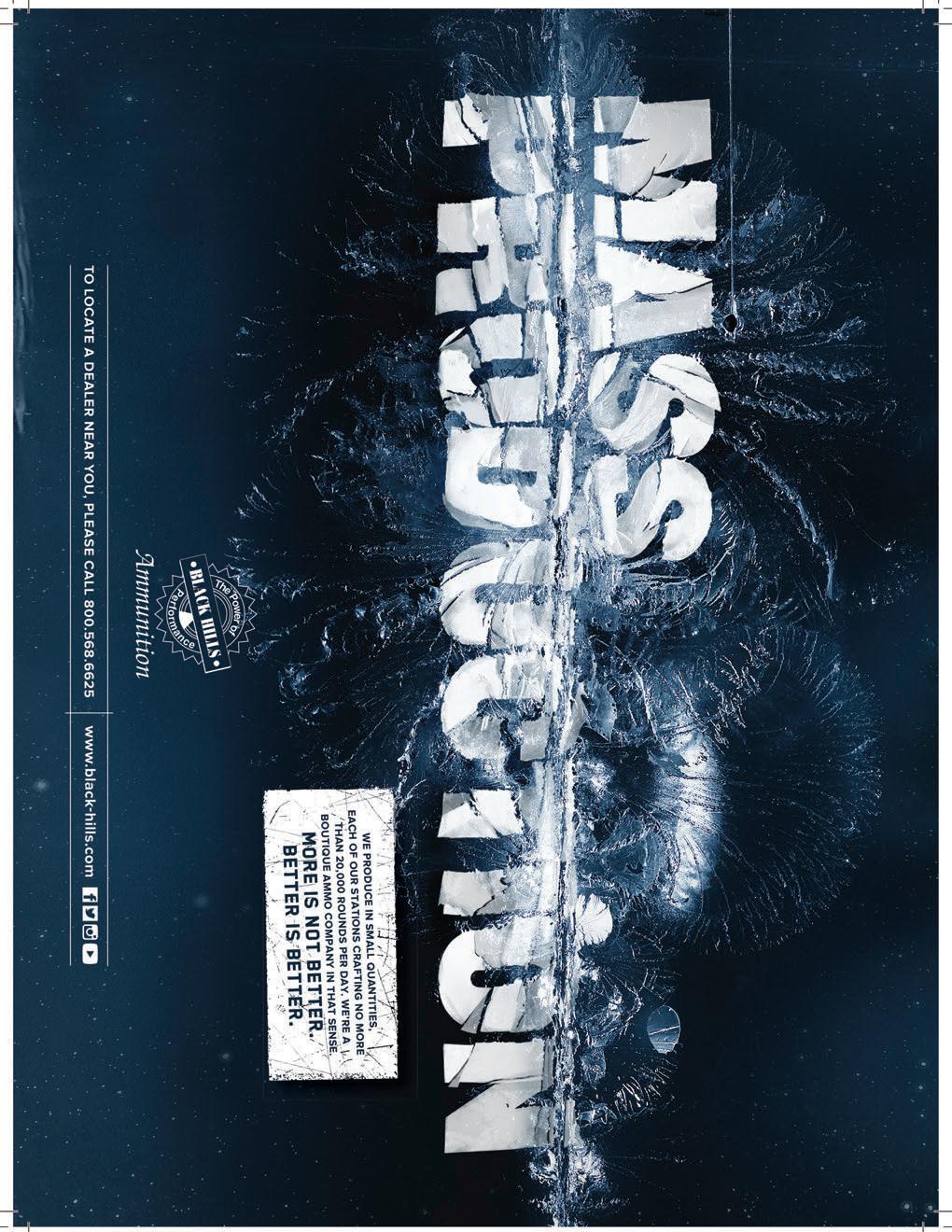






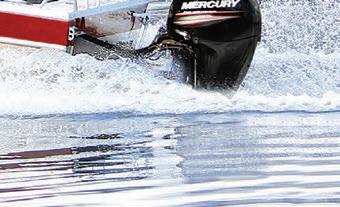





























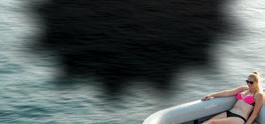























































Some of the year’s best bank and boat fisheries, and its tastiest rainbows, are on tap at select Eastern Washington lakes, plus a few west of the Cascades. Jeff Holmes shares his faves, other top prospects and best riggings.
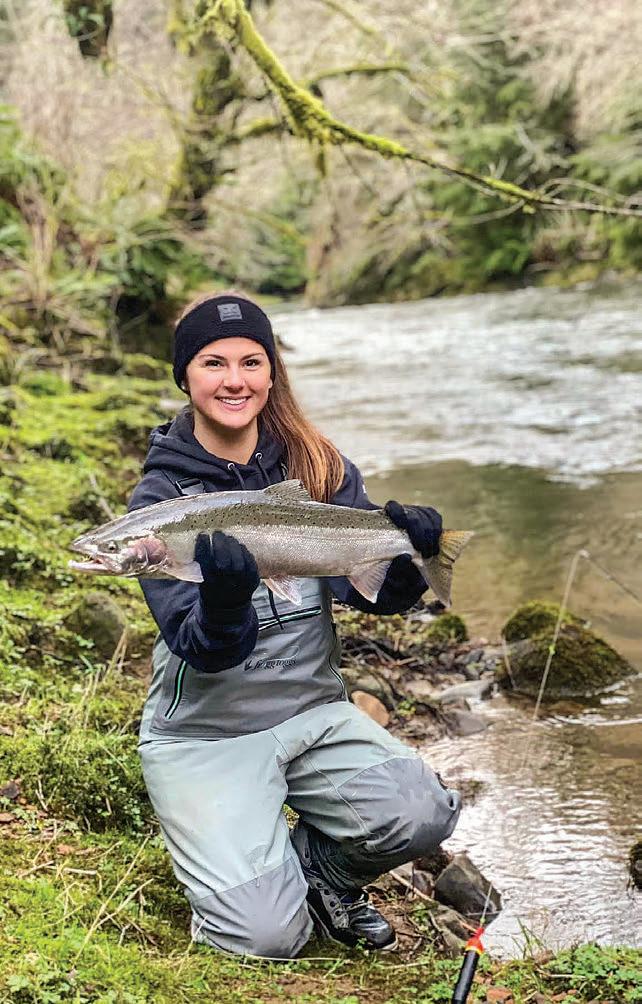
Underfished, highly abundant, easy to catch in winter, good fighters, tasty – what’s not to like about lake whitefish?! Mark Yuasa previews what might be the next big fishery in the Columbia Basin.
With improved ocean conditions and lots of species to fish for, the time is right to nail down a Vancouver Island expedition. Jeff Holmes has been around the block in this British Colum bia fishing paradise for years and offers up some of the best ports, charters and lodges to stay and fish out of.
111
Chukar prospects look pretty good across the eastern half of Oregon, particularly in Baker County. Troy Rodakowski laces up his boots and shares how and where to hunt redlegs. 119 LATESEASON

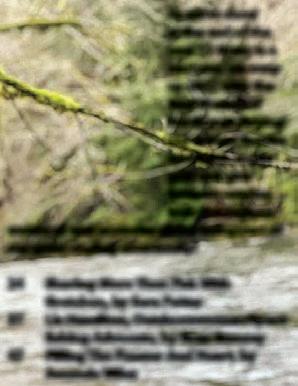
Bill Saunders, Worth Mathewson, Sean Mann and other duck and goose hunting experts – includ ing our very own MD Johnson on the Lower Columbia – offer up their best advice for bagging birds in the always tough-tohunt late season.


The end is never easy for dog lovers, especially those who’ve also hunted behind them. Randy knew his retriever Miley was declining fast and what had to be done, but he also wanted her to go out on a high note. He shares their final, poignant walk down and back up that lakeshore in search of ducks.


85 NORTHWEST PURSUITS December Steelhead: It’s Early, But At Least It’s A Start Compared to days gone by, it feels like December steelhead are as rare as unicorns. But there really are still winter-runs to be had beginning this month and continuing deep into winter. Jason previews the opportunities around Western Washington.
135 GUN DOG Christmas Gifts For Hunting Dogs (And Their Human Companions) All puppers are automatically on Santa’s nice list and deserve a present or two this holiday season. Scott Haugen shares field-tested ideas for gun dogs – as well as some for their two-legged companions!
145 ON TARGET If Santa Doesn’t Make It, Here’s The Next Best Thing! With gift-giving season upon us, Dave W. has a few ideas for what to put under the tree for the hunters and shooters in your life.
153 BECOMING A HUNTER Time To Recap Your First Season As A New Hunter If you tagged out in your first fall afield, congratulations! But if not, no worries, autumn and another chance will be here soon enough. In the meanwhile, Dave A. offers advice about how to use the off-season to better prepared for 2023’s hunt.
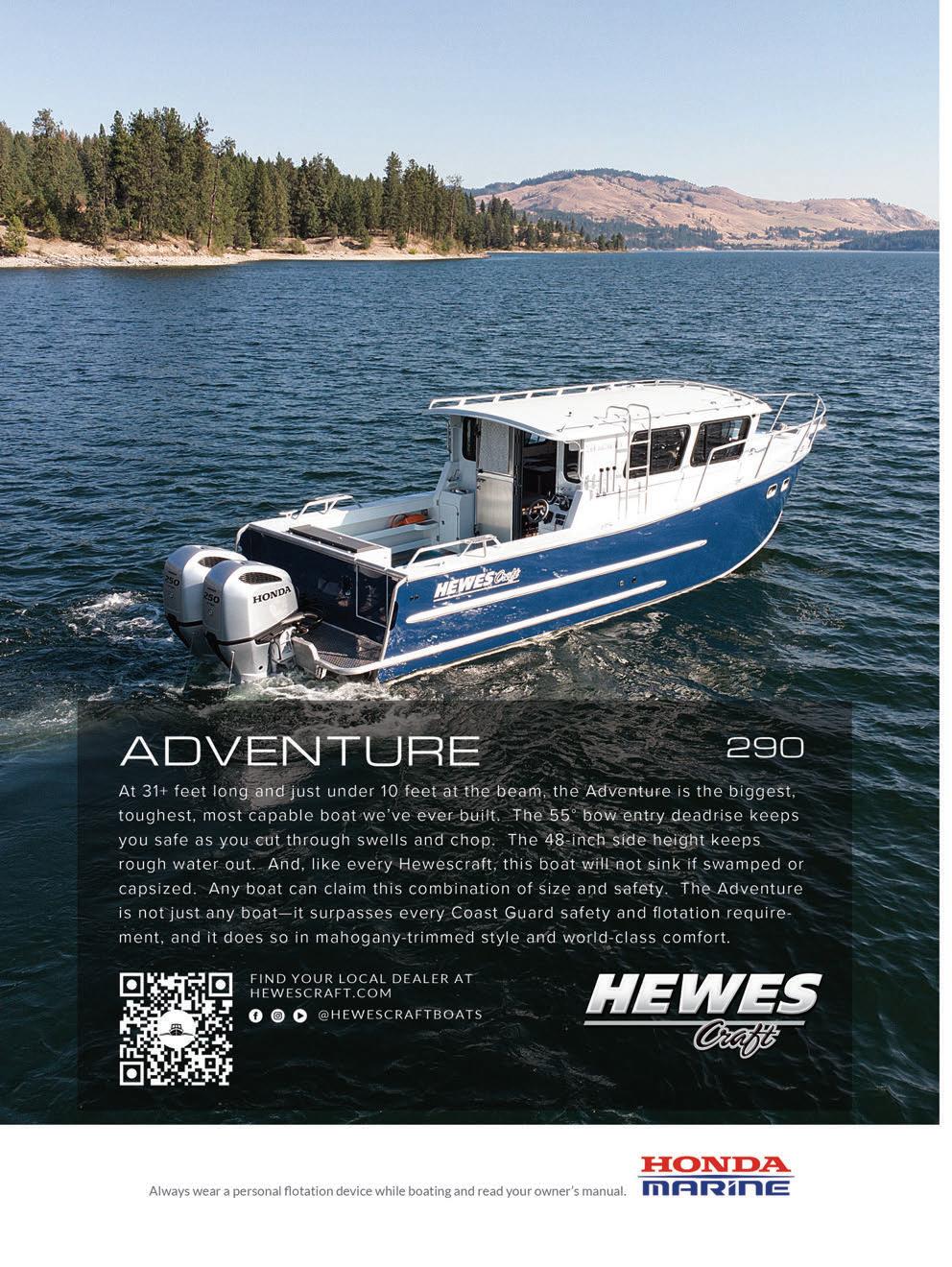



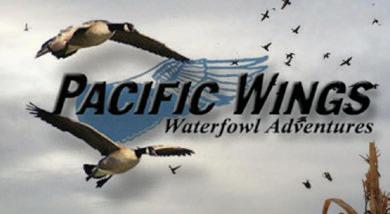
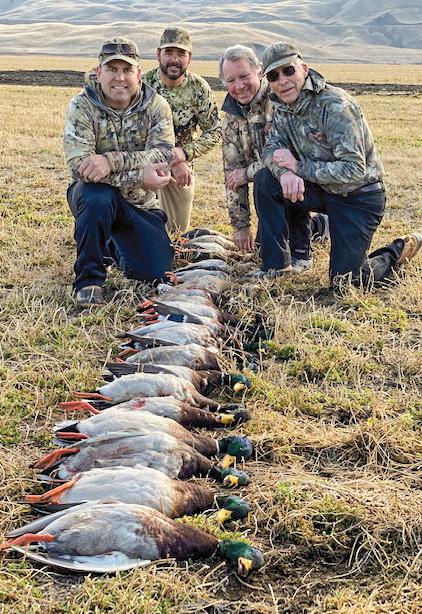
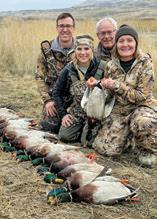
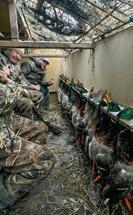
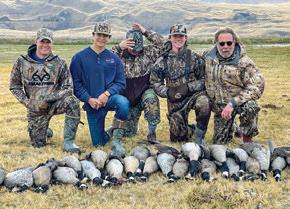










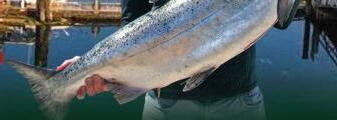
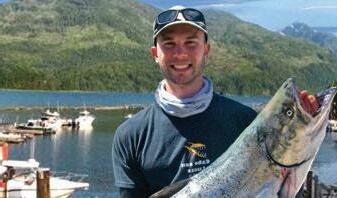

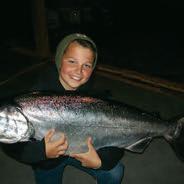
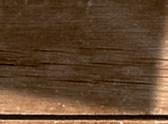





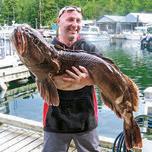

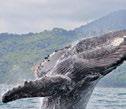





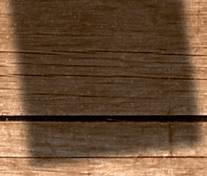










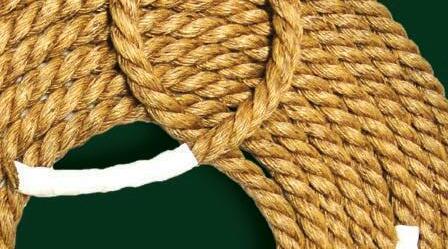
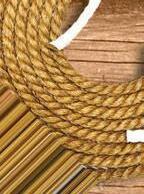
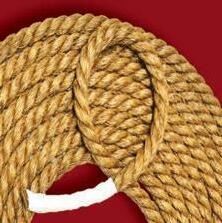














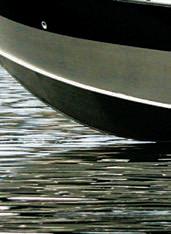
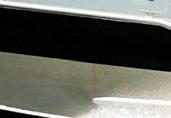
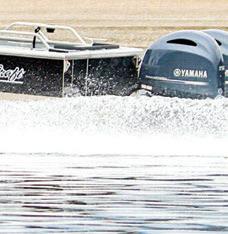


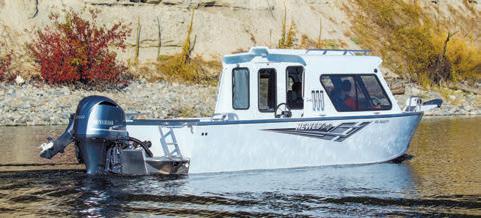







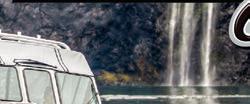
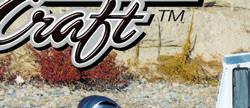








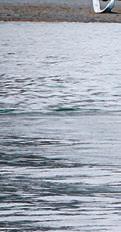
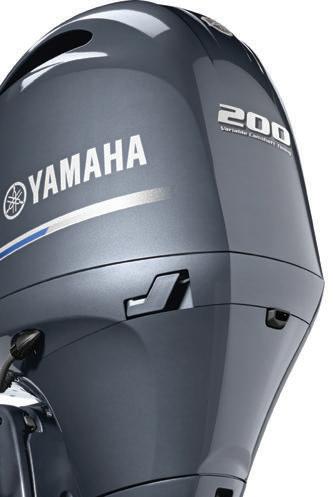










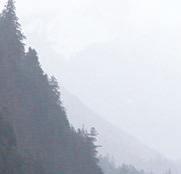
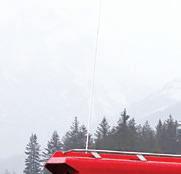
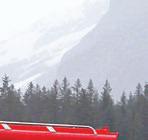
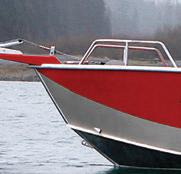





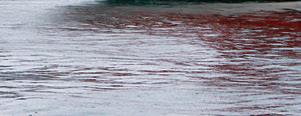

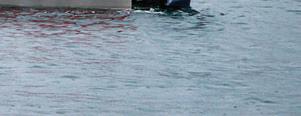











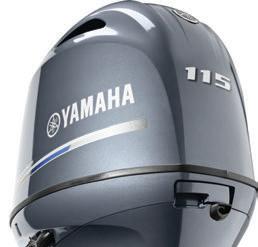

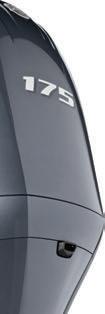



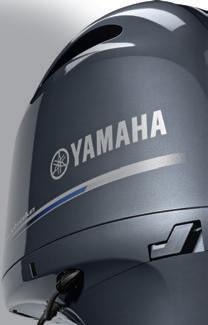



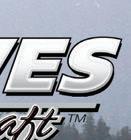

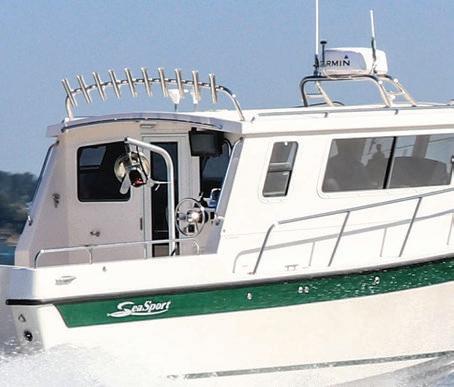

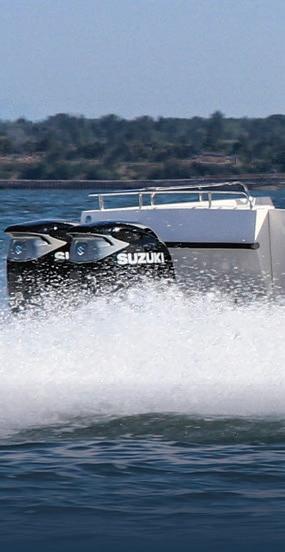
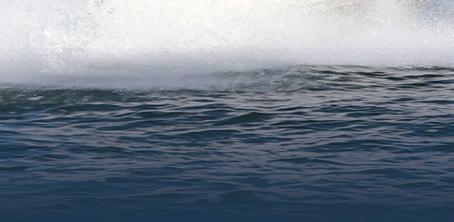

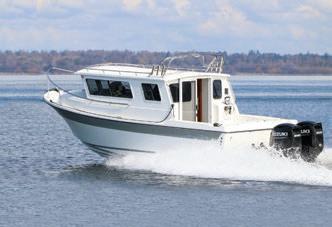


“Ithink harvesting animals during the reproductive period to me does not make sense. That’s an ethical issue.”
So said Tim Ragen, the first-year Washington Fish and Wildlife Commission member, last month as he made the motion to end the state’s special permit spring black bear hunt as we’ve known it. Four fellow members of the citizen panel, which oversees the Department of Fish and Wildlife and its policies and hires and fires its director, had their own reasons, of course, and in the end agency managers can still propose “management” bruin hunts for the commission to say no to. But Ragen’s words stood out to me.
How on earth, in the first place, was a guy like this appointed to a commission legislatively mandated to provide hunting and fishing opportunities? In vetting him, did anyone inquire about these sort of thoughts? Or was he brought on specifically because of them?
YOU KNOW, TIM, black bears don’t actually mate until late May, June and even July, and the spring season begins in early April, so where do you draw the line? For instance, ducks start to pair up this time of year though they won’t breed and nest till spring, so what do you think of winter waterfowling?
“I think harvesting animals during the reproductive period to me does not make sense. That’s an ethical issue.”
How about hunting bucks in the fall, a period that – from late October through November – overlaps the rut?
“I think harvesting animals during the reproductive period to me does not make sense. That’s an ethical issue.”
Bowhunting for elk in September, when the bulls are bugling?
“I think harvesting animals during the reproductive period to me does not make sense. That’s an ethical issue.”
I’m guessing luring in gobblers with seductive hen decoys and calls in spring is probably a no go with you too, amirite?
“I think harvesting animals during the reproductive period to me does not make sense. That’s an ethical issue.”
OH, HERE’S ONE: What are your thoughts on fishing for Chinook, coho and sockeye making their way to the spawning grounds?
“I think harvesting animals during the reproductive period to me does not make sense. That’s an ethical issue.”
Steelhead heading for the hatchery?


“I think harvesting animals during the reproductive period to me does not make sense. That’s an ethical issue.”

Targeting catfish congregating below Palouse Falls in spring or walleye gathering in the Columbia’s east gorge pools in late winter? Digging razor clams, which mostly spawn in late spring but can get it on any time of year including fall and winter?
“I think harvesting animals during the reproductive period ...”
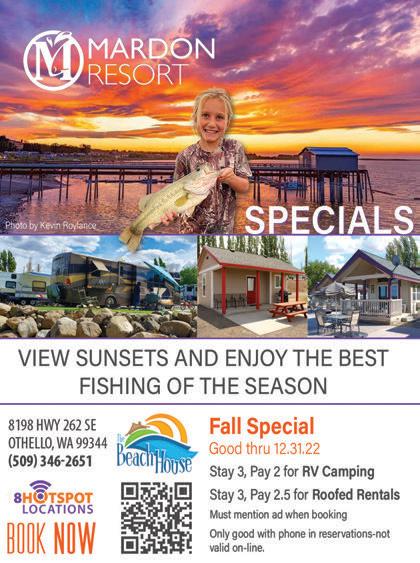
Enough said, Tim, the governor approves, you’re appointed!
BUCKLE UP, WASHINGTON sportsmen, with one new commissioner coming from the Governor’s Office in 2023 – and likely two – things may get rough as the traditions and heritage you’ve known meet the feelings and ethics of the powers that govern them. –Andy Walgamott
hen the stars align while pursuing the river and its fish, I have encountered the most amazing things nature has to offer. I realize, though, that it isn’t always about nature. Sometimes the stars align with a purpose far more important – perhaps for a person.
I never realized how truly comfortable I was on my river and its creeks until I met someone who actually wasn’t. This special person allowed me to grow by helping her embrace the river for all of her fluid magic. Gretchen had every reason to never step
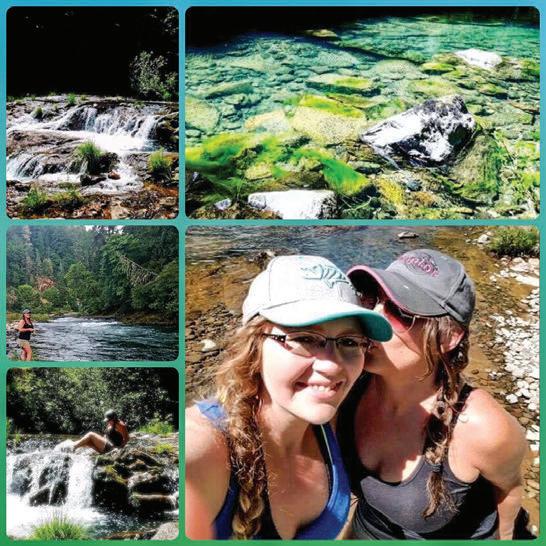
foot on the banks of a river again after the tragic loss of her boys’ father in a canoeing accident. Nurturing her boys after witnessing the worst-case scenario of their young lives was all that mattered to Gretchen in the months that followed. She was living for them and at the same time harboring the deepest of pain. As a mother and woman, I can’t even imagine bearing such a heavy chapter.
But I believe the Lord wanted Gretchen on the water, where she would discover the moments and places that only connecting with nature can provide. She felt intrigue and joy, all while believing she was closer to Shane, the boys’ father, when she reconnected with the water. I also believe the Lord wanted Gretchen to see
the river through my heart in order to heal in the ways she is intended to heal. She wasn’t meant to live in fear of something so special. She needed a woman she could trust not only to help overcome the trauma, but to listen. She needed someone who believed in her and her ability to pursue something that intrigued her.
How amazing it is to have a dream worth chasing! But even more amazing is to have someone who believes not only in your dream, but in you. In sharing the comfort and strength my most precious watershed naturally has given me, I wholeheartedly believe that this first trip to my forest helped Gretchen to heal.

IN ALL HONESTY I have read less than two handfuls of fishing articles ever. I know, that’s probably not good as a writer, but it’s the truth. I met Gretchen by fate. It was the first time I had ever fished with a group of ladies, or on the Columbia River. It was my first time on a sled boat, first time sitting on anchor, first time meeting guide David Johnson – all of which led to my first Columbia springer. I was nervous on multiple levels; not just socially, but the whole boat thing was far, far away from my comfort zone.
Gretchen and I shared a common bond of being in Northwest Sportsman’s December 2016 Real Women of the Northwest Fishing issue. When she talked of our articles and how much she enjoyed mine, she brought up only a little of the piece her friend Troy wrote about her, asking me if I had read it. In my life I am as honest as I can be, but in that moment I fibbed, saying, yes, I had, and something along the lines of it being awesome. I didn’t want her to think I was selfabsorbed, but honestly, I hadn’t read any of that issue’s other articles. To this day I wonder what my friend thinks of my response, as it was fake as all get-out. I had no idea the trauma she and her boys had been through, so of course I mentioned nothing of it.
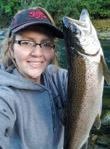

Regardless of my lame response, we bonded the day we met and despite my little white lie, we were destined to become more than Facebook friends. We would become real friends. I honestly believe now that at the time I wasn’t meant to know what she had been through; had I known, I believe I may not have dived all-in sharing my watershed with her like I did.
Seeing each other a couple months later on, on another one of David’s “Fish like a Girl Adventures,” led to a weekend full of the best of things an adventure can bring. New beginnings, massive laughter and creatures like I had never encountered. That wild weekend would end with me extending an invitation to Gretchen. I wanted her to come camping with me in my big backyard. I wanted her to embrace the water without a guide, or a man of any sort. I knew we would have a blast, and so we set a date just a few weeks out.
SUMMER STEELHEAD ARE my favorite fish of all and in my personal life I have shared them with very few people. I grew so much in pursuing them; they lit my fire like no other creature on Earth! I literally was in love with them and their cycle. The river and creeks that house them during their

lifecycle intrigued me and were my new reason to spend as much of my time as possible on the water. They consumed my time and my heart; being so possessive, I suppose I wanted them all to myself and so I shared them only with my babes and the men who fished the river’s banks. I definitely met some incredible people, but I preferred to get there first, needing to claim my spot, and if it ended up that I was only one there, even better.
So to feel the desire to invite my beautiful new friend to share in something I hold so dear was a pretty major step for me. It was fate that Gretchen and I would embark upon this adventure in my big backyard, just as it was fate that I would learn her story firsthand, not from an article. Just the two of us up in my luscious forest. I love that I got to share that creek and that camp with her, as no part of that forest remains after September 2020’s Archie Creek Fire, aside from the creek and its fish. The forest burned so hot up Rock Creek that it is now almost completely unrecognizable, even to me. I didn’t know I would lose such a place when I decided to emerge from the steelhead hermit shell I had been living in, but I am so happy I was able to share it with Gretchen when I did.
We set up camp on the creek closest to my fishing hole, but spent the afternoon up the creek that literally holds the key to my heart. These cold streams are
Gretchen and Sara held hands as they faced the rapids on their float with Jones. “... (In) that day I saw her overcome things that, God willing, a lot of us will never have to face.” (SARA POTTER)
special not only because they are beyond refreshing and stunningly beautiful, but because they house wild summer-runs. I led the way to my private little swimming spot, we had ourselves a picnic and a couple cold beers, and we were set.
The heat had the rocks feeling warm and the beer tasting good. The country girl in me wanted to connect with my creek, of course, and so I asked Gretchen if she wanted to dive in with me. She was sweet but denied my invitation. Not questioning why not, I said OK and jumped off the rock we were suntanning on. That total refreshment is second to none on a hot summer day after a couple beers. I swam for a minute but quickly rejoined my friend, as it only takes a minute for your core to cool in that water. Loving the way the water felt, I encouraged Gretchen to test the waters.
That encouragement had her dealing with fear inside her head and her heart that I had no clue about. However, in that vulnerable state it led to a deep heartwrenching and eventually heart-warming conversation. My heart sank faster than a rock to the bottom of the river when she shared what had happened. I truly believe Gretchen never really had anybody listen to her, even though I know she had shared this painful piece of her life with others. Maybe she could feel my heart and that my care was genuine. I didn’t get the edited version. I got the raw, vulnerable truth, the kind that

is sometimes hard to face, let alone tell.

The words we shared on the warmth of my rocks never left me and despite expressing such loss and sadness, once we were done, Gretchen wanted to swim, and so we did. Staying close to her I watched the fear in her big brown eyes melt away into a smile. We swam and explored a nice stretch of the creek. She was having fun, laughing big in the rapids and little waterfalls. I believe a necessary part of her healing took place up the creek that day.
We fished hard and I was proud to show her what it is I love. That very stretch of the river means a whole lot to me, as does my technique of fishing. Gretchen got to see and feel firsthand the snags and the rigging and rerigging, the tugs and action-packed adrenaline of fighting a summer steelhead on that wild stretch of water. Though we didn’t land that fish, she did see one caught across the river – and bless my buddy Brian’s heart, he came across to say hello before heading home. And so Gretchen got to see a fresh and beautiful harvest up close.
We had fun. That was all the mattered. I mean, she may have been after a summer steelhead, but I think what she walked away with from that campout was a belief in herself that was more than she had had in some time. I watched her continue to believe in herself and excel over the next few years. As she helped others while pursuing what it is she loves, I was super proud to see her share the passion. And even more proud to see her believing in herself.
DESPITE ALL THE amazing things I saw in Gretchen and through her, I saw steelhead still hadn’t found their way to her. I wanted her to know what the big deal was! You really have to feel it and live it to know. I wanted her to know steelhead, and what it is to fight these fish in the river. Whether winters or summers, these fish are special and truly captivating.
Stars aligning once more, I somewhat randomly invited Gretchen to join me on the river for a late winter drift with my good friend Ted Jones. Nearly five years had passed since we swam up the creek, but
It wasn’t the biggest winter-run and it was already spawned out, but the steelhead also marked the start of some pretty good fishing for Gretchen and Sara that trip. They would go on to catch more than a half-dozen upriver-bound steelhead. (SARA POTTER)

finally we were going to fish my river once more. Despite Covid and the craziness that it was, she made it to my little house and we had two days of fishing ahead of us.
Day one was victorious in a lot of ways, but also simply because Gretchen got to experience how truly intimate and peaceful side-drifting for winter fish is. It’s not big sled boats with massive rigging dragging behind. No, it’s tiny bits of precision not only in your lure, but in where you cast your lure. She learned so much on day one and landed herself a nice little wild winter buck. The champion in Ted was not too impressed with the one bite we had found and so he offered us an ocean trip for day two. Me, I will choose the river always, so I lobbied for giving the river another go. Gretchen was learning and you just never know when it comes to
flowing water and fish. I also wanted to hit the river one more time before I called it a season on winter-runs. My pep talk must have worked because we would meet before daylight for one final drift.
I HAD A good feeling when we woke that late March morning. The river had dropped a bit and the weather was welcoming the spring that was upon us. There’s just something about hitting the water before daybreak that I love. I love to listen in the darkness as nature transitions from night to day; I try to anticipate what the day might bring.
With fog still holding tightly to the river we soon were on our way. It amazes me how just the tiniest of things can change and the demeanor of the fish can be totally different. Our casting was where it needed

to be for Ted to do his thing and just like that, there it was! Gretchen listened well and executed on her hookset like a stud. It wasn’t too wild of a fight, as the little steelhead was a downriver fish, but it was actually the perfect first one of the day for her. I loved showing my friend how we handle them with care, making the moment quite special and tranquil. The key is to join the fish. Being thigh-high in a winter’s river isn’t for everyone, but it is for me. And so how perfect was it that the Lord brought us together for Gretchen to experience what it is to embrace her fears of the river, all while embracing wild winter steelhead?







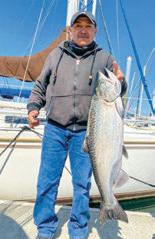



We were jacked after the first release and Gretchen asked me if that was about the size steelhead are. I smiled and didn’t want to hurt her feelings, but I was honest and told her it was quite tiny and it had already spawned. But I added that getting



a bite out of the first slot was a great sign and hopefully we would find more.
The beautiful thing is, we did find more! It was one of the best days of my life. I got to be with Gretchen as she faced fear through exciting new things that led to unforgettable moments, and I love that. She held my hand tightly as Ted rowed us through the rapids of our massive river. It was just us and in that day I saw her overcome things that, God willing, a lot of us will never have to face.
We may have started the day off with a downriver fish, but we surely didn’t end it that way. The water that had yielded just a lone bite the day before served up seven or eight this day. They were big, bright beautiful upriver fish, including a massive buck whose tail was too thick to grasp. It was incredible and chaotic and we got our fill of wild winter tugs, all while making Ted proud.
FROM ONE DAY to the next you just never know, and it shows you that we should never give up, nor should we let fear of failure keep us from living. In fishing and life, sometimes
what we believe we are searching for isn’t what we find. That doesn’t mean we won’t eventually find it; it just means we must trust in our journey. We have to take life one step at a time and know there is good in this sometimes sad life. Even in our darkest days we must never stop looking for the light on the horizon. Trusting in timing isn’t always easy, but life proves it to be crucial. Sadly, we all will leave this life on Earth one day, but I believe it would be even more tragic if we just existed when we are blessed enough to truly live it.
The greatest gifts I have ever been able to give in this life are not ones that are wrapped in silk ribbons. Rather, they come from my heart. And the greatest gift I can receive comes in knowing I have made a difference in someone’s life – hopefully the kind of difference that allows them to go make a difference as well. I feel things deeply, possess passions galore, and sharing it all with people like Gretchen helps me believe there is worth in believing. My heart is on the river and I couldn’t change it, even if I tried. NS
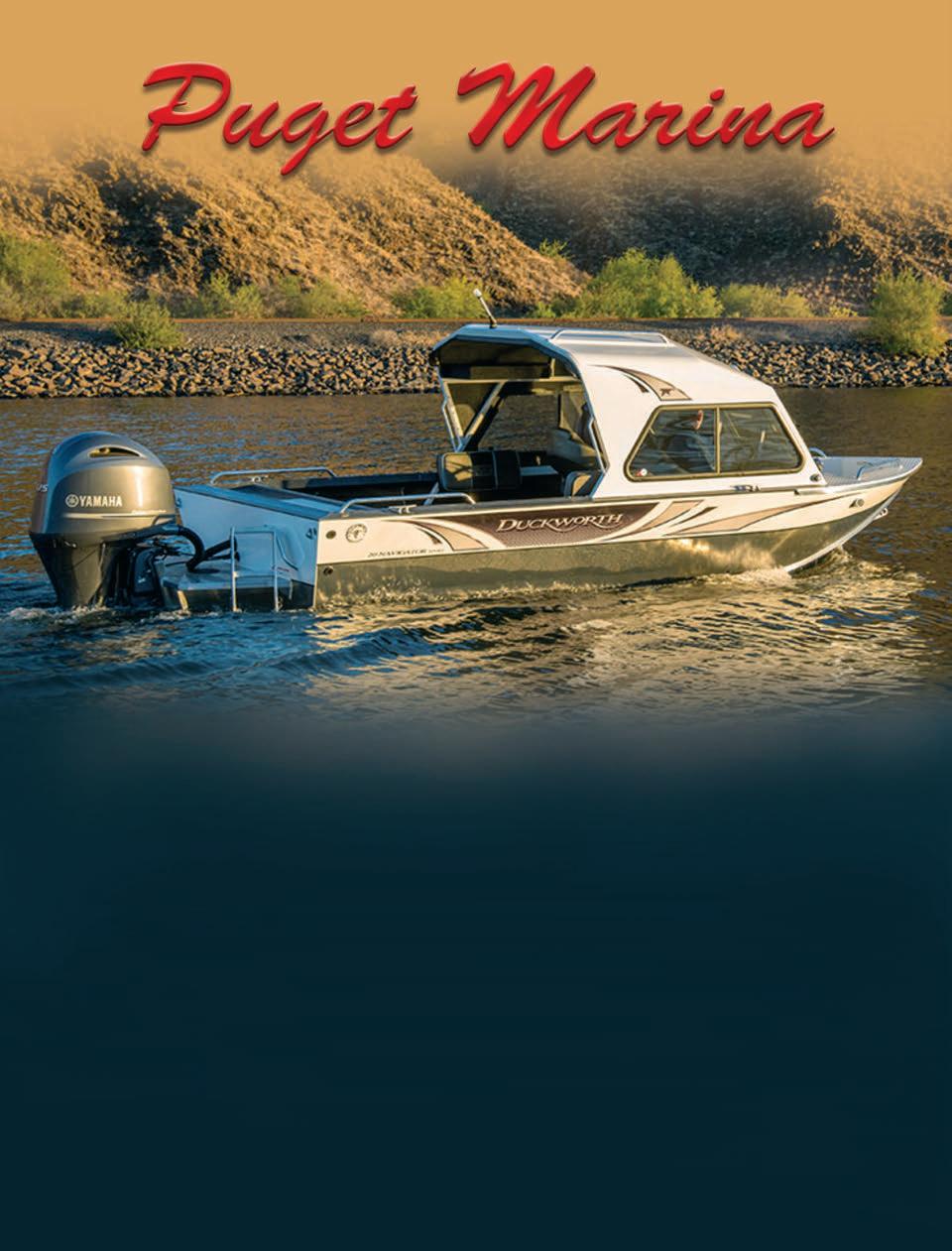
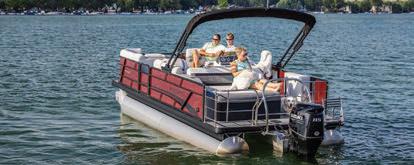
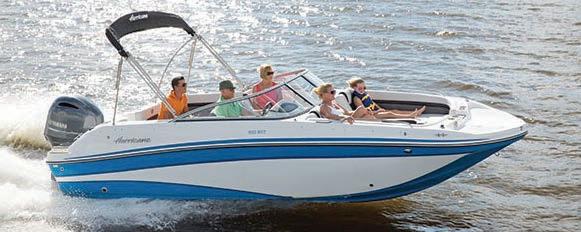
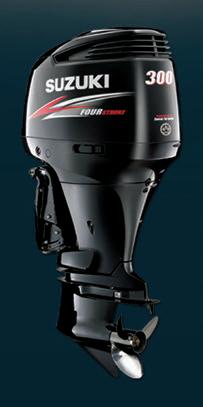




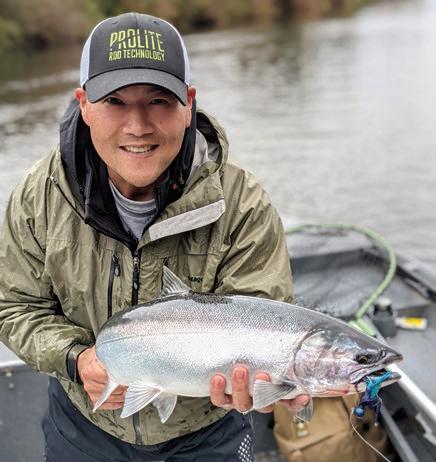


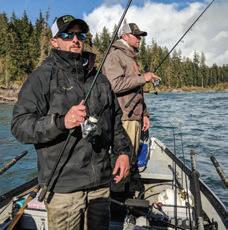


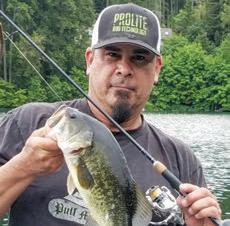
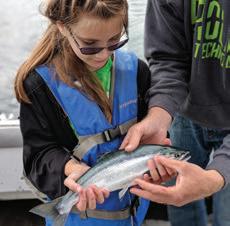
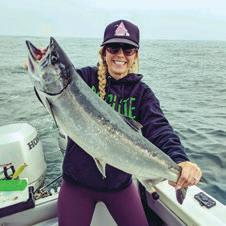
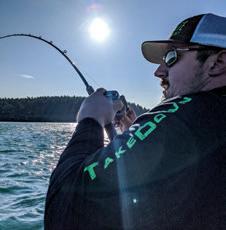

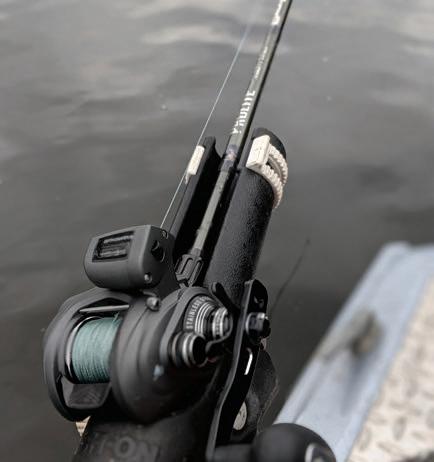
Northeast



(COAST FISHING

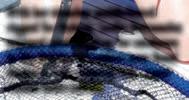
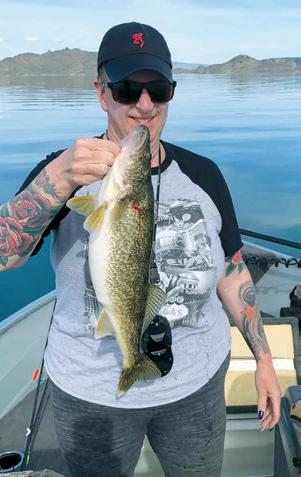
The waters on either side of Buoy 10 are Jamie McLeod’s second home – the Pacific for salmon and the Columbia estuary for sturgeon. (COAST FISHING PHOTO CONTEST)

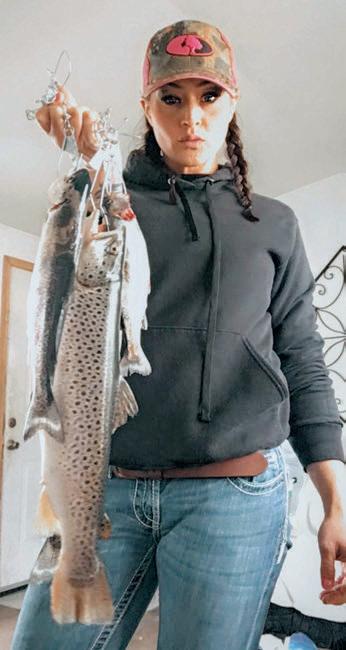
With her standup paddleboard rigged for fishing, Leslie Hernandez enjoyed good angling for rainbows in the Newberry Caldera near Bend during a June camping trip. (COAST FISHING PHOTO CONTEST)
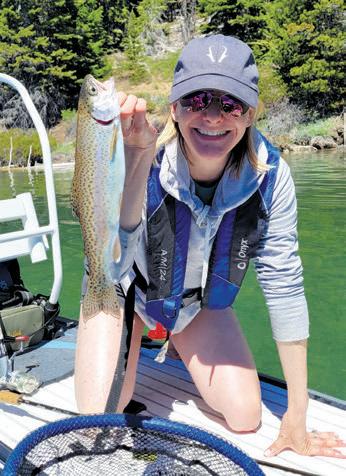

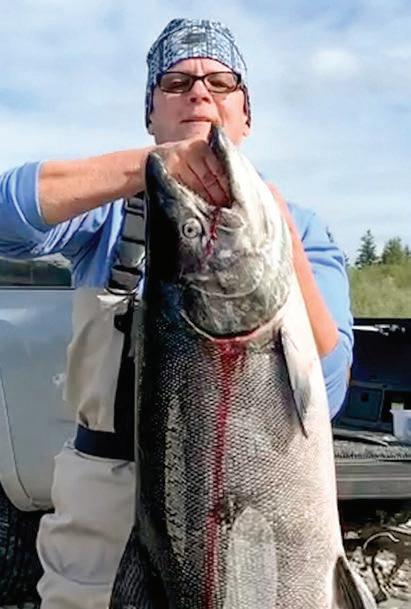










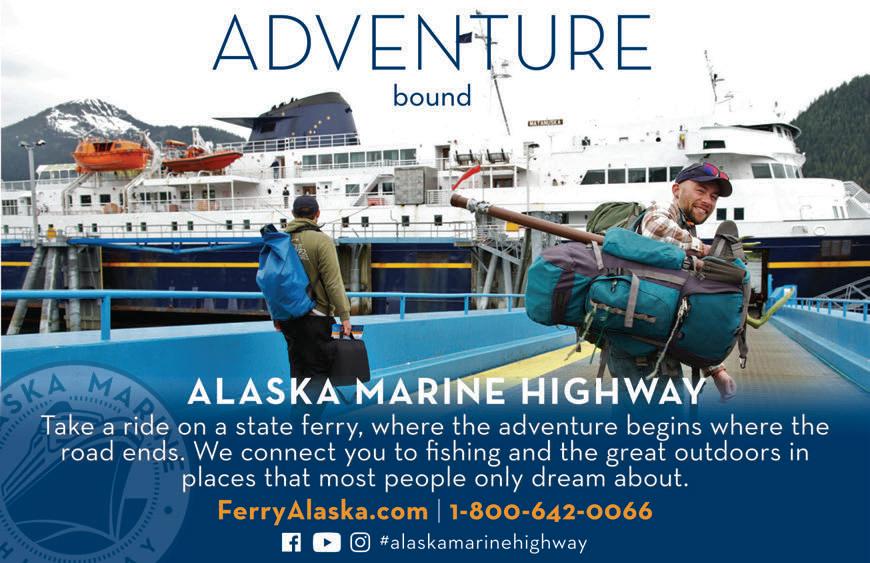
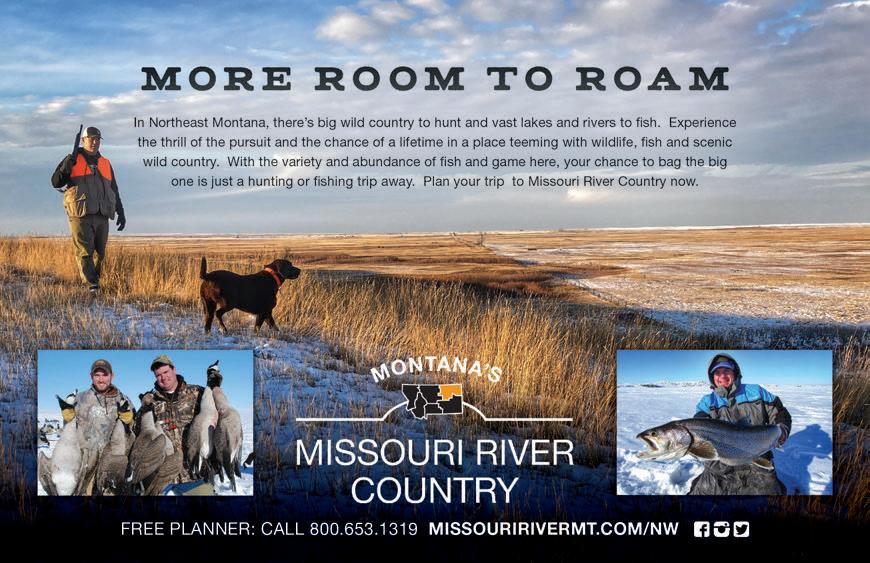


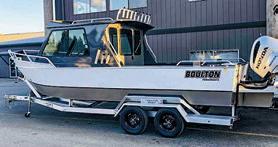


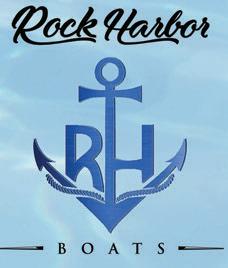




Liz Hamilton is first and foremost in love with the outdoor harvest experience of fishing and –perhaps surprising to some – hunting, along with collecting other edible bounty available from the Northwest’s natural world. It all started for her as a young girl fishing for trout with her father. She remembers other fishing experiences while away at summer camp and of writing letters to her mother about the fish she caught – not something most girls did or do.
Living in Oregon City during her early adult years, Liz became aware of the opportunity to catch spring Chinook from the Willamette River. To Liz, the idea of catching fish bigger than trout seemed almost too good to be true. As a young woman without a boat or tutor, Liz prowled the banks of the Willamette in the Oregon City area, where she would often cast and retrieve spinners in the waters downstream from the falls.
Although it took weeks of trying, she finally hooked a couple of salmon but lost them, as she was unaware that a strong hookset demanded that she keep her thumb on the spool of her baitcasting reel when she reefed back. Advice from another bank angler on the importance of hooksets enabled Liz to land her first spring Chinook, which turned out to be
There may be no better representative of our longstanding Real Women of Northwest Fishing feature than Liz Hamilton. A hardcore angler – here she is with her biggest Chinook to date, a Buoy 10 fall king that bottomed out a 50-pound scale, and husband Art –she also has worked tirelessly for decades advocating for the fish and fisheries Northwesterners highly value. (LIZ HAMILTON)

a 25-pound fish – not bad for a young woman learning the ropes on her own.

CATCHING THAT SPRINGER was lifechanging for Liz, as she soon found herself chasing salmon and steelhead at every opportunity. She marveled at the life history of anadromous fish. She became addicted to the sport and as such, obsessed with catching salmon and steelhead as any young, passionate person can be. She yearned to catch steelhead and other types of salmon like coho, summer and fall Chinook, sockeye and chum, and she did.
Liz’s first fall Chinook was a 42-pounder that she caught in the tidewater section of Oregon’s Salmon River. Her first coho came on the North Fork Nehalem downstream from the hatchery located there. Because it was close to home, the Clackamas was the river she focused on for steelhead, landing 75 fish the first year she perfected her methods and combined them with her earned on-the-water knowledge of when to be where based on water conditions.

It was in 1995 that she bought her first boat, a 15-foot Smoker Craft equipped with a 15-horsepower outboard.
Her most memorable fishing trip was for spring Chinook in Tillamook Bay when, while fishing from her boat with her husband, daughter and future son-in-law, they caught five spring Chinook and a load of Dungeness crab. The bounty of this haul was almost overwhelming for Liz and she still grins with glee when talking about it.
When I asked about her biggest salmon, Liz shared her story about catching one over 50 pounds while trolling the Columbia estuary near Astoria. The Buoy 10 salmon was so big, she could hardly lift it and still doesn’t know exactly how much it weighed, as it bottomed out the 50-pound scale she had borrowed from fishing guide Eric Linde.
SINCE THEN, HER fishing adventures have branched out to include bass and other fish species. She and husband Art have drifted the John Day River for smallmouth many times.

When I interviewed Liz for this article she and Art were just leaving to hunt deer for several days in Oregon’s Cascade Mountains. I knew she hunted deer and elk most years but I had never asked about her experiences. She shared with me the story about her first buck, which she harvested while on a drift boat trip down the lower Rogue River. The rifle she uses is a mild-
recoil Tica in .308. Her hunting is usually a combo trip, as she likes to find mushrooms, huckleberries and truffles too while afield.
Her first elk, a cow, came from Douglas County’s Tioga Unit.
“I will never forget cutting up my first elk and putting all that healthy, sustainable, antibiotic-free meat in the freezer. It’s such a feeling of accomplishment to hunt and harvest your own meat instead of buying it from a grocery store,” Liz shared.
What advice does she have for women and girls wanting to get involved in fishing or hunting?
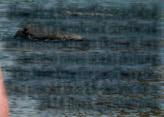
“I know only too well that fishing and hunting can be pretty intimidating for someone who hasn’t done it before, especially a female. But women who have the desire to participate can up their learning curve by meeting and talking to anglers and hunters they meet at various events such as sport shows, joining or attending a local fishing and hunting club meeting, attending how-to seminars put on by fish and wildlife agencies, or following groups like Becoming an Outdoor Woman. Think about starting with shellfish harvesting or crabbing,” Liz suggests.
“Of course, hunting requires participants to pass a hunter safety class, which is also a place where women can meet others with similar interests. Not to be overlooked is the






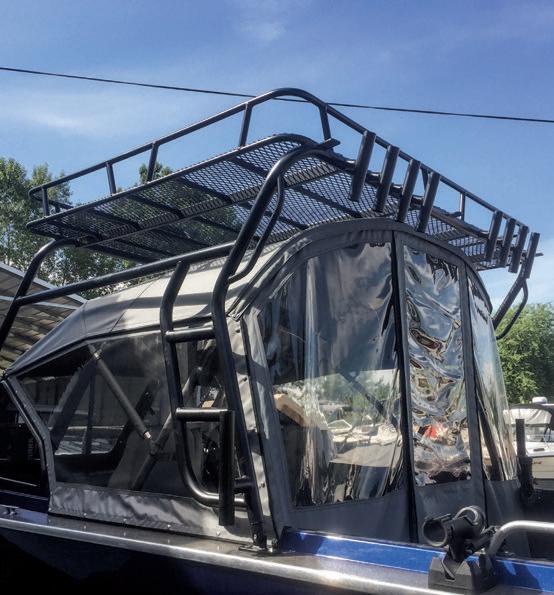
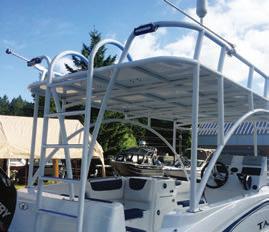
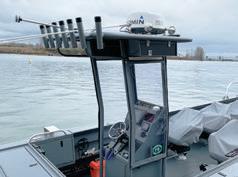
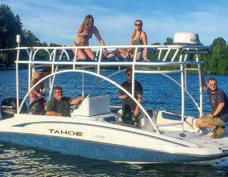








fishing and hunting information available on the websites of state fish and wildlife agencies. A good place to get a feel for the different outdoor opportunities and the seasonality might be to subscribing to publication like Northwest Sportsman or other magazines,” Liz adds.
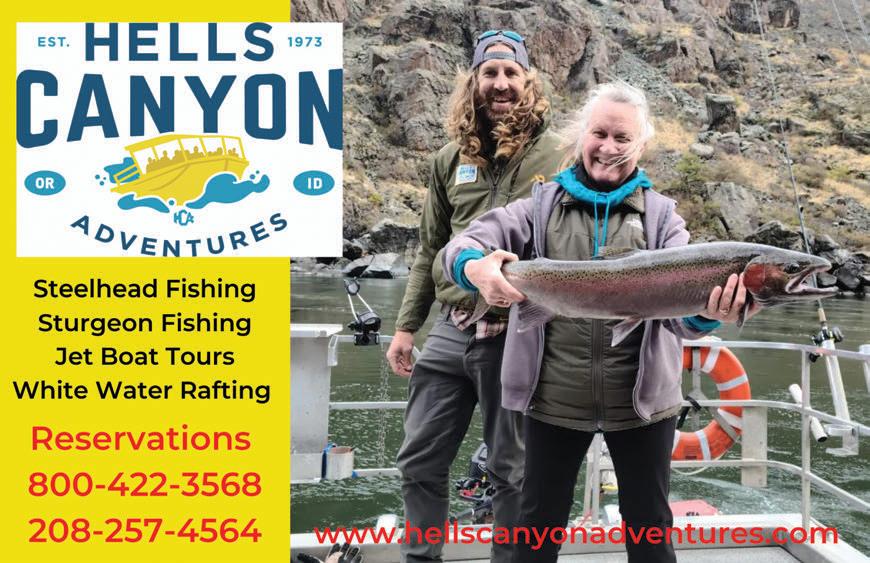
IN HER PROFESSIONAL life, Liz is the executive director and one of the founders of the Northwest Sportfishing Industry Association and is coming up on her 30year anniversary in that role.
NSIA is dedicated to the preservation, restoration and enhancement of sport fisheries and the businesses dependent upon them. As such, the organization has 12 board members that represent the views of the industry and share a keen understanding of the need to weigh in on local, state, regional and federal government policies.
In addition, NSIA has a science and
policy wing that advises the players within the organization, including Liz, in regard to the science and long-term impact of various threats and the ultimate positions the organization takes on different issues.
In her role, Liz manages a small office staff and a lobbyist in both Salem and Olympia. It’s the lobbyist’s job to monitor what is going on in the legislature, influence policy that benefits sportfishing and advise Liz and the board of possible threats. Being a board member, I can tell you that Liz’s role is not a 9-to-5 job, but instead one that often involves long hours and weekend work. But she’s driven by her strong passion to protect the habitats fish depend on for survival. As such, NSIA fights for both hatchery and wild fish. Currently she is working to secure an $800 million hatchery maintenance budget.
As a 45-year veteran of the fishing tackle industry and NSIA board member, I can tell you that NSIA’s political advantage often amounts to the fact that it represents jobs in the eyes of state and federal legislators, thanks to the many businesses
Besides fishing and rearing sheep, Hamilton also enjoys hunting – here she is in 2020 with her biggest blacktail yet – and foraging for berries and mushrooms in the woods and hills of Western Oregon.
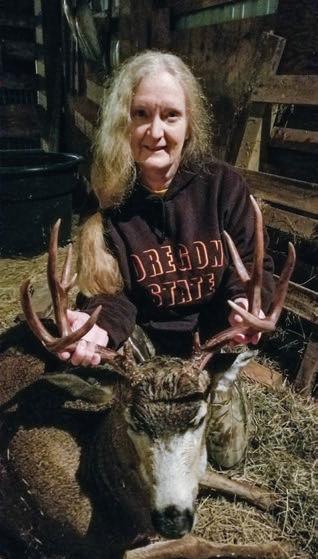 (LIZ HAMILTON)
(LIZ HAMILTON)


and jobs the organization represents.

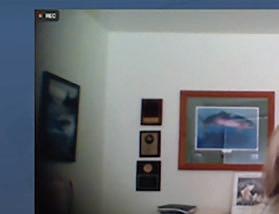
Eschewing Facebook and other internet platforms, she prefers to work face to face and bend ears. In order to enlighten political leaders and agency heads to our sport and the economic importance of fisheries, Liz has arranged fishing trips for governors, lieutenant governors and politicians like Norm Dicks, Peter DeFazio, David Wu, state senators in both Oregon and Washington, National Marine Fisheries Service directors, key staffers for elected officials, Fish and Wildlife Commission
chairs – pretty much anyone she can educate on the cultural, environmental and economic benefits of sportfishing. Her favorite PR trip was with Oregon state Senator Fred Girod and his wife Lori. “They both love to fish and were a joy to be with,” Liz shares.
AS YOU MAY know, fish hatcheries have been under attack in recent decades and NSIA has worked tirelessly in support of hatcheries and increases in hatchery production while working to deliver
essential safeguards for wild fish. One big win on the Columbia River is that funding for Mitchell Act hatcheries has been increased by $1 million for 2022, thanks in part to Liz’s efforts working both sides of the political spectrum. Last year, Liz worked to secure $400 million in federal hatchery funding in Washington.
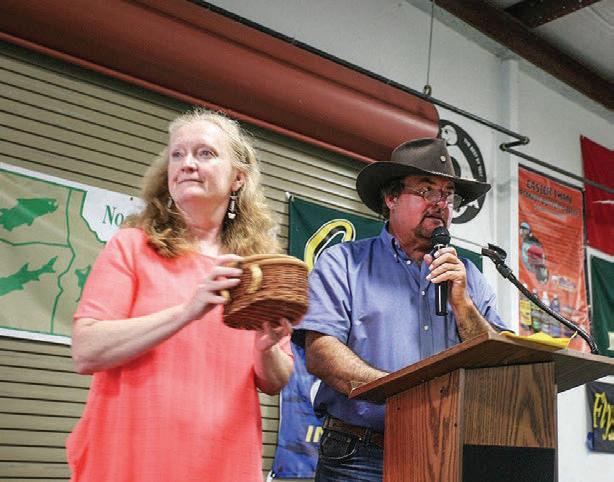

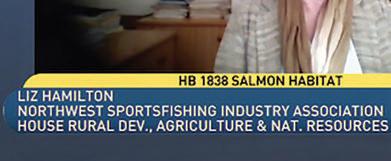

In case you don’t know, the Mitchell Act was authorized by Congress in 1938 to provide funds for hatchery programs and fish passage facilities to mitigate for declining salmon populations due to irrigation diversions, water pollution, logging and hydropower development in the Columbia River Basin. However, the funding and whether it will keep up with inflation is up for debate and must be approved by Congress each and every year. Often unseen and therefore underappreciated is the time Liz puts in influencing this and other federal issues affecting salmon.
Thanks to Liz’s energy, dedication and support from her board, NSIA has been able to tackle some giant goals on behalf of salmon, like reducing the impact marine mammals have on the fish, reducing the commercial share of salmon to the benefit of sport anglers, and opening up access to habitats blocked by dams.

To me and many of her admirers, Liz is the most consequential single person in sportfishing advocacy over the past several decades. No other single person has done more, logged more successes or been on the front lines longer than Liz.She has been involved in every major fisheries decision in Northwest salmon and steelhead over the past 30 years.She is regularly contacted by state and federal officials to weigh in on developments and changes to fisheries management, including the Office of the President and several state governors.
I can think of no better person to be represented on these pages than Northwest outdoorswoman and fish and sportfishing advocate Liz Hamilton. NS
Editor’s note: Buzz Ramsey is regarded as a trout, steelhead and salmon sport fishing authority and proficient lure and fishing rod designer. He has been honored into the Hall of Fame for the Association of Northwest Steelheaders and the national Fresh Water Fishing Hall of Fame.


Isabella Meade knows where some of the best crappie fishing in Washington can be found –Cowlitz County’s Silver Lake. She had a good day fishing the east end’s canals with her grandpa, Bill Meade. (COAST FISHING PHOTO CONTEST)







Jo Jewett’s hooksets make her father proud, but she wasn’t about to hand off her personal-best rainbow to him, as a passing boater at Burke Lake suggested she do back in early spring. “If looks could kill, the fella in that boat who said that would be dust,” says Jo’s pa, Brandon Jewett. She enjoys fishing throughout Central Washington and this spring went on a turkey hunt with her dad.

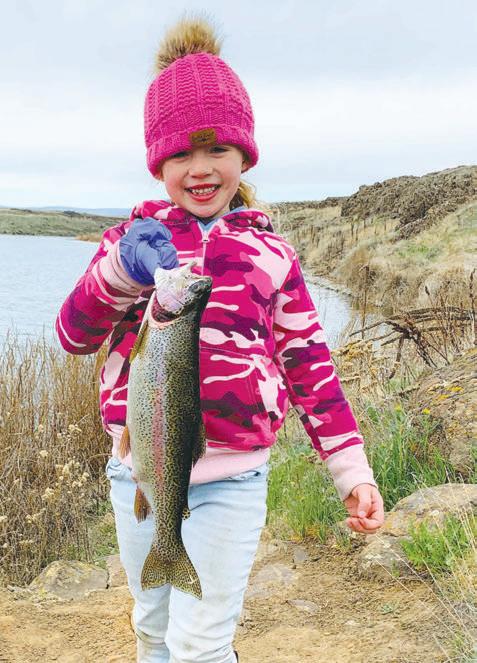
(COAST FISHING PHOTO CONTEST)
The triploids were biting exceptionally well for Shawna Boyd and nieces Charleigh and Piper Bailey when they made an annual trip to Twin Lakes, in Northeast Washington, with the girls’ mom, Tara Bailey, this past spring. (COAST FISHING PHOTO CONTEST)
When Annika Raleigh and fam visit relatives in Tri-Cities, you can be sure fishing the mighty Mid-Columbia will be involved! A mid-August trip with uncle Jerry Han saw Annika hook her first sturgeon and biggest fish yet, this roughly 5-footer. (COAST FISHING PHOTO CONTEST)






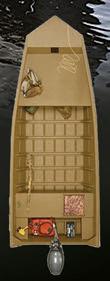
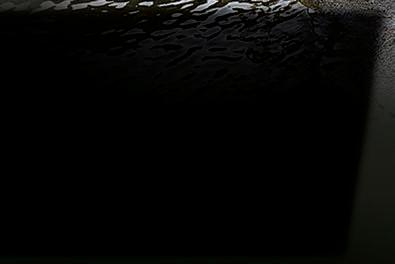
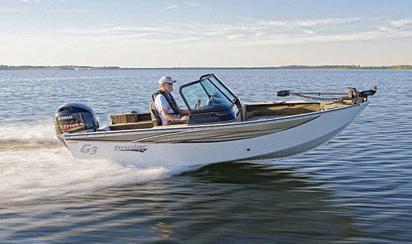
This year there was no shortage of fish or good times among my friends and I. The goal: to fill the freezer as much as possible.
Most of my fishing trips take place in the summer months, so I kicked off my season with a group of girls out of Westport.
We headed offshore with Tyler Jackson with Jackson Outdoors on one of the calmest days on the ocean I have ever experienced. The girls put the work on some quality coho and kings. It was a
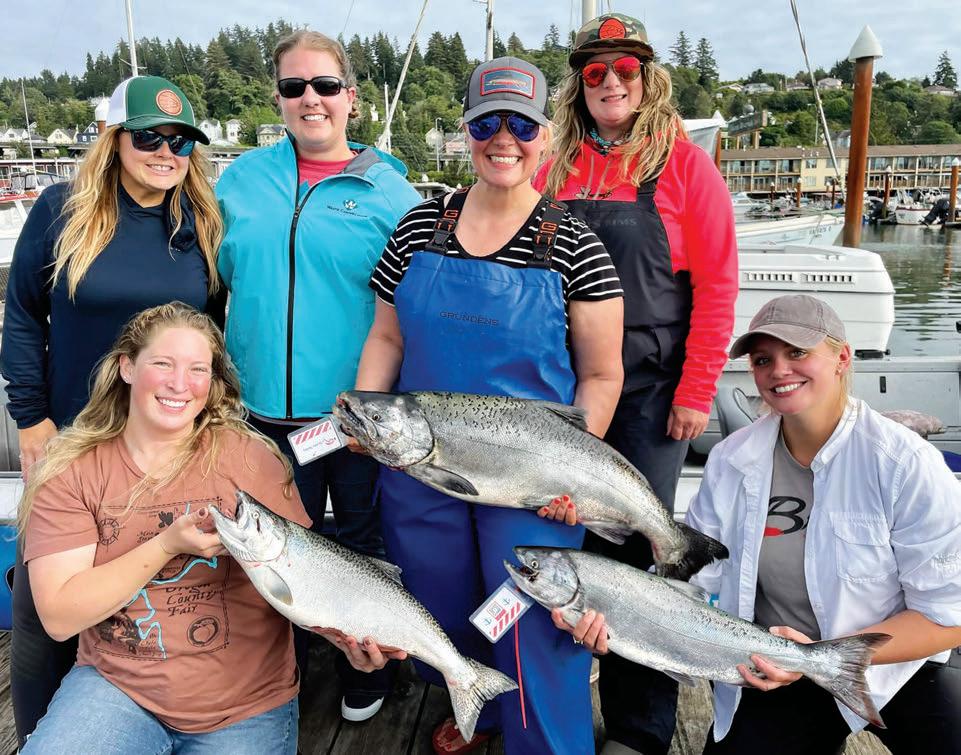
successful trip for us and a great start to the season for myself.
From there it was time for Buoy 10. Although this fishery is not for everyone, it is one of my favorites based on the potential salmon action to be had and the gathering of many fishermen and -woman from the angling community. I look forward to this time every year.
This was my sixth year competing in the Lipstick Salmon Slayers tournament with Joel Henley of Anvil Outdoors. We always have a good time, but we put in

the work as a whole group. After a halfdozen years of fishing with the same girls, we are a well-oiled machine and manage the boat and rods seamlessly.

This year we also added a trip with Branden Trager of Adventures with Mayhem Outfitters for bottomfish, crab and coho. What a fun time, as I had never fished in the ocean off Astoria before. The action was intense and pure chaos, but so much fun. It was full limits of fish and happiness for all that day.
The rest of summer was filled with
“Who knew filling your freezer would also fill your heart as well!” writes Amanda Wiles (back row, left) about a summer spent fishing the ocean and Columbia with friends, including at the Lipstick Salmon Slayers tournament. (AMANDA WILES)
more trips among friends to Buoy 10 and Westport for more coho and kings.





Soon it was time to start rowing the rivers and putting our new raft for our guide business, Heavyweight Guide Service, to the test for our fall salmon season and steelhead season ahead.
We’re looking forward to a successful fall and winter season in the Pacific Northwest.
AS THE YEARS go on, I have noticed more and more ladies finding their passion in the outdoors. The female fishing and hunting community is not localized to just the Pacific Northwest. The support runs through this country, just like the river systems.
There is always something new to learn, see and experience. I find great happiness in experiencing these with the most amazing women and men in this community.
Who knew filling your freezer would also fill your heart as well! –Amanda Wiles
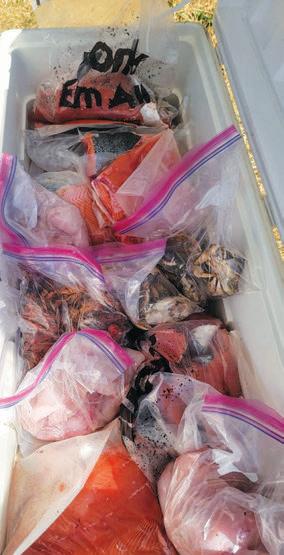





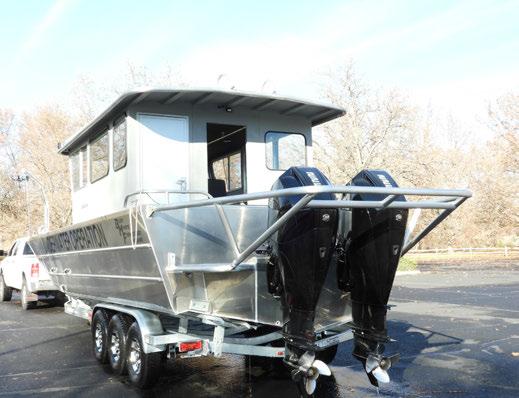




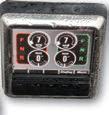
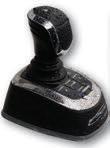
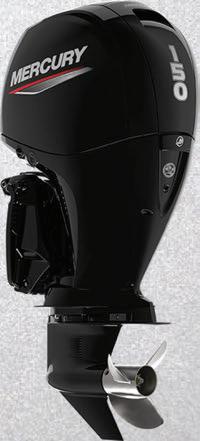

Paula Corcoran might be the grim reaper for southern Puget Sound Chinook when she’s wielding her Grim Reefer jigs. She enjoyed a good season on the water.

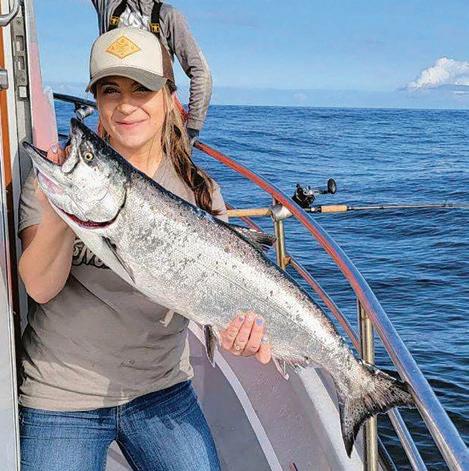
Looks like Annika
anglin’ for another cover! She graced the front page of our June 2021 issue with a Neah Bay Chinook and caught this halibut not far away, out of Sekiu, while fishing the Strait of Juan de Fuca port this summer. (COAST FISHING



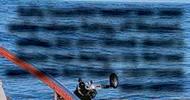


Rhonna Schnell does a lot of kokanee fishing in Central Oregon, but sometimes another species comes sniffing around her trolling setups. That was the case back in March on Haystack Reservoir with this rainbow trout.
(COAST FISHING PHOTO CONTEST)




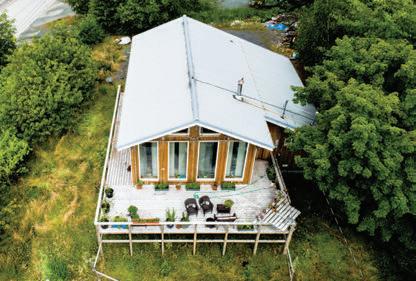


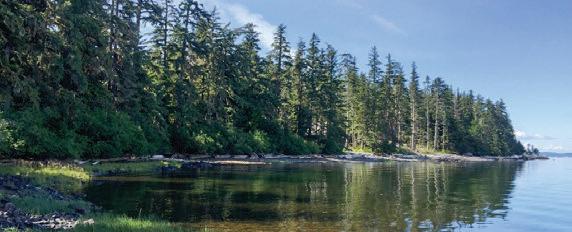

The property boasts beautiful topography with rolling hills, flats, ravines and a natural draw at the end of the parcel. Enjoy panoramic views of the countryside with natural rock formations, tall grasses and beautiful sunsets. Borders approx imately 1500 acres of state/blm land. Be one of those few owners to have their very own OASIS!!
This property offers multiple activity options to do on it. From biking, ATVing, horseback riding, to hunting. Build a cabin or a house or even just a great getaway location – the options are ENDLESS!!
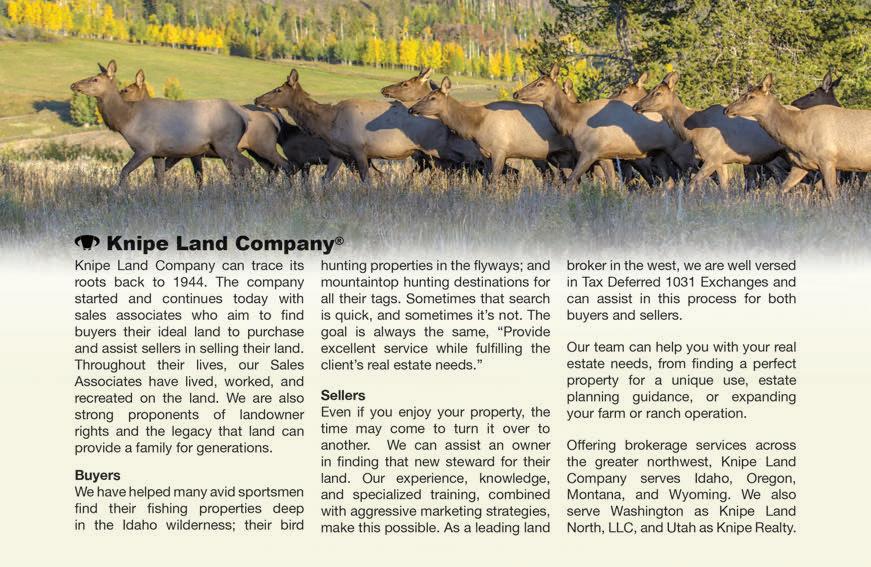


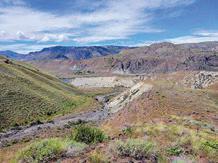

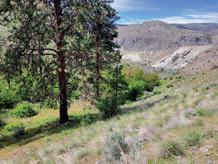
Approximately 35 minutes to Chelan, just over an hour to Wenatchee with the Columbia River nearby. LOCK UP this property NOW!
$265,000
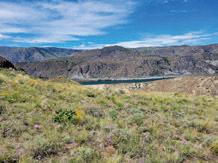







Bill Meade is the winner of our monthly Fishing Photo Contest, thanks to this shot of granddaughter Isabella and her crappie, caught at Southwest Washington’s Silver Lake. It wins him a knife and light from Coast!
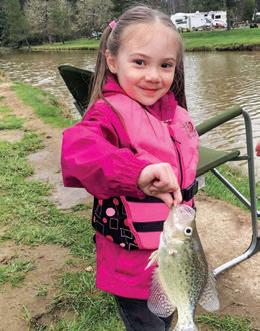





is our monthly Coast Hunting Photo Contest winner, thanks to this pic of son Cash and his first deer, taken on a youth any-deer tag. It wins him a knife and light from Coast!
For your shot at winning a Coast knife and light, send your photos and pertinent (who, what, when, where) details to awalgamott@media-inc .com or Northwest Sportsman, 941 Powell Ave SW, Suite 120, Renton, WA 98057. By sending us photos, you affirm you have the right to distribute them for our print or Internet publications.
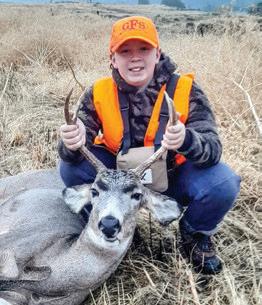


Apair of ugly midfall fish and wildlife wastage cases had Oregon troopers looking for the perpetrators. One involved the dumping of a large number of fouled coho just east of Cascades Locks, right above Bonneville Dam.
“The investigation determined the salmon were caught in gill nets. Some salmon were filleted while others were left whole. The dump site was located near a tribal in-lieu fishing site. There were also the remains of two deer with the salmon,” the Oregon State Police’s Fish and Wildlife Division reported.

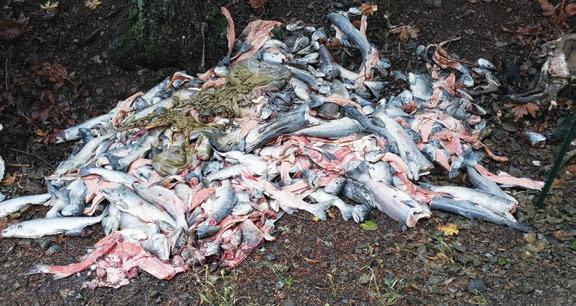
The mess was discovered November 2 off of I-84 at Exit 51 and Wyeth Road.

Tipsters are requested to contact troopers by calling 800-452-7888, texting *OSP (*677) or emailing TIP@osp.oregon.gov. Reference case number SP22295270.
OSP was also asking for tips about a bear that was shot and wasted in a ponderosa pine near Talent, south of Medford, on October 29.
“The investigation determined that not only was the bear struck by an arrow while in the tree, but it also had two bullet holes. Jackson County Fire District 5 was called to assist with getting the bear out of the tree,” troopers reported.
They say a second dead and decomposed bruin was found in the same area on Halloween, and humans are also suspected in its death.
The case number is SP22291483; use the above contact points if you can help.
Info leading to an arrest or citation can yield cash or preference points.
By Andy WalgamottDrones are great for spotting artillery fire and blowing up Putin’s tanks, but you can’t use ’em for pinning down an elk herd’s location.
A hunting party in Eastern Oregon’s Sumpter Unit learned all about that when a Baker City-based fish and wildlife trooper paid their ridgetop camp a visit in September during bow season.
As the officer was chatting to one
member of the party, they heard a “strange buzzing noise” and then spotted a drone in the air nearby. Drones are not exactly known for wandering on their own or their long range, but the hunter claimed not to know nothin’ about no device.
The trooper went over to investigate and found the drone was hovering in one spot 6 feet off the ground, and what’s more, a beeping sound emanating from nearby turned out to be its remote control, as if it had just been dropped.
Asked again about the drone, the
hunter allegedly admitted the trooper the unit was his “and he was using it and a hunting map program to determine if the elk herd they had located with binoculars was on private or BLM property.”
Hat tip for caring about not trespassing on somebody else’s land, but 100 demerits and a citation for “Use of Drone to Aid in Hunting: Prohibited Method” nonetheless.
In 2015, the Oregon legislature unanimously banned drones for scouting, hunting or interfering with other hunters, as well as fishing. At the time, a state coordinator for Backcountry Hunters and Anglers told GoHunt, “It just gives man too much of an edge.”


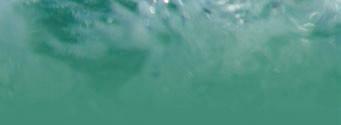






John Casey is this year’s King of the Reach, thanks to bringing in 39 fall Chinook during the late October livecapture derby that benefits a Mid-Columbia River hatchery program, wild salmon and local fisheries.
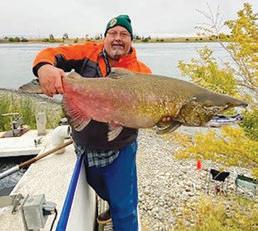
All totalled, 675 kings were brought in during this year’s KOTR, the fourth most for the effort that began in 2012 and an increase over 2021’s tally. The aim is to keep salmon raised at the Priest Rapids Hatchery as genetically close to salmon spawning in the downstream Hanford Reach as possible.
It’s a joint effort from the Washington Department of Fish and Wildlife, the Grant County Public Utility District and the TriCities Chapter of Coastal Conservation Association of Washington. Volunteers help collect anglers’ Chinook for shuttling to the hatchery where they’re spawned.

“Having a genetically robust hatchery program with fish that mirror the wild is critical, so if hatchery fish spawn in the wild, they will not have a significant effect on the
wild population,” WDFW explained in a blog before this year’s event.
Coming in second was Nathan Ruane with 29 upriver brights, while Nick Jordan and Bill Tierney each had 24 fish, and Stephen Davis, Cameron Westphal and Gregg Couch landed 22 apiece.
KOTR is held after the fishing season closes on the upper Hanford Reach. The 2022 edition was October 21-23. The most
By Andy WalgamottChinook ever brought in was 1,530 in 2019. State salmon managers estimate that 10,293 kings were harvested in the Reach this season, down from the previous two years.
Fisherman’s Marine Coho Derby, open Oregon and Washington waters, Sept. 10-Oct. 28: First place: Joe Darden, 18.85 pounds, upper Willamette River ($50 gift card and gear); 2nd place: Logan Schiller, 16.35 pounds ($40 gift card and gear); Third place: Christer Antonsen, 14.05 pounds ($30 gift card and gear)


1 Oregon Zone 2 duck and scaup season resumes; Eastern Oregon fall turkey hunting season in Desolation, Murderers Creek and Northside Units and southeast Heppner Unit switches to only open on private lands by permission
1-15 Extended pheasant season at select Western Washington release sites (no birds stocked)
4 Last day of Oregon South Coast Zone early goose season
4-12 Tentative razor clam digs scheduled on select Washington Coast beaches, pending marine toxin tests – info: wdfw.wa.gov
8 Last day of several Washington bow and muzzleloader deer and elk seasons
10 Washington Goose Management Area 1 reopener
13 Oregon High Desert and Blue Mountains Zones Canada goose season resumes
15 Last day of more Washington bow and muzzleloader deer and elk seasons
17 Oregon South Coast Zone goose season resumes
20-28
Tentative razor clam digs scheduled on select Washington Coast beaches, pending marine toxin tests – info: see above
31 Last day to hunt pheasants in Oregon; Last day of Eastern Washington general fall turkey hunting season; End of Oregon and Idaho fishing and hunting license years
1 New Oregon and Idaho fishing and hunting licenses required; Washington late cougar season opens – quota info: wdfw.wa.gov/hunting/regulations/ big-game/cougar
7 First of 14 brant goose hunting days in Pacific County (others: 8, 10, 12, 14, 15, 17, 19, 21, 22, 24, 26, 28 and 29)
10 Deadline to file Washington big game report for incentive permit eligibility
16 Oregon High Desert and Blue Mountains Zones late white and white-fronted goose opener; Last day to hunt Hungarian partridge, quail and pheasant in Eastern Washington
21 First of three brant goose hunting days in Clallam and Whatcom Counties (others: 25, 28)
22 Last day to hunt ducks in Oregon Zone 2
29 Last day to hunt ducks and scaup in Oregon Zone 1; Last day to hunt Canada geese in Blue Mountains, High Desert and Mid-Columbia Zones, all geese in Southwest Zone and white and white-fronted geese in MidColumbia Zone
31
Deadline to file mandatory hunter reports in Washington and Oregon; Last day to hunt upland birds in Oregon and Idaho; Last day to hunt ducks and geese in Idaho Area 1; Last day to hunt turkeys in Oregon; Last day to hunt chukar in Eastern Washington; Last day to fish for trout, salmon and/or steelhead on many Western Washington river systems
4 Oregon Northwest Permit Zone late goose opener; Mid-Columbia Zone white and white-fronted goose opener; Oregon and Washington statewide veterans and active military waterfowl hunting day; Washington statewide youth waterfowl hunting day
10 Deadline to apply for Oregon spring bear permit
11 Washington Goose Management Areas 1, 4 late white goose opener; Washington Goose Management Area 2 Coast and Inland zones late goose opener (state wildlife areas, federal refuges closed; select dates)
15 Last day to apply for Idaho spring bear hunt; Last day of steelhead fishing in select Puget Sound terminal areas
18 Oregon South Coast Zone late goose hunt opener
18-19 Free Fishing Weekend in Oregon

19 Last day of Oregon Zone 1 snipe hunt
28 Last day of bobcat, fox season in Oregon
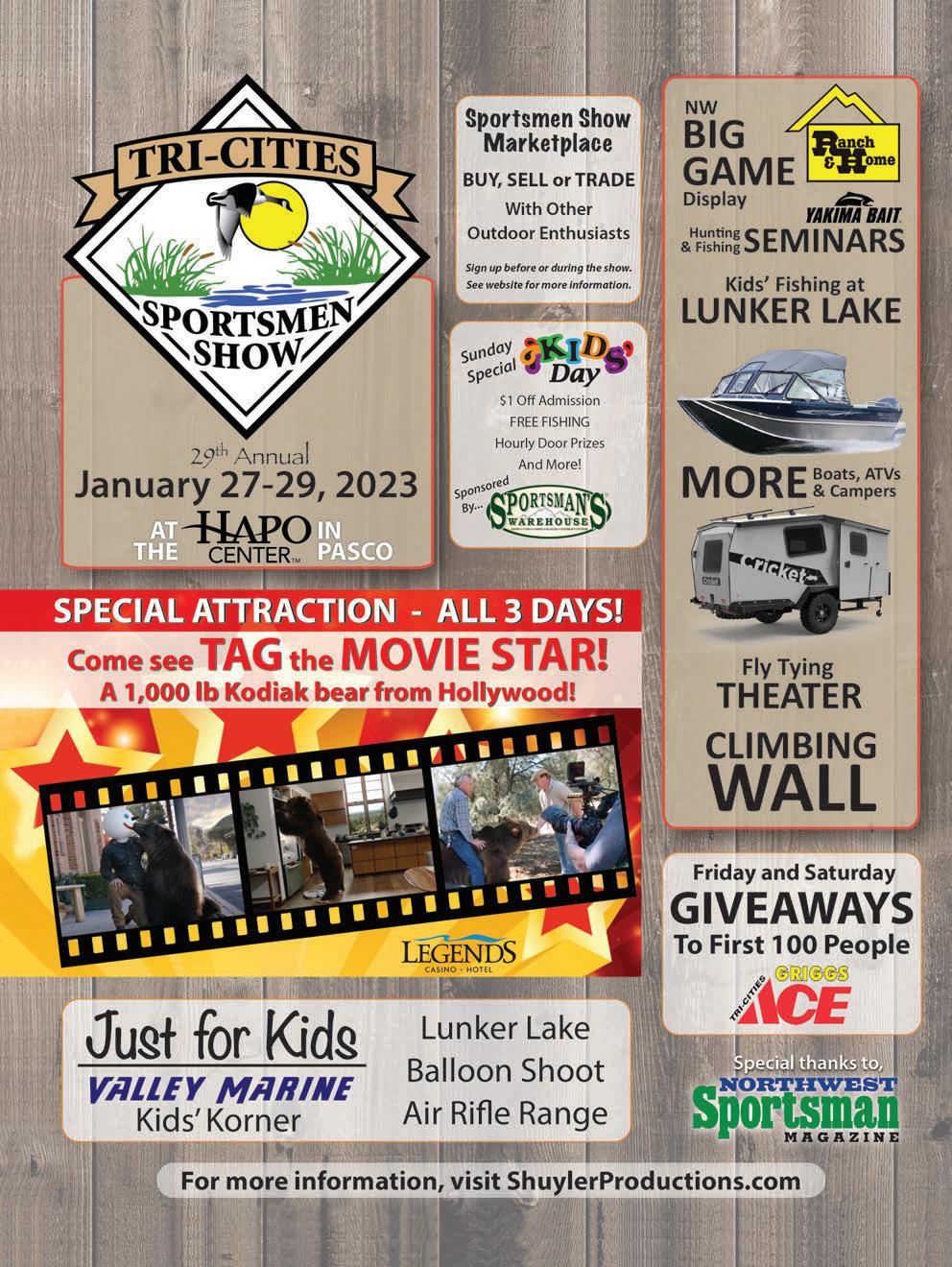
6-8
11-15
The Wenatchee Valley Sportsmen Show, facebook.com/profile.
php?id=100064789360346
Portland Boat Show, Expo Center, Portland; otshows.com
19-22 Tacoma RV Show, Tacoma Dome, Tacoma; otshows.com
20-22
Great Rockies Sport Show, MetraPark ExpoCenter, Billings; greatrockiesshow.com
27-29 Tri-Cities Sportsmen Show, HAPO Center, Pasco; shuylerproductions.com
1-5
1-5
3-5
Vancouver International Boat Show, BC Place and Granville Island, Vancouver, BC; vancouverboatshow.ca
Washington Sportsmen’s Show, Washington State Fair & Events Center, Puyallup; otshows.com
Eugene Boat & Sportsmen’s Show, Lane Events Center, Eugene; exposureshows.com
3-11 Seattle Boat Show, Lumen Field Event Center and Bell Harbor Marina, Seattle; seattleboatshow.com
10-12 Douglas County Sportsmen’s & Outdoor Recreation Show, Douglas County Fairgrounds, Roseburg; exposureshows.com
10-12 Willamette Sportsman Show, Linn County Expo Center, Albany; willamettesportsmanshow.com
15-19
Pacific Northwest Sportsmen’s Show, Expo Center, Portland; otshows.com
24-26 Central Washington Sportsmen Show, Yakima Valley Sundome, Yakima; jlmproductionsllc.com
24-26 Jackson County Sportsmen’s & Outdoor Recreation Show, Jackson County Expo, Medford; exposureshows.com
25-26 Saltwater Sportsmen’s Show, Oregon State Fairgrounds, Salem; saltwatersportsmensshow.com
2-5
The Idaho Sportsman Show, Expo Idaho, Boise; idahosportsmanshow.com
3-5 BC Sportsmen’s Show, Tradex, Abbotsford, BC; bcboatandsportsmenshow.ca
9-12 Central Oregon Sportsmen’s Show, Deschutes County Fair & Expo Center, Redmond; otshows.com
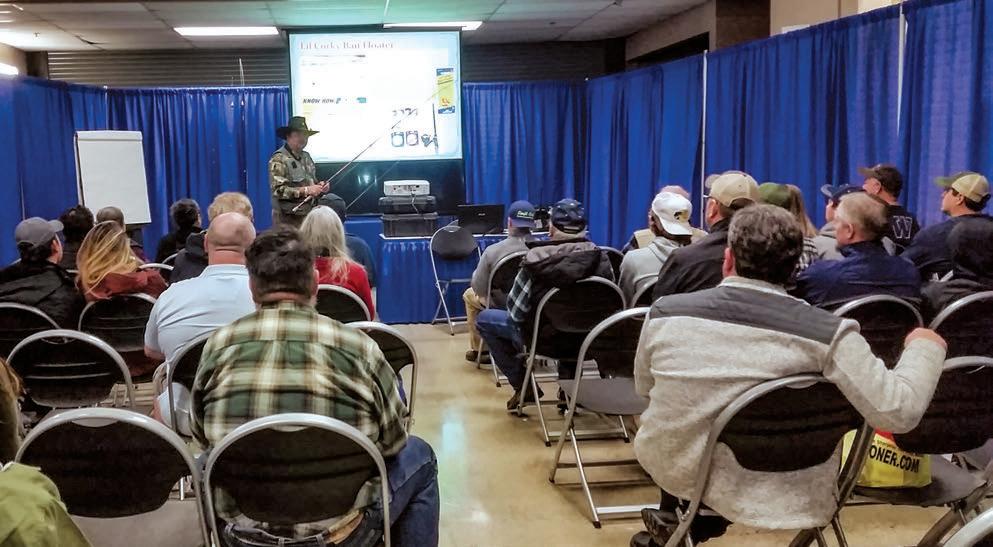
10-11 Northwest Fly Tyer & Fly Fishing Expo, Linn County Fairgrounds, Albany; flyfishersinternational.org
16-19 Big Horn Outdoor Adventure Show, Spokane Fair and Expo Center, Spokane; bighornshow.com
18-20
Anacortes Boat & Yacht Show, Cap Sante Marina, Anacortes; anacortesboatandyachtshow.com
TBD
Victoria Boat and Fishing Show; victoriaboatshow.com



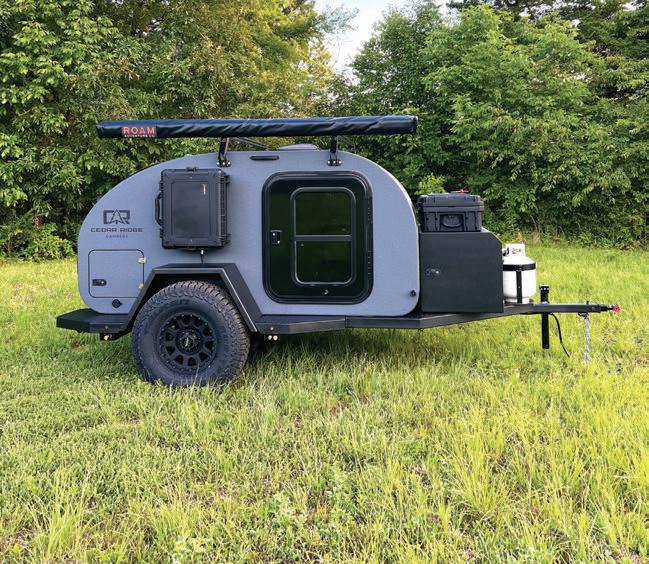

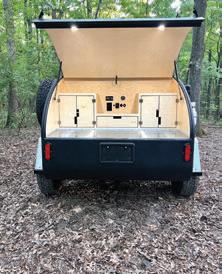



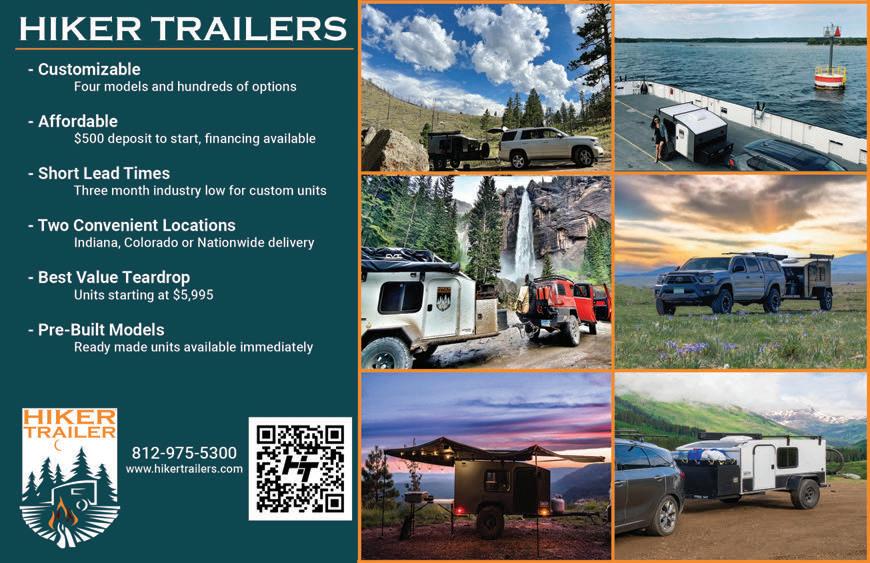
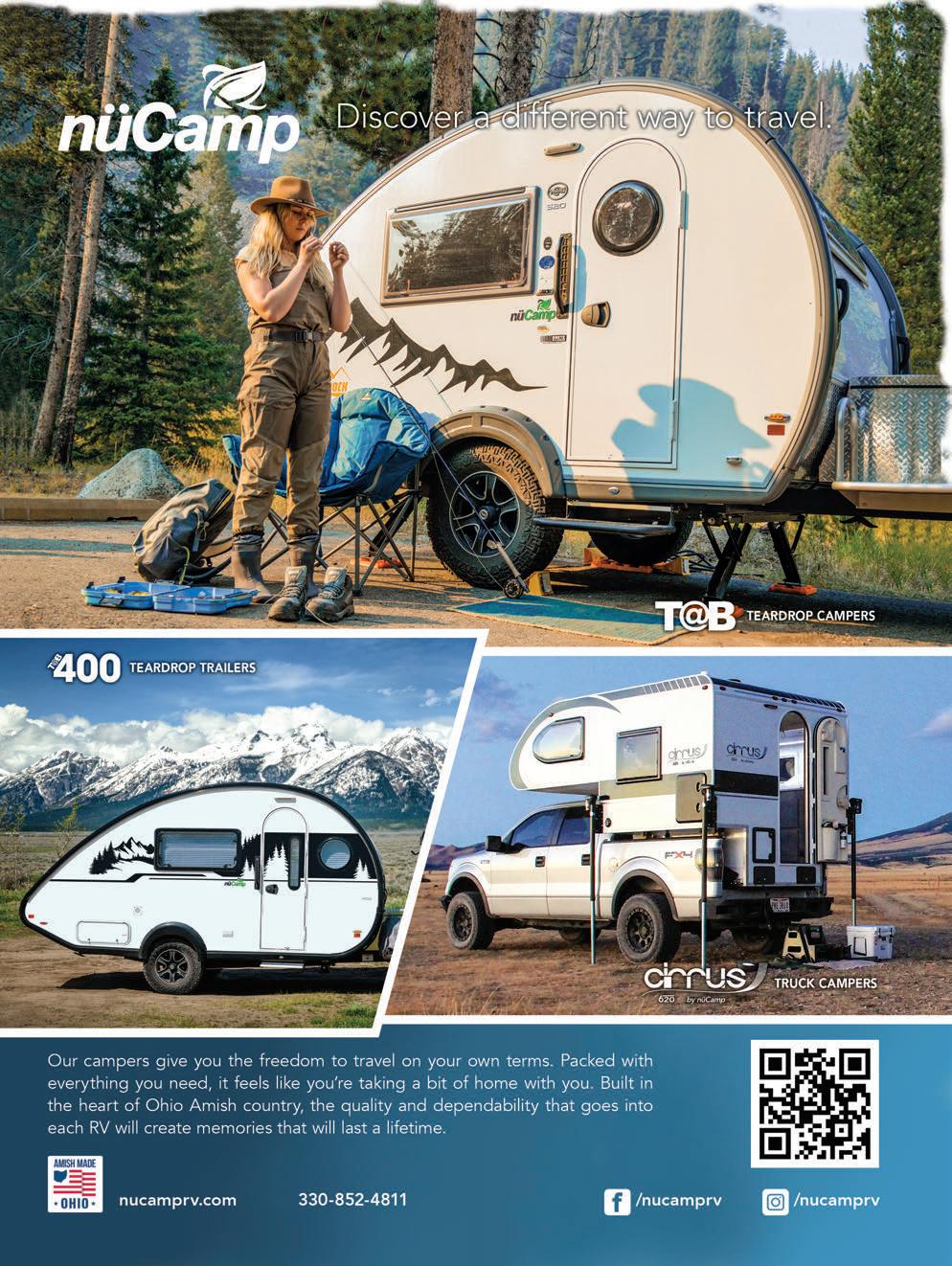
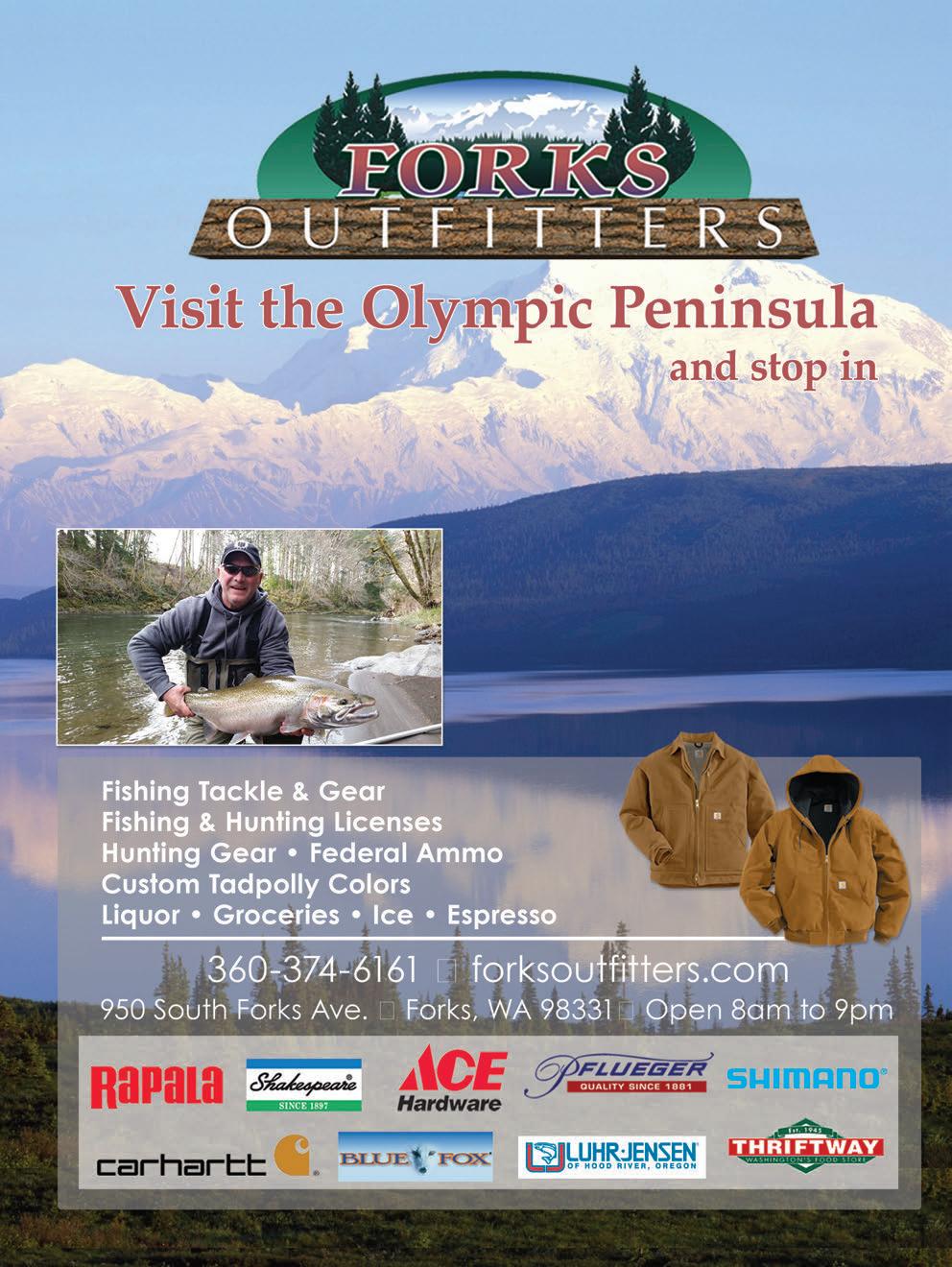
Lake Roosevelt beaches should be hot again this winter for the state’s tastiest rainbows like this one held by my ladyfriend Molly. As we sat by a fire, a bell rang and she ditched her drink and sprinted for the rod to claim it and drag this beauty on shore. The trout fell for a tactical presentation of corn-flavored PowerBait. (JEFF
Some of the year’s best bank and boat fishing and tastiest rainbows are on tap at select Eastern Washington lakes, plus a few west of the Cascades.
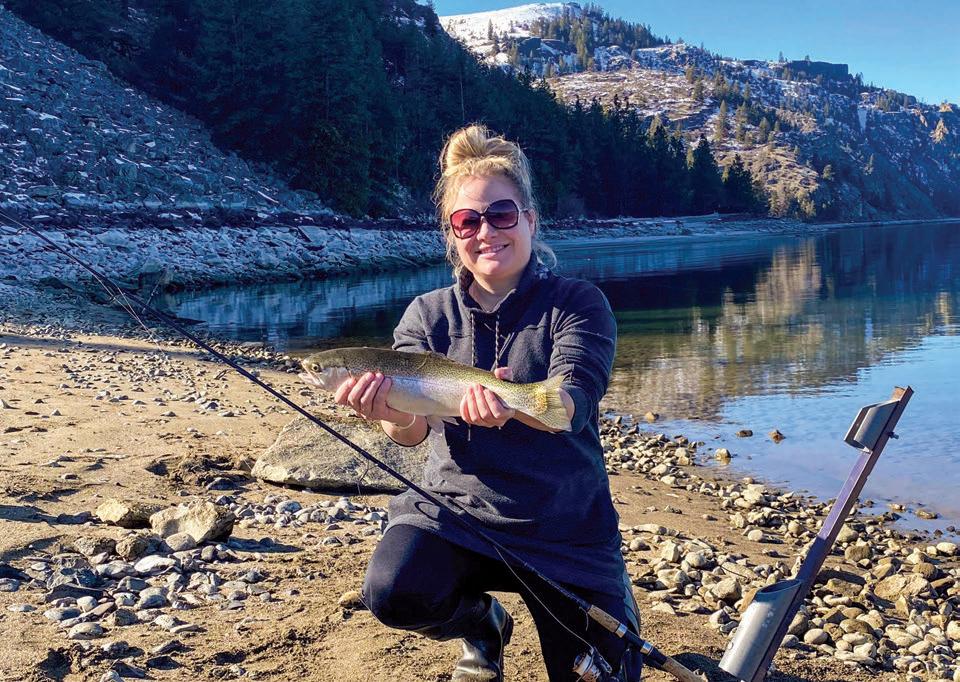 By Jeff Holmes
By Jeff Holmes

Imust confess –mostly to myself because nobody cares –that the fishing that brings me the most joy is not the fishing that fills my freezer the fullest, nor that requires thousands of dollars of gear. I love
simple trout fishing. It’s my favorite fishing hobby in the winter. I grew up on it, and I have returned to its sweet simplicity and dependability and the joy it brings, despite living .4 mile from a boat launch on a Columbia River pool featuring the best trophy walleye fishery in the world. My confession
comes despite a great year in my boat for chrome sockeye and summer Chinook, a pretty decent year for bass and walleye, and a banner year in which I put 25 albacore tuna in jars and in my freezer.
Despite these successes, it occurred to me this summer that nothing
compares to the simple enjoyment I get from going back to basics and plunking and trolling for trout during the wintertime. I’ll often drive three hours in sketchy conditions for trout before launching close to home for winter walleye.
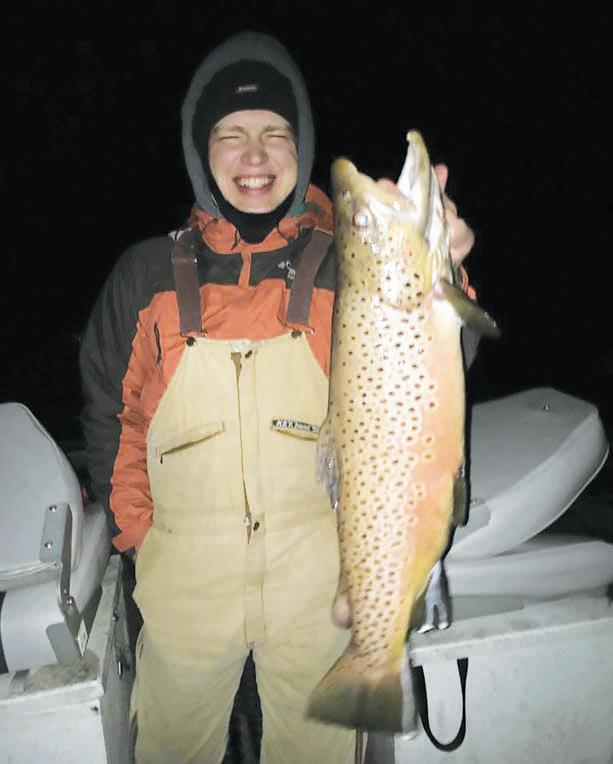
Ah, the ring of a bell on a freezing cold beach and a child leaving the fire’s warmth to grab a buckling spinning rod! Ohhh, a doubled-over, slow-trolled flyrod and a previously freezing-cold woman yelling “Fish! Fish!” with excitement in her eyes, asking to do one more pass. Mmmm, the adulation of snack-tray dippers complementing my proprietary
miles off our coast, and it would have been difficult for me too when I was younger. But more and bigger is not always better in the outdoors, and following one’s heart leaves room for killing kings and having robust PowerBait and Woolly Bugger collections.
Despite steelhead being the state fish, Washington is a trout-fishing state in terms of participation and license sales, and winter is the best time of year to land lunkers in peace and quiet and winter splendor. I love steelhead, but I don’t like crowds, I get cabin fever, I feel the effects of low light and short days, and I love to be on or around the water year-round. Trout fishing salves my seasonal blues, puts fresh air in my lungs, and lights up my senses with ringing bells, great conversations, the smell of woodsmoke, the sight of wildlife, the struggle of trout on light gear, and the taste of smoked trout dip and smoked trout pasta salad.

good number of really
fish
blend of smoked trout mixed with cream cheese. These simple, highly achievable experiences bring me such joy these days.
For years I mostly gave up on these simple pursuits in favor of collecting obscene amounts of steelhead, salmon, walleye, bass and saltwater gear. I mean, I don’t even have a saltwater boat. It might be tough for some anglers to understand why dragging a 3-pound rainbow onto a freezing-cold Lake Roosevelt beach or why netting and releasing a 20inch brown at Rock Lake remotely compares to a deckhand gaffing a 20-pound albacore in bluewater 40
Also, provided you keep them warm and busy, winter trout fishing can be great for kids, wives and girlfriends. Last year I very successfully bundled a couple sessions of fruitful Lake Roosevelt trout plunking and bonfire burning with sledding at Mount Spokane and other kid-friendly activities in Spokompton. It was really fun and soon to be repeated.
MY FAVORITE PLACES to fish for trout in winter are not secrets, and I will gladly reveal them all here, followed by simple rigs that catch lots of fish.
By far my favorite trout water in Washington is Whitman County’s only natural lake, Rock Lake. Seven miles in length and 360 feet deep with two houses on the whole thing, Rock is a natural wonder I’ll write about later this winter, detailing tactics for the lake’s big browns and hefty rainbows. It can be accessed 26 miles south of Cheney at a small, unimproved Washington Department of Fish and Wildlife boat launch and recreation area, which offers some
Hughes River Expeditions has been family-owned and -operated and running first-class trips on rivers in the West since 1976. We run week-long, all-inclusive trips on the Middle Fork of the Salmon, Selway, Main Salmon and Salmon River Canyons. Our trips focus on fishing, whitewater, history, archaeology, hot springs, hiking and more! Please call us at 800-262-1882 or visit us on our website hughesriver.com.
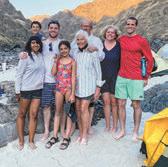

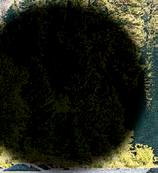
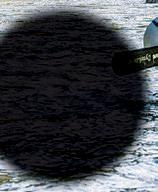


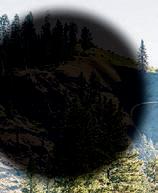



Come experience the rivers of SW Washington and the Olympic Peninsula while shing for salmon, trout, and steelhead! Fishing rivers ranging from Forks, through Grays Harbor, South Puget Sound, and more...
FALL CHINOOK AND COHO SALMON
$220 per person • Mid August through November Chinook are some of the best eating and strongest salmon you’ll nd! Your largest average size salmon in the PNW, and can have some of the highest fat content when caught early in their migration, fresh out of the saltwater. While not the largest fall sh, Coho are some of the most aggressive salmon we will target, often chasing lures clear across the river and all the way to the boat, sometimes even jumping out of the water in an attempt to strike. They have a mild avor and hold their meat quality for a long time once they enter fresh water, making them a great target species for lling your freezer.
BOOK YOUR TRIP TODAY! Get in touch and contact me by email, phone, or text to schedule your next shing experience today! luckycastnorthwest@gmail.com (503) 956-6272 www.luckycastnorthwest.com
shore fishing opportunities.
Rock lives up to its name and can be a dangerous lake to run at full speed and an impossible lake to fish bait off the bottom. The easy solutions are to run full speed only up and down the center of the lake and to avoid fishing the bottom altogether. The fish are in the top 5 to 20 feet of the water column anyway, which is where I troll flies and plugs and where I cast lures and meaty flies along the rocky shorelines and points. When I fish cured eggs or shrimp –which I do only during lunch breaks with crews not too fiendish to fish through the lunch hour –I do it under a slip bobber to avoid losing sinkers and hooks on nearly every cast. The WDFW launch offers limited but at times lucrative shore fishing options for slip bobber anglers, and 7 miles of lake offer immense opportunities to troll or cast for big trout. I recommend bringing a 14-foot or larger boat – I’ve launched a 20-footer without a problem. Bring waders until you figure out the launch, and watch the wind.
A CLOSE SECOND favorite winter trout fishery of mine is the state’s biggest and most heavily stocked. Home to Washington’s tastiest rainbows, Lake Roosevelt is a plunker’s dream. Sure, you can tow a boat here and have a chance at the lake’s very large kokanee, but landing obese rainbows from 15 to 24 inches is pretty easy from the shore. Big, plankton-eating, redfleshed, adipose-fin-clipped hatchery rainbows patrol the reservoir’s beaches and rocky shorelines in its southern arm from Fort Spokane all the way down to Grand Coulee Dam, as so do some beautiful and large wild rainbows that must be released.
Since it’s legal to have fires on Roosevelt’s beaches, I bring a jumbo wheelbarrow or cart to transport wood, axe, chairs, rod holders, food and all of my gear. I prefer this simple approach to trailering my boat in the winter for many reasons, one of which is because it’s much safer to
have a roaring bonfire on the beach. I hammer in rod holders spaced at 50- to 75-foot intervals and hang a bell on each plunking rod. We let the fish tell us which rod positions are best and then cluster rods close together. I won’t tell you my favorite beach, but I will tell you that Spring Canyon, Keller, Hawk Creek, Seven Bays and Fort Spokane are all places I’ve done well. I’ll also tell you that corn-flavored PowerBait has outfished all other forms of PowerBait for me by a two-to-one margin and has also outfished all combinations of ’crawlers, mallows, eggs and coon shrimp.
OTHER PLACES IN Eastern Washington I have an affinity for include the famed Cheney-area winter lakes, Fourth of July and Hog Canyon. Fourth of July sits in a coulee just a few miles south of Sprague and features great growth rates for rainbows, which are probably some of the largest trout available for harvest in the state. If it isn’t frozen, it’s a great place for float tubes and pontoon boats and other small cartopper-type craft.Low water levels make launching a boat challenging, to say the least.
Many anglers also elect to walk in and fish the shorelines, which is lucrative with plunking rigs or slip bobbers. Often the further you walk, the better fishing you can expect, but there are also plenty of fish right at the launch. Five trout may be retained but only two can be over 14 inches. The lake produces lots of rainbows in the high teens and some much larger.
Hog Canyon’s rainbows are a little smaller, but they are numerous, and the lake is a pretty and easy-to-access option just off I-90’s Fishtrap Exit. It’s ringed by basalt and ponderosa pines and is undeveloped except for the fishing access. Five trout may be retained but only two can be over 14 inches.
North of Spokane in Stevens County, Hatch and Williams Lakes are heavily stocked winter lakes featuring rainbows from 12 to 16 inches. Both
are excellent ice fishing lakes, and when not frozen, they offer great fishing from cartopper and other small craft. Williams offers better shore fishing than Hatch when unfrozen.
Also in Stevens County, Waitts is an outstanding December fishery for brown trout and rainbows. Rainbows grow very well here, and some truly trophy-sized browns can be had during open-water and icedover conditions. The lake could conceivably produce a state-record brown trout at some point. Waitts is also a great yellow perch fishery through the ice with both abundant and good-sized perch.
ALONG WITH THESE favorite winter trout fisheries of mine – and I left some off the list, like Lake Spokane and Sprague Lake – WDFW also does a heck of a job stocking small local lakes all over Washington, from King County to Spokane County and many waters in between.
The day-after-Thanksgiving “Black Friday” fish stockings carry over into December and beyond, and the following lakes will fish well this winter for trout well into the teens, thanks to that holiday promotion: Battleground and Klineline Lakes in Clark County; Kress Lake in Cowlitz County; Cranberry Lake in Island County; Leland Lake in Jefferson County; Beaver and Green Lakes in King County; Rowland Lake in Klickitat County; Fort Borst Park and South Lewis County Park Ponds in Lewis County; Spencer Lake in Mason County; American, Bonney, Harts, Kapowsin and Tanwax Lakes in Pierce County; Ballinger, Silver and Tye Lakes and Gissburg Ponds in Snohomish County; Long’s Pond and Black, Long, Offutt, St. Clair and Ward Lakes in Thurston County; and Elton Pond North in Yakima County.
WHEREVER YOU MAY choose to fish, simple plunking, trolling and slip bobber techniques will tempt trout. There’s not much to overthink, and dialing in such rigs is straightforward.

You don’t need a secret bait or magical egg or shrimp cure, and for well under $200 bucks you could buy a rod, reel, line, leader, tackle and bait to fish all winter off of Northwest beaches. For under $300 you could also outfit yourself from scratch to troll flyrods and wet flies, a technique that has always resulted in superior numbers of fish for me compared to trolling terminal tackle. Here are my three go-to, super-simple trout rigs for wintertime success.
Beach plunking rig: There are a lot of ways to plunk for trout off of beaches, but by far my favorite for fishing PowerBait, worms and ’crawlers, or coon shrimp and Puffballs is the standard slip sinker rig. I prefer a 7- to 8.5-foot spinning rod and reel combo spooled with 20-pound braid, but the rod and reel matter very little. Fish with what you have.
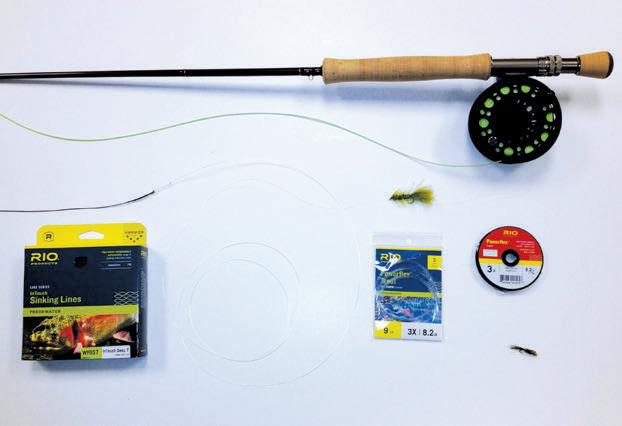
What you tie on your line matters more. I run a size 6- or 8mm bead on my braid to protect my rod tip, followed by a 1-ounce egg sinker, followed by another bead. I then tie on a barrel or crane swivel and 24 to 26 inches of fluorocarbon leader. For PowerBait I like an ultrasharp size 14 treble, and for other baits I like a size 4 single baitholder hook. Ensuring your bait is floating above the bottom
is essential, which you can count on with PowerBait. Marshmallows or Puffballs do the trick for those plunking nightcrawler chunks or coon shrimp. I usually keep it stupid simple with PowerBait and carry several colors/scents.
Slip bobber rig: Steelheaders use this rig more often than trout fishermen, but a slip bobber rig is a lethal way to precisely control depth and avoid snaggy bottoms.
As a kid I first saw this technique in action at Rock Lake, where experienced steelheaders were adapting tactics from the Snake River to avoid certain snags at Rock while in pursuit of brown trout and rainbows off of the public launch. I have used slip bobbers to my advantage for years on trout when seeking to avoid snags, when taking kids fishing, and at times when I just want to watch bobbers drain.
I prefer the same 7- to 8.5-foot spinning rod and reel combo spooled with 20-pound braid, but any light steelhead spinning combo or even a much smaller trout rod will get the job done. For me, a key with this rig starts with two high-quality bobber stop knots, and I prefer the ones tied with thin cordage or the Beau Mac bobber stop eggs. I use two in case
one fails. Without a good bobber stop (or two), a slip bobber rig is useless. I next slide a small bead on my mainline that I make sure will not slip over my bobber stop! This is key. Then comes a small slip bobber with enough buoyancy to support a ¼- to ½-ounce weight, followed by another bead, followed by an inline sinker. I tie 12 to 20 inches of 8-pound mono or fluorocarbon leader to the bottom eye of the inline sinker, followed by a size 4 or 6 baitholder hook. I prefer to fish coon shrimp, cluster eggs, nightcrawler chunk, or another nonbuoyant bait under a slip bobber
Full-sink fly line trolling rig: I put this full-sink fly line fishing rig picture (left) together with Seattle’s iconic fly shop The Avid Angler several years ago. They are a great option, as is Silver Bow Fly Shop in Spokane and Northwest Outfitters in Coeur d’Alene. They can reduce the learning curve and keep the cost down for this decidedly untechnical flyfishing application that yields amazing results. Or, you can go search around and find yourself a discount on a 5- or 6-weight 9-foot fly rod, a large arbor fly reel in the same weight, some 20-pound Dacron backing or even just some old braid or heavy mono you have lying around, some monofilament or fluorocarbon tippet in 6- or 8-pound test (4x or 3x), and an assortment of dull-colored olive, brown or black Woolly Buggers or leeches.
The one thing you should not skimp on is your full-sink fly line, which should be at least a type-6 sink rate, meaning that it sinks about 6 inches a second.
How do you fish this rig? Strip out half to three-quarters of your spool of fly line and troll it from .8 to 1.5 mph, letting the fish tell you what they want while you make frequent wide-looping turns, concentrating on points and shorelines with dropoffs or known concentrations of fish. It’s very unscientific and untechnical, and once you try it, it will make a believer out of you, as will winter trout fishing. NS











lake whitefish the next big thing in Eastern Washington angling? Fisherman-biologist

Garrett, here with one, thinks so. “These fish are one of the most underutilized fish and their abundance is a lot higher than many other fish species,” he says, plus they fight and taste great. (WDFW)
Lake whitefish are plentiful and fun to catch at Banks Lake in winter, and here’s how.
By Mark YuasaMention lake whitefish to any local angler and you’ll likely get a “deer caught in the headlights” stare, but that is evolving with many fisherman starting to take notice of this abundant species in Eastern Washington waterways.
“Lake whitefish go pretty much unnoticed in Eastern Washington by most anglers, but you’ll find a devoted group of folks who have
really good success at places like Banks Lake,” says Marc Petersen, a Washington Department of Fish and Wildlife biologist. “Their biomass and abundance are much higher than other species, and that’s one reason why we promote their harvest.”
DURING THE WINTER, Banks Lake – a large, 27-mile-long reservoir that stretches along Highway 155 between Coulee City on the south end and Electric City on the north end – offers
about 91 miles of accessible shoreline, mainly on the eastern side, and excellent fishing opportunities.
While winter is an ideal time to target lake whitefish, Petersen notes, you’ll still need to learn their seasonal habits and what to catch them on.
For starters, areas where the fish tend to hang out differ by season. Common winter locations are the northernmost points of the lake across from North Dam Park and by the dike at the Coulee City Marina.
From a boat try off the red buoys or anywhere along the riprap.
The Devils Punch Bowl, a bay between the big Steamboat Rock peninsula and Coulee Boulevard on the northeast side of the lake, is a known producer in the summer.
There are plenty of WDFW water access locations – Ankeny Road North and South; Barker Canyon; Million Dollar Mile North and South; and Osborn Bay Lake – as well as Steamboat Rock State Park. Keep a sharp eye out for underwater hazards like boulders and rocks in the south end of the lake and near islands.
From December to January, lake whitefish will move into shallower waters and reservoir inlets to spawn, usually around cobbled, sandy flat areas. The fish like to school in those areas, making them catchable for bank anglers.
If ice forms, anglers will head to deeper water. Although Banks doesn’t get iced over during most winters, when it does, the fishing can be productive.
Keep in mind lakes can be dangerous when freezing, thawing and refreezing occurs. While ice safety can never be assured, do not go out onto a frozen lake unless the ice is at least 4 inches thick. As much as 9 inches may be needed to safely support snowmobiles or other vehicles.
In other parts of the country, it’s not uncommon for people to book guided fishing trips to catch lake whitefish.
They’re a prized fish and have a huge following in the Great Lakes region, as well as the midwestern area of the United States and Canada.
NOT MUCH IS known about how lake whitefish came to Washington waterways, but it is likely the nonnative fish were first brought to nearby states during the late 1800s.
One theory is they were first introduced into Lake Pend Oreille in Idaho and Flathead Lake in Montana, and from there they spread naturally through connected waterways or were moved around by early settlers.
“They quickly adapted to Washington waters and eventually got locked in once the dams were built,” says Danny Garrett, a WDFW biologist. “They now flourish in the upper Columbia River and large lakes and reservoirs, allowing anglers easy access to a great fighting fish.”
To find out more about lake whitefish in Banks Lake, WDFW began conducting creel surveys last January, work that will be completed by the end of this month.
“In our surveys, I know in general we had a very successful fishery this past summer and are likely expecting a great winter,” Petersen says. “We should know more details sometime later in 2023. I think folks will be quite surprised with what we’ve discovered so far in our surveys.”
You might be surprised to learn lake whitefish are from the same
family as salmon, trout, char and grayling. They are deep bodied and laterally compressed, and they have an adipose fin with a forked tail, which indicates they’re very fast swimmers. The average size of lake whitefish in Banks is 18 to 24 inches with some larger ones up to 31 inches. They are known to live 15 to 20 years.

“A lot of anglers don’t realize what a fight they put up when hooked,” Petersen says. “It amazes me that more anglers aren’t taking advantage of fishing for lake whitefish, and I think over time it will catch on.”
ON LIGHT TACKLE lake whitefish put up a decent tussle when hooked and since they tend to congregate in large schools, the bite can remain productive all day long.
A lightweight 6-foot rod with a spinning reel – the same type of gear you’d use for trout or small gamefish – works the best. A sensitive-tipped rod will make it easier to detect their very light bite.
Lake whitefish have a very small head and mouth, so you should use a bait or lure resembling their diet, which includes snails, clams, small fish and fish eggs.
“Most of the time I like to use cocktail shrimp – the seafood market variety –and will break them in half because it’s better to use a smaller piece,” Petersen tips. “I’ll thread the shrimp on the hook leaving just the tip exposed because the bite is very subtle.”
Popular lure choices include a Dick Nite spoon, Mepps spinner, Cicada Blade Bait, Mack’s Sonic Baitfish and a Reef Runner Cicada. Another bait to try is maggots. Be sure to tip your hook with a single red salmon egg.
From the bank, use an oval slip sinker on 4- to 8-pound-test main line tied to a barrel swivel with a footand-a-half fluorocarbon leader tied to a size 8 or 10 hook. Jigging spoons or a cocktail shrimp can be effective when suspended at the proper depth, or cast and slowly retrieve small jigs and spoons just off the bottom.
“During winter, I will vertically jig
Drastically improves performance and straight line travel of bow-mounted electric trolling motors. The use of bow-mounted, electric trolling motors for salmon trolling is a game-changer. Not only does this Skeg improve performance, it makes bow-mounted electric trolling motors much more efficient. Your batteries will run longer on a charge. The LeeLock Magnum Skeg can be a vital part of your trolling motor system!

The Skeg is made of anodized 5052 aluminum. The size is 8 3/4 inches high by 10 inches wide and it’s 3/16 inches thick. The anodization keeps the aluminum fro1o fit most* 24 Volt anda 36 volt Minn Kota motors (see drop down). It comes with clear PVC coated stainless steel hose clamps. Call 360380-1864 or write info@leelock.com if you have any questions about fit. LeeLock is the only west coast manufacturer that produces an oversized Skeg for electric trolling motors.




*The LeeLock Magnum Skeg should fit all Minn Kota motors built with original skegs (fins) in the back of the motor with the exception of motors with Built In MEGA Down Imaging® Sonar, which is the large sonar unit on the bottom of the motor, not on the nose.

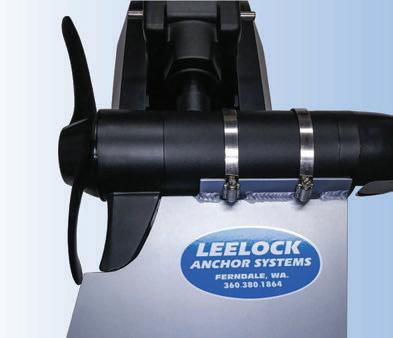
This new tool from Leelock will allow you to measure your Dungeness crabs to determine which ones are legal to keep. Then use the ‘Cracker’ to crack them in half, separating the two clusters from the shell and guts. The Cracker has been designed so that it sits nicely on top of a 5-gallon bucket, perfect for when you clean crabs. The bucket gives you a stable base which makes it easier to clean – the guts and a go into the bucket, making cleanup a snap. Crabs cleaned this way take up half as much space as whole crabs, so you can cook twice as many in your kettle.
The Crab Cracker is an unique tool made from solid aluminum, and comes in handy for cleaning Dungess crabs.

Banks’ adult lake whitefish average 18 to 24 inches, with some stretching the tape to 31 inches. This specimen sampled from nearby Lake Roosevelt by Washington fishery biologists weighed 9.6 pounds, more than 2 pounds heavier than the state record. The fish are also found in Columbia Basin irrigation project reservoirs. (WDFW)
like at the mouth of the Colville River and Kettle River might be good starting points. I’d try the same techniques you use at Banks Lake to catch them. We’ve sampled a fish out of Lake Roosevelt that was 9½ pounds.”
The current state record for a lake whitefish stands at 7.50 pounds and was caught on February 19, 2021, by Jacob White at Cox Lake in Franklin County, but there’s no doubt larger ones are lurking in the additional Eastside waterways.

Lake whitefish can also be found in Roosevelt’s lower Spokane River Arm; Soda, Billy Clapp and Moses Lakes; and Potholes, Rufus Woods and Scooteney Reservoirs.
“We are literally sitting on the tip of an iceberg when it comes to lake whitefish fishing in Eastern Washington,” Garrett says. “These fish are one of the most underutilized fish and their abundance is a lot higher than many other fish species.”
a tiny spoon like a forage minnow or Swedish Pimple, and in the summertime I’ll stay mainly with bait shrimp,” Petersen says.
You can use the two-pole endorsement at Banks, which gives you the added opportunity to catch fish faster. The daily limit is 15 lake whitefish and there is no minimum size limit here. A freshwater fishing license is required for those aged 15 and older.
You can catch lake whitefish virtually year-round at Banks Lake, but there is a lull during fall and spring as fish transition to their winter and summer habitats.
In summer the action sees a second peak as fish congregate in huge schools located in the deepest sections of the reservoir.
Banks is also home to black crappie, bluegill, burbot, common carp, kokanee, largemouth and smallmouth bass, rainbow trout, walleye and yellow perch. You can find many outdoor activities at or near the lake, such as camping, hiking, mountain biking, boating, kayaking, canoeing,
golfing, and plenty more. There are numerous hotels, stores, restaurants, tackle shops, campgrounds, RV sites and other necessary amenities too.
OTHER LAKE WHITEFISH fisheries include Lake Roosevelt, a vast impoundment stretching more than 150 miles from Grand Coulee Dam into Canada.
“We recently did our annual gillnetting survey at Roosevelt Lake, and a good chunk of the catch was dominated by lake whitefish,” Garrett says. “While we haven’t done a specific study on lake whitefish, their biomass in Roosevelt is equal to Banks Lake, if not larger, given to how much we catch and given the size of Roosevelt versus Banks.”

Garrett says Roosevelt goes under the radar when it comes to lake whitefish and remains largely unnoticed by anglers targeting more popular species like walleye and rainbow trout.
“If I were someone who wanted to look for lake whitefish in Roosevelt, I’d try areas near a tributary mouth at spawning time,” Garrett says. “Places
LAKE WHITEFISH TASTE great and have moderately firm, flaky meat like salmon and are packed with omega-3 fatty acids.
“Lake whitefish have a high oil and fat content and when processed correctly are a great-eating fish,” Petersen says. “They’re known to be very bony, but people in the Midwest and Canada smoke them or use them in a fish fry.”
For ways to cook and prepare lake whitefish, go to the Great Lakes fish recipes at pinterest.com/ fishmongerswife/whitefish-greatlakes-fish-recipes, Michigan Fish Producers Association recipes at mfp .us or search YouTube for “Andrew Zimmern’s Whitefish Shore Lunch.”
And speaking of YouTube, WDFW’s feed (youtube.com/c/ thewdfw) also has videos on chasing Banks Lake’s lake whitefish in winter and summer. NS
Editor’s note: Mark Yuasa is a Washington Department of Fish and Wildlife communications manager and longtime local fishing and outdoor writer.


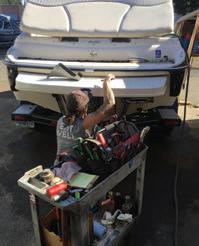
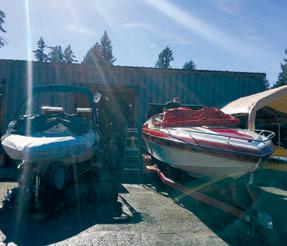
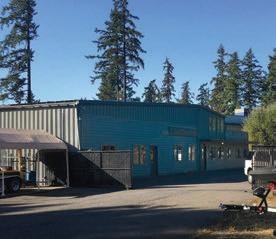




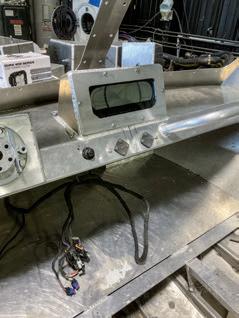
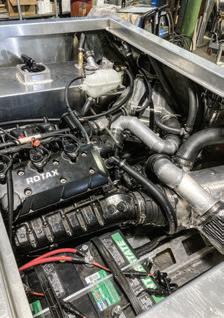


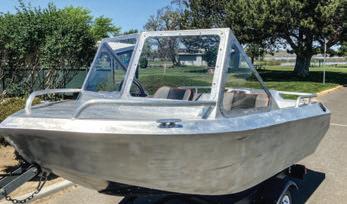

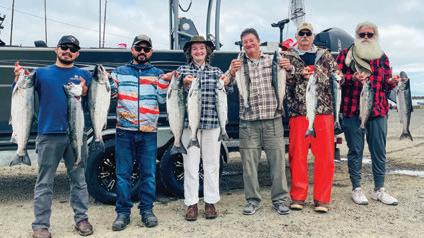


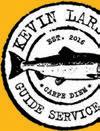

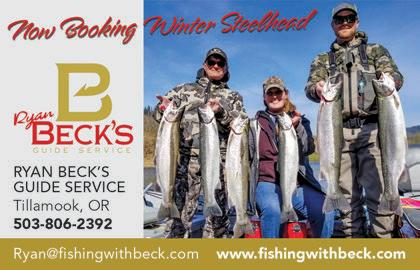

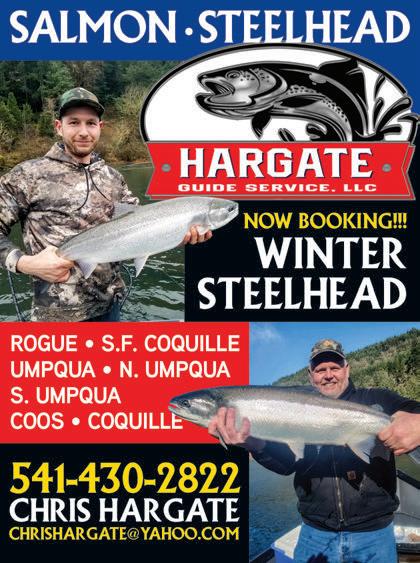
Due to shifting hatchery management and compared to days gone by, it feels like December steelhead are as rare as unicorns. Still, there opportunities to be had for winter-runs beginning this month. (JASON BROOKS)



ecember has traditionally been the month of months for winter hatchery steelhead fishing. Snow or rain falling and filling the rivers with water the color of “steelhead green,” and drift fishing a small cluster of eggs and a Lil’ Corky was the staple of the Pacific Northwest. Now, we can only hope
Dthat there is a season for steelhead. Well, there will of course be a season, but maybe not on the river of your choice. You might have to travel or stay closer to home than you want to, depending on where you live, to catch a winter-run.
By Jason BrooksIt used to be most Washington steelhead anglers would fish their “local waters” throughout the winter – places like Reiter Ponds on the Skykomish, as well as the Stillaguamish, Green, Puyallup and Nisqually Rivers – and venture to the coast
once or twice a year. These days, the latter rivers on the above list have long been abandoned by steelheaders and some have completely closed seasons; other places are now go-tos with coastal rivers on the brink of complete closures and low on wild fish. It is wild fish that determine whether a hatchery fishery can occur and to what extent. The past practice of widely using out-of-basin stocks such as Chambers Creek winter steelhead, which often return earlier than the wild fish that
are more of a springtime run, is long over. The science is right to use in-basin fish for hatchery production. Steelhead are known to wander and stay in the river to spawn, so when a hatchery-raised fish mingles with a wild fish, they are at least from the same bloodlines.
Yet even with true wild returns dwindling, it’s tough to justify not having a fishing season on rivers with overstuffed hatcheries. Take the Wynoochee and Skookumchuck, tributaries of the Chehalis, for example. They see robust hatchery returns yet wild numbers are exceptionally low, so neither river opened last winter. As of this writing, the Chehalis system is expected to again see below-escapement wild runs, so it’s unclear if the Skook and ’Nooch will open for hatchery fish, though state managers at least talking about what it would take to do so this season.
Coastal rivers need some sort of reform and serious talks about harvest by all user groups. That does not help the steelheader decide on where to go this winter, so let us look at some of the options where you can go catch a fish or two.
THE PUGET SOUND region, where steelhead are almost unheard of these days, does actually have a few rivers that you can still head to and try to catch some fish. The Skykomish system comes to mind as one of the most popular and “fishable” rivers, with the famed Reiter Ponds section slated to be open through February 15. The Washington Department of Fish and Wildlife released 50,189 smolts into the Sky for this year’s return, less than half of what was let go for the 2021-22 season. Reiter’s boulder gardens eat up spoons and drift gear, so it is best to float fish this stretch. Either tip a jig with a sand shrimp tail or rig a pink worm wacky style under the float.
The Stillaguamish is also open through January 31, with fishing extended on the section of the North Fork from French Creek to Swede Heaven by Fortson Ponds through mid-February. What anglers might not realize is that the Stilly saw a smolt plant of 108,603 fish for return this winter, the most of any Puget Sound river.

The Nooksack is another river to put on your list to try this year, thanks to a smolt plant of 95,768 for this winter’s return, but
it does not open until January 1 for a short winter season (the regs specifically close the system for hatchery steelhead from October through December). Parts of it are only open for one month, while other stretches are open through February 15. As always, before you go be sure to check WDFW’s pamphlet and the emergency regulations, as these can change daily.
AS MUCH AS I want to venture out to the coast, it might be more of a trip to the farthest reaches of Western Washington and the town of Forks. The Quillayute system, which consists of the Bogachiel, Calawah and Sol Duc, has a heavy planting of fish, and they are known to return early and stay late. WDFW’s 2020 catch card report shows these rivers really do put out steelhead in December. The Bogey reigns as top producer with 275 fish retained, while the Calawah was one shy of an even 100. This means fishing should be good – a relative term when it comes to Washington steelhead in December these days – this month. For most this means hiring a guide, as these rivers eat





up drift boats and can be flooded one day and low the next, thanks to storms rolling off the Pacific and flushing through the relatively short drainages. Those who like to toss spoons will like the crystal clear waters of the coast and its tailouts where steelhead wait to grab Little Cleos, Dardevles and Pixies.
State managers will have the final word early this month, but North Coast rivers should be open for both hatchery and wild steelhead into midwinter, thanks to runs expected well in excess of native broodstock goals.
FOR HATCHERY STEELHEAD, it is hard to beat the lower tributaries of the mighty Columbia, specifically the Cowlitz, but
do not overlook the Kalama, Lewis, Elochoman, Grays and Washougal Rivers. So much has been written, filmed and discussed on the Cowlitz that it seems redundant to add a little more ink, but in times like these, where some of the better rivers on the coast might not even see a season or have an extremely short-lived one, at least we can count on the Cowlitz. It is no secret, but one thing to keep in mind is to know your audience. This means that if you go to Blue Creek, don’t decide to throw a spoon, as you will get yelled at, or worse. Drift fishing is still the staple here, thanks to plentiful bank access that lots of shorebound anglers work. Those with boats will boondog, which is a way to drift fish while floating down the river.
Bobberdoggin’ is also immensely popular now; use a dropper and a single bead while tipping the top hook with cured eggs.
Downstream stretches of the Cowlitz will allow you to try other techniques. For those with a boat it is hard to beat a plug bite. During winter it is nice to put your hands in your pockets, bundle up and stay warm while letting the rod and plug do the work. A bait diver rigged with a sand shrimp or gob of eggs heavily doused in Pro-Cure Anise Oil or Bloody Tuna gel is an easy and fantastic setup for steelhead.
Why should you join the crowds on the Cowlitz? Because of the number of smolts – 595,804 planted at Blue Creek and another 337,877 thrown into the mainstem, making for nearly two-thirds of all winter-runs planted in the Columbia watershed. Crowds might not be fun to fish in, but it is quickly turning into the only way to fish. Just know that with the run shifted to a later-returning in-basin stock, December is a bit early for the lion’s share of the return, but there will in fact be a few fish to chase this month. Looking again at WDFW’s latest catch card report, December 2020 saw 112 fish kept (nearly as many as the Skykomish-SnoqualmieSnohomish system combined that year).

For comparison, March 2021 had 3,150; February, 905. So, if you get the itch to fish for steelhead this month, give the Cowlitz system a try or start tying gear and wait a few months until the run is at its height.
Also keep an eye on WDFW’s trout release stats. If hatchery rivers like the Skookumchuck and Wynoochee aren’t opened, steelhead may be planted in local lakes instead. It’s not like working the rivers, but it’s a chance to catch bigger fish.
With their later-timed runs, Southwest Washington’s Lower Columbia tributaries can make for good latewinter steelheading. Dylan Smith caught this winterrun in early spring 2021. (COAST FISHING PHOTO CONTEST)
WE ALL AGREE something has to be done about the state of steelheading in Western Washington, and I wish I knew the answer. But until we get wild returns to recover, our list of rivers to fish will continue to dwindle. This does not mean giving up; it just means we need to focus on where we can still go, as well as where we cannot. Northwest sportsmen need to realize this is not a “coast versus Puget Sound” issue, but one that we all need to work together on and help produce a solution. NS
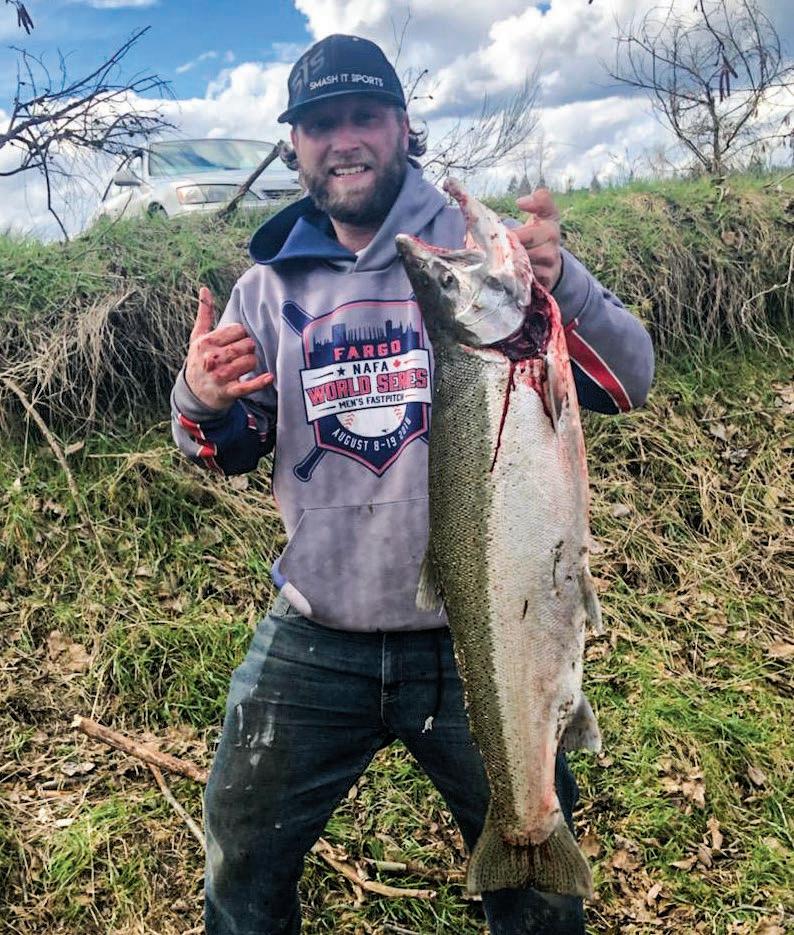

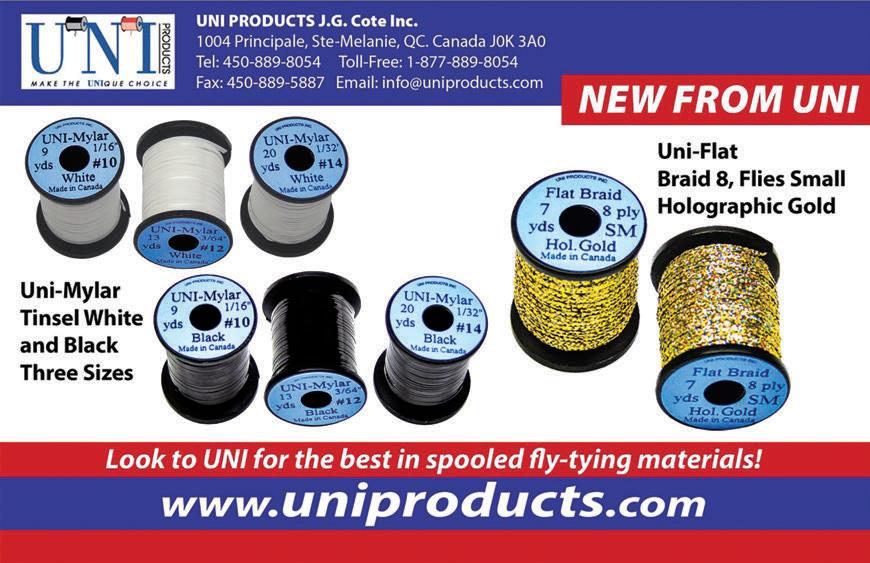






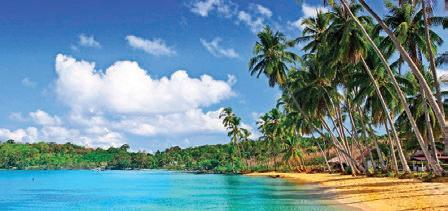
Official predictions from fisheries managers are not out yet, but we can pretty much count on an excellent year in the Pacific in 2023. Nowhere will ocean salmon fishing be better than along the west coast of Vancouver island. All of my best ocean salmon fishing has occurred here and I’ve caught three legitimate tyee-class Chinook, along with scores of other kings, plus coho, chrome chums, and pinks. Salmon funnel tightly along the island’s ocean side due to its close proximity to the continental shelf and the fishing can be amazing. This beautiful Chinook was caught on a flasher and spoon combo off of a Scotty downrigger by a client of Kerry Reed out of Ucluelet. (REEL ADVENTURES SPORTFISHING)
With improved ocean conditions and lots of species to fish for, the time is now to nail down a west coast Vancouver Island expedition.
By Jeff HolmesThis December as we bundle up to head outdoors or as we hide in our houses planning spring and summer fishing trips and
shoving food in our faces, many of our Northwest spring Chinook are preparing to binge eat along Vancouver Island’s west coast before heading south to our waters in spring. This is all long before hordes of anglers

from around the world will descend in summer 2023 on some of the world’s best and most affordable salmon and halibut fishing grounds. As winter progresses, our springers tuck into the five protected sounds of Vancouver
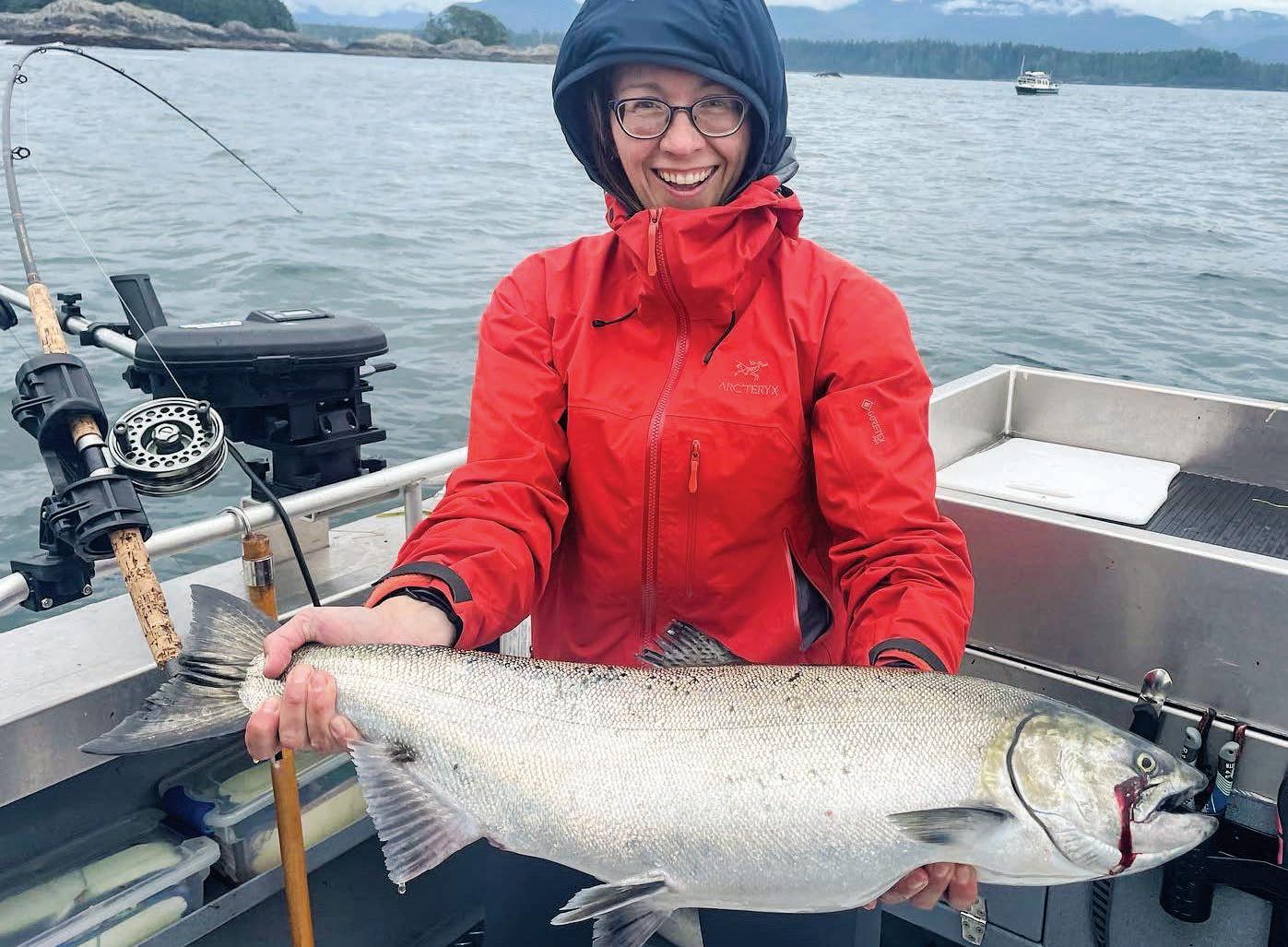
Island’s wild, rugged western coastline to gorge on the herring spawn, adding to the layers of fat for which they’re famous and which they need to survive from spring through early fall in freshwater.
Springers are just a part of the spectacle of fish and wildlife along the island’s west coast, which is featured in an amazing documentary available on Netflix right now. Island of the Sea Wolves is a three-part series following coastal wolves, sea otters, black bears, salmon and more, all narrated by TV’s Will Arnett – think the bad guy on Blades of Glory or the failed magician Job on Arrested Development.
The arrival of big numbers of spring Chinook in the Columbia and our Pacific Northwest coastal rivers marks the very beginning of migratory salmon season along Vancouver Island’s “Salmon Highway.” That’s the funnel-like migration corridor created by the close proximity of the continental shelf to the island’s west coast. In late May comes the first push of big summer kings along the highway. These migratory Chinook
– which Canadians call springs, or tyees when they top 30 pounds – are bound for Canadian and American rivers. With them come swarms of plankton and baitfish, followed by summer-long waves of all five Pacific salmon species. With the ocean again in stellar condition, summer 2023 is likely to offer incredible fishing for salmon, halibut, lingcod, rockfish and even albacore tuna, which showed up in big numbers off the British Columbia coast in 2022.
Planning a summer trip to Vancouver Island’s west coast is a sure way to experience one of the greatest, wildest and most beautiful fisheries in the North Pacific, and at a very favorable exchange rate. Right now, one American dollar is worth $1.25 in Canadian funds. Many lodges will be present at the upcoming sportsmen’s shows (see schedule, page 65), ready to answer questions and book your trip, but you can get a jumpstart now for the most prime bookings.
IF VANCOUVER ISLAND is indeed a salmon highway, then by midsummer it is
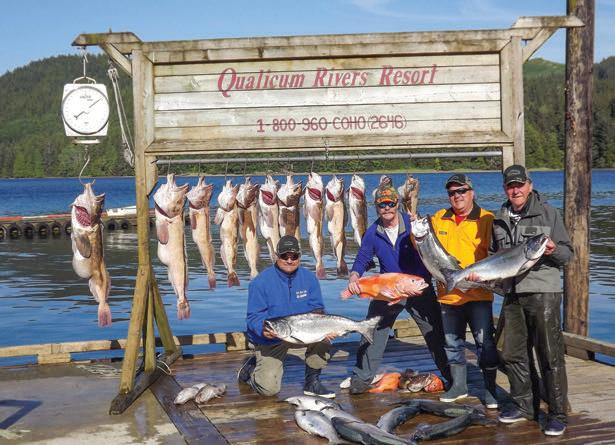
I-5 at rush hour, and salmon are the cars and trucks. Fishing boats are the outgunned highway patrol, but every cop makes his quota as more speeders streak past, gobbling baitfish, squid and shrimp as they go. Also available within a day of the American Northwest is excellent halibut angling all summer. Halibut limits are the rule, giant lings and yelloweye rockfish abound, and I have had 50-salmon days out on the ocean and caught my only three true 30-plus-pound kings. I have watched hordes of coho compete to bite the yellow tips of a Scotty downrigger release clip, had 20-pound giant pacific octopuses grab hold of rockfish as they’re reeled up, and have watched lings and halibut throw up all manner of large prey on boat decks.
Amazing salmon and halibut fishing – along with great lingcod and rockfishing – are reason enough to visit Vancouver Island, but the wildness, wildlife and cool travel experience combine to make a visit one of the Cadillac outdoor trips for Northwest sportsmen. The drive alone features a beautiful ferry ride and the island’s gorgeous mountains, rivers and lakes, as well as an opportunity to visit another country full of mostly very happy and nice people. With few exceptions –Nickelback, Alanis and the Toronto Blue Jays – I love Canadians and Canada and look forward to a couple trips a year.
The Pacific is teeming with life right now, and fishing should be once again be truly excellent. Summer 2023 may be the best time in many years to make the trip north, andnow, not later, is the time to plan. The exchange rate is mightily in our favor, making trips very affordable, and Covid restrictions are a thing of the past (hopefully). The exchange rate means very good things for us when we travel north and presents a not-so-good scenario for our friends from the north coming south. And with gas prices high, Vancouver Island is a relatively close destination for drivers. When the exchange tilts in
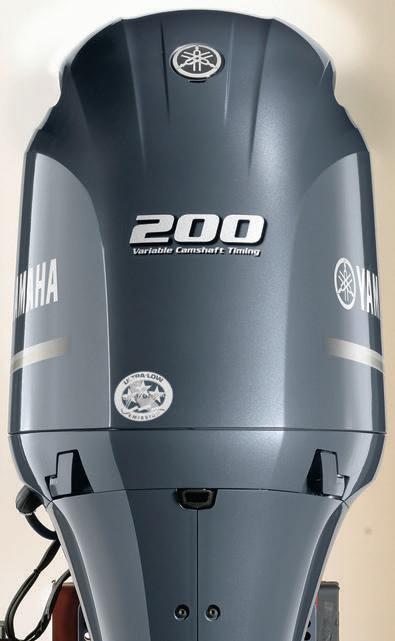



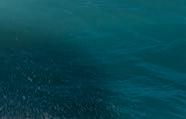
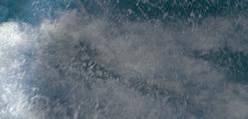
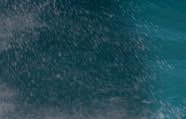



our favor, Canadian fishing operators want American dollars even more. This makes private fishing charters even more affordable, as well as lodge stays. It’s way cheaper than Alaska and way closer to home with comparable or better fishing.
Canada’s charter model is not so much like America’s. Almost all boats are privately chartered, making for a more intimate and enjoyable experience in most cases. When you compare the costs of an Alaskan or Queen Charlottes trip with a Vancouver Island fishing vacation, there is no comparison, yet there certainly is between the fishing experiences.

Many Vancouver Island trips result in bigger trophies and bigger bags of ocean fish for the freezer than more expensive trips to the north. That isn’t to say there aren’t unmatched opportunities further north in Canada and in parts of Alaska, but for convenience, cost and extremely high quality combined, nothing beats the west coast of this 300-mile-long island. For those like me who like to
drive and stay somewhat in control of their own travel, all of the island can be reached in a long day’s travel from just about anywhere in the Northwest.
From north to south, remote to popular, Vancouver Island’s protected sounds are as follows: Quatsino, Kyuquot, Nootka (Esperanza Inlet), Clayoquot and Barkley. I’ve fished them all, and each offers amazing fishing and wildlife viewing, but the further north you go, the higher the cost and quality of experience.
That said, the best day of salmon fishing I’ve ever enjoyed occurred in the furthest south port, Ucluelet, with Kerry Reed of Reel Adventures Sportfishing (reeladventuresfishing .com). We released 50 salmon for two rods and kept limits of Chinook, coho and halibut. But literally the whole west coast is excellent. Here’s a brief overview of its five protected sounds and Port Hardy, the furthest north post on the island and another good option.
Port Hardy is by far the biggest outpost on the north coast, and despite
the crowds the fishing here can be excellent for halibut and bottomfish and is a slam dunk for salmon throughout the summer. Home to a BC Ferries terminal and the road to famed Quatsino Sound, the harbor has a large marina with full services including plenty of lodging and restaurants.
I recommend a trip to “Hardy,” as the locals call it, despite the five sounds on the West Coast offering better halibut and lingcod fishing. I’ve stayed at plenty of places here and have seen black bears and the town’s 200-plus bald eagles all over the place. By far the best stay I’ve had was at The Orange Tabby B&B, where I once bent over to look at a baby in a stroller and instead was shocked to see a disabled pug that a bald eagle had paralyzed by trying to grab and eat it.
Ugliest baby I ever saw.
I recommend either Leisure Suit Charters or Chad’s Coastwide Sports Fishing Charters, but there are other great operators here, too.
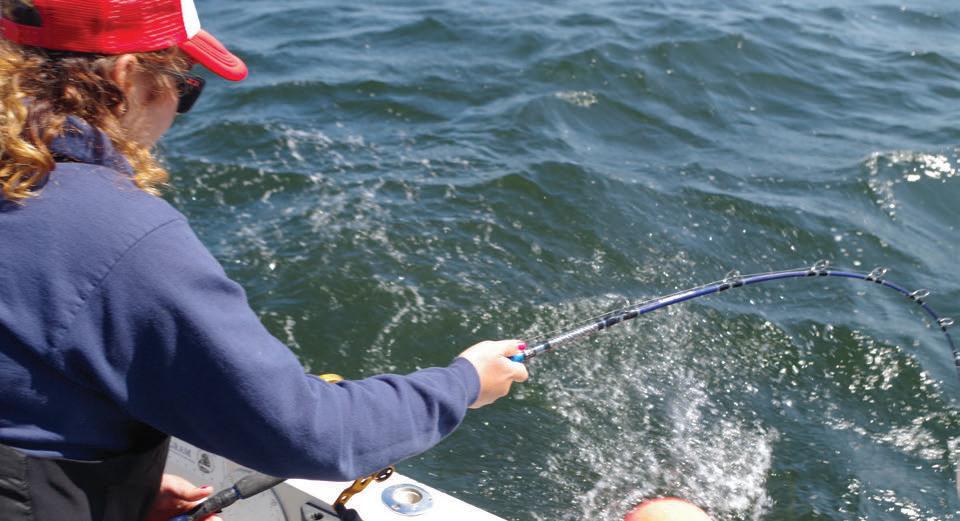
Quatsino is the furthest north


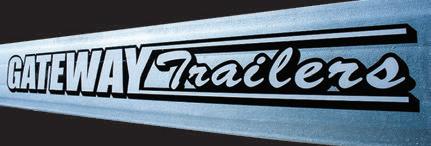


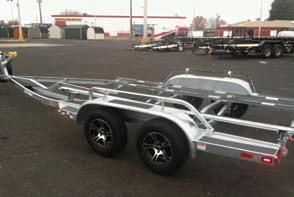
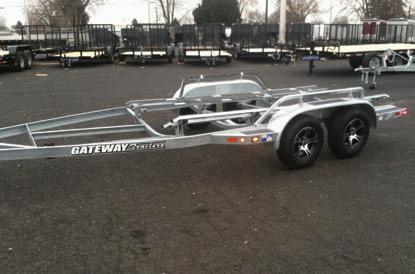
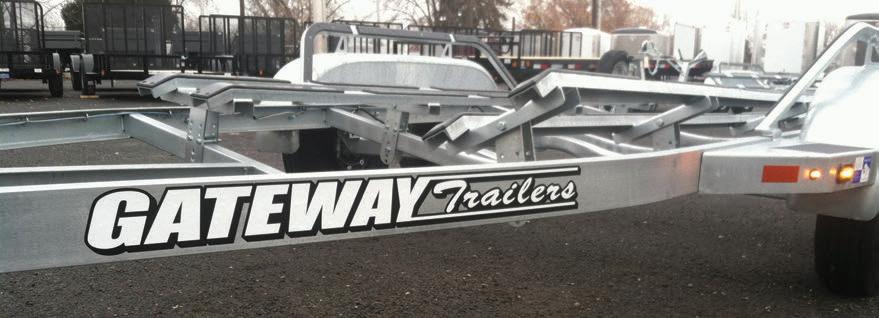
sound on the island, and home to the greatest ocean fishing I’ve ever experienced. Famed Winter Harbour (20 residents) is a long, packed-dirtroad drive from Port Hardy, which is a long haul from anywhere in the Northwest, but I’ve made it in a day from Tri-Cities several times.
Winter Harbour offers amazingly close proximity to the ocean and excellent reefs with productive protected water for inevitable rough days on the open ocean. Halibut, salmon, lingcod and yelloweye rockfish abound here in large sizes. I’ve also brought home very large and delicious octopuses and have enjoyed
wildlife spectacles from land and sea of bears, eagles, otters, many marine mammals and more. The landscape is also crawling with cougars and wolves, which are seen pretty often. There is a post office where you can buy and drink liquor out of the bottle, or mail a package.
By far the coolest and nicest lodge I’ve ever stayed at in my life is Qualicum Rivers Winter Harbour Fishing Lodge (qualicumrivers.com), which is home to great and experienced guides, custom 26-foot ocean-fishing boats, dock space to bring your own boats, and clean and comfortable accommodations and really excellent food. Scarcely 15
minutes from the open ocean, it’s an amazing experience and has led to the biggest loads of ocean fish of my life. A trip to Quatsino from late June through August will result in lifelong memories.

Kyuquot (Kai-oo-cut) is just to the south of Quatsino on the far north end of the island and is accessed via boat from the town of Fair Harbour, or by seaplane. Kyuquot is very remote and much less pressured than sounds to the south and offered me one of the greatest wildlife spectacles I’ve ever seen, and I’ve sought them out my whole life.
The fishing wasn’t bad either; in fact, it was amazing. In my one trip to Kyuquot and Rugged Point Lodge (ruggedpointlodge.com), I went home with coolers full of big halibut, lings, kings, coho and rockfish. But it was the hundreds of sea otters, the three species of whales including orcas hunting sea lions, the bears, and the tracks of cougar and wolves I remember most.
Operators here fish some of the same water that Quatsino skippers fish, and these grounds are very close to the continental shelf. I highly recommend the experience at Rugged Point Lodge, which is on a small island just five minutes from the open ocean fishing grounds. They boast a proven albacore fishing program with top-end Okuma tuna tackle. Across the bay from Rugged Point is the First Nations village of Kyuquot, which also is home to fishing operators.
The fishing lodges in Nootka and nearby Esperanza Inlet offer the closest access to the shelf of any fishing port on the western Pacific. This is the tightest part of the salmon highway funnel and is world famous for big kings and coho and only slightly less well known for its halibut, lings and rockfish.
From the town of Tahsis, I’ve accessed a floating lodge here that I wouldn’t recommend again (a rarity), but the scenery and overall


outdoor experience still made my trip a great time. Indeed, I plan to return this summer and access Nootka out of the town of Zeballos. I’ll fish with Reel Obsession Sport Fishing (reelobsession.ca), a very highly reviewed and recommended outfit. Whatever lodge you stay at, fishing the ocean off of Nootka Sound means the continental shelf is 17 miles offshore, funneling salmon as tight as they get and easily availing tuna in late summer. For comparison, the shelf is about 40 miles off most of the Washington Coast.
Like Kyuquot and Quatsino to the north, wildlife abounds here. Like everywhere on the northwest coast of Vancouver Island, there are sea otters, sea lions and seals, whales and black bears everywhere. In fact, a black bear tore open my poorly stashed dry bag with my lunch in it during a hike on a closed logging road covered in wolf and cougar scat. Nootka Sound
is popular with Americans bringing their own boats, and both Tahsis and Zeballos offer marina services.










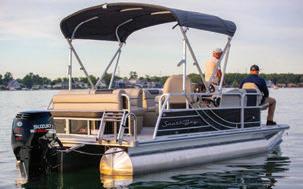
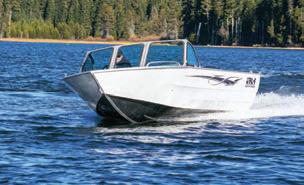
Located almost dead center in the middle of the island’s west coast, Tofino to the north and Ucluelet to the south are just 25 miles apart and represent gateway communities and marinas to Clayoquot and Barkley Sounds, respectively. I’ve fished both and had great times, but the towns differ mightily in cost and demographics.
Tofino is a hip community that attracts artistic types, surfers and more monied folk – along with plenty of fishermen looking to access offshore grounds and the protected waters of Clayoquot Sound. Its lodging and restaurants are very nice if not spendy, and it could represent an ideal location to bring a spouse for a classy getaway interspersed with gaffing and bleeding ocean fish.
More my speed, Ucluelet is a really cool little town with an excellent campground within walking distance of the marina. It has lots of lodging and good restaurants and plenty of charter operators. I’ve spent a few days on the ocean here with friend and aforementioned guide Kerry Reed. He’s been fishing Ucluelet for almost 20 years and spends all his summers here despite being headquartered on Kootenay Lake, in BC’s beautiful West Kootenays region. I give him my highest recommendation and have had some amazing fishing here for all species, but especially for halibut, kings and coho. On days when the Pacific is too rough to fish famed Long Beach and Big Bank in the open ocean, which of course happens, Reed and other Ucluelet charters target the protected waters of Barkley Sound, which offers excellent salmon fishing and even some halibut action. NS
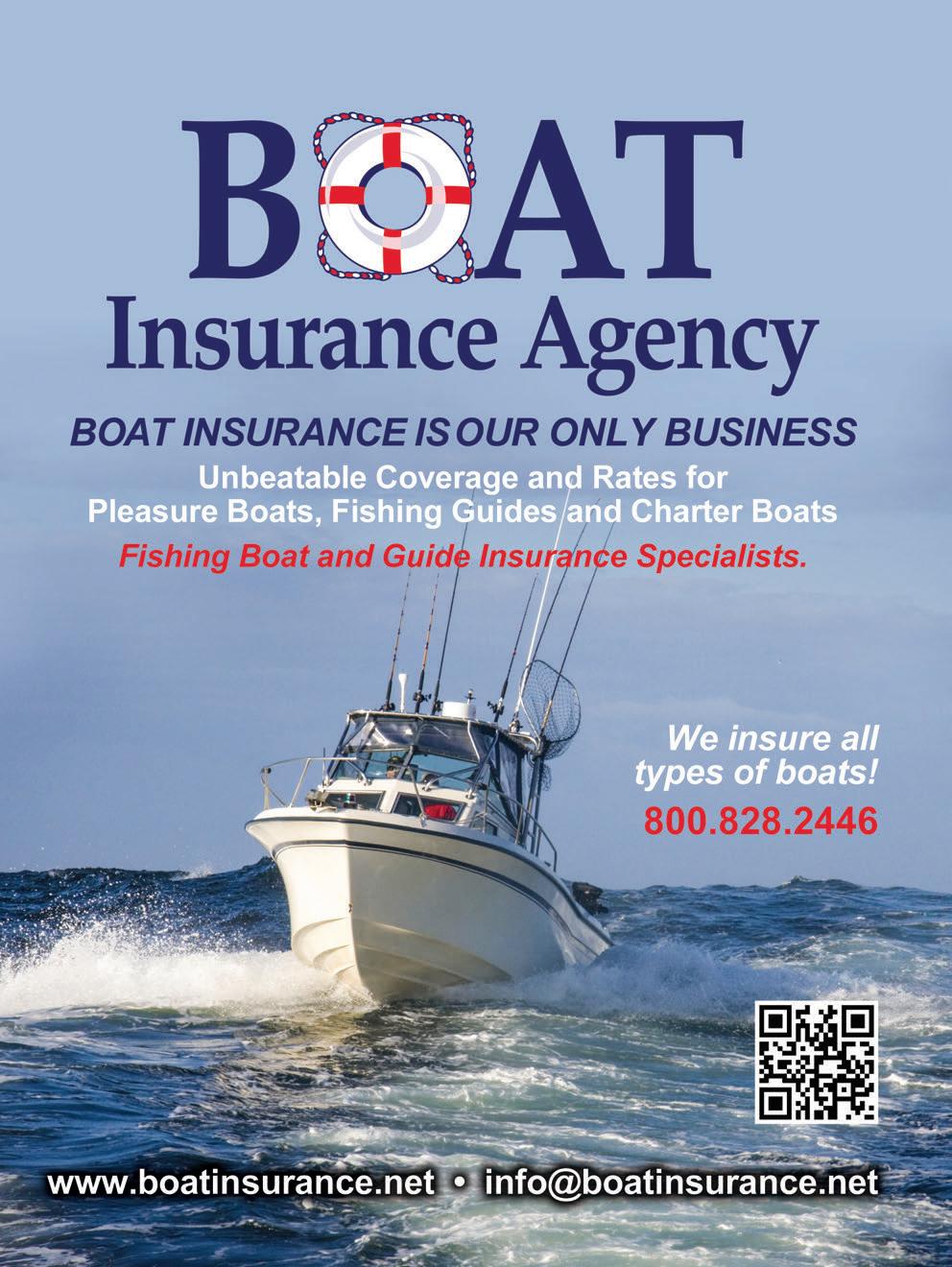










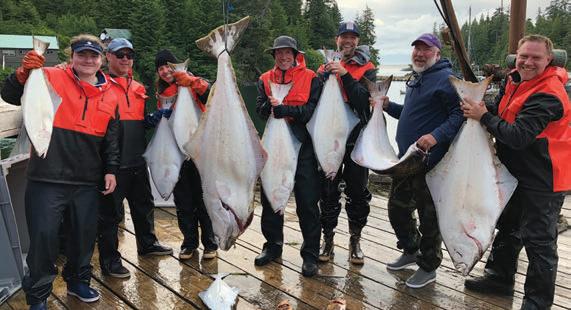

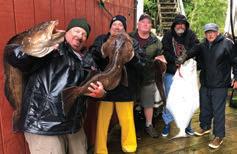





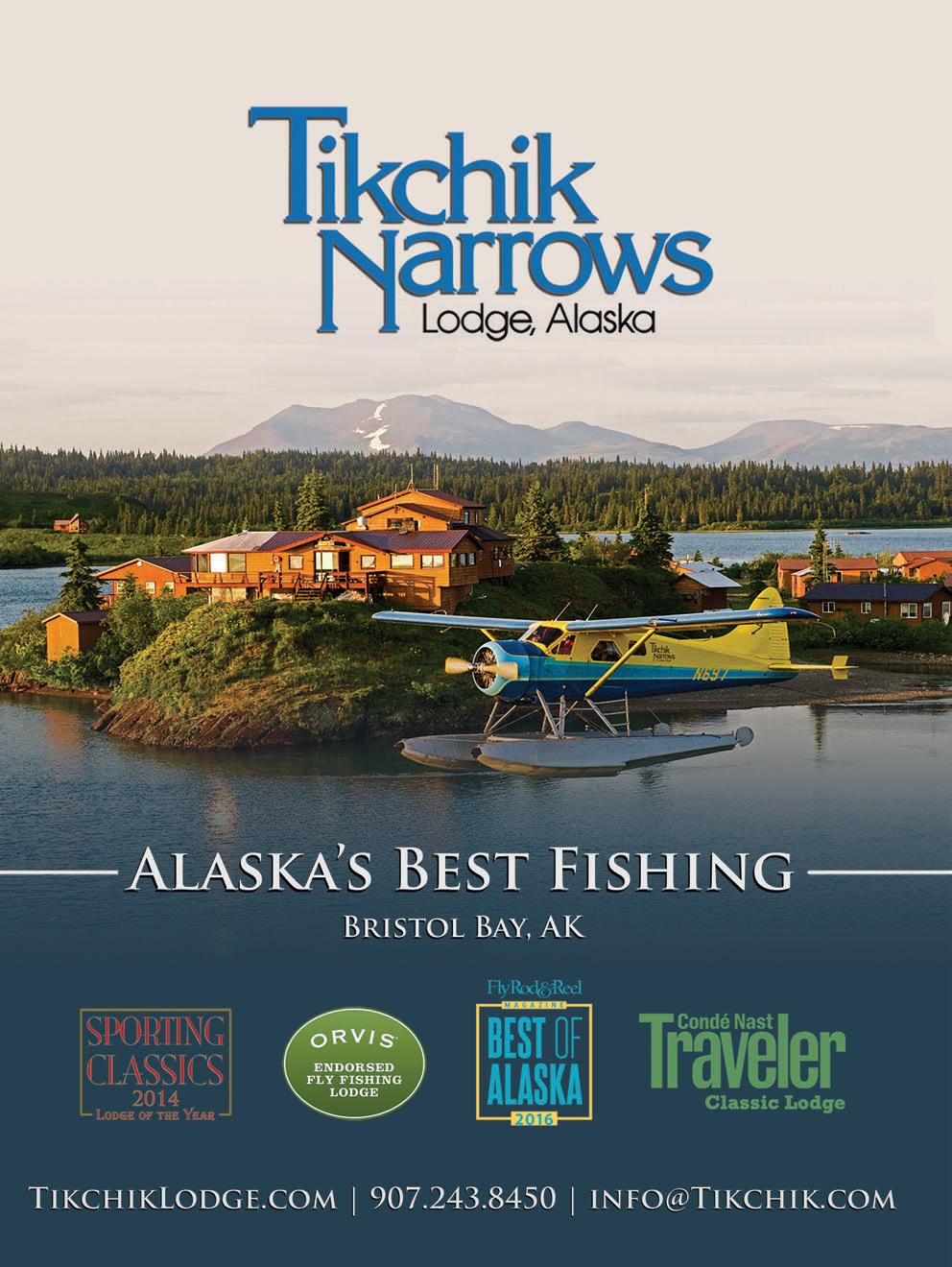




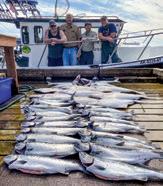


Our remote Alaskan fishing lodge is situated on the upper stretches of the beautiful Egegik River. You’ll watch some of Alaska’s most stunning sunrises, complete with a distant, active volcano. We are a fishing camp specializing in coho fishing, brown bear viewing, and flyout fishing adventures to even more remote destinations in the Last Frontier.

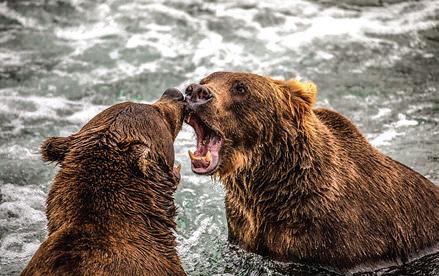


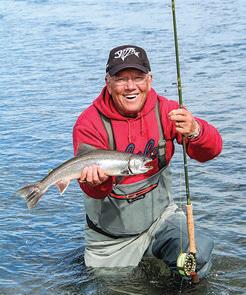
The Egegik River is touted by many experienced anglers as the best silver salmon stream in all of Alaska. Becharof Lodge On The Egegik River was the first fishing lodge to become established on the breathtaking Egegik River, and is less than a 5 minute boat ride from some of the best fishing holes on the entire river.
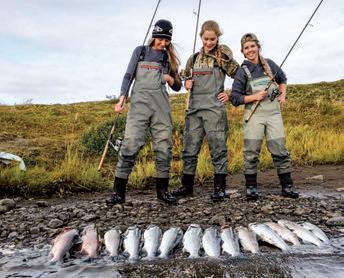


Included in your fishing trip:
• 5 days fishing/5 nights stay in camp
• Experienced, fully guided fishing.
• Comfortable cabins furnished with beds, cozy comforters & bedding.
• Home cooked meals, snacks, and nonalcoholic beverages.
• Transportation from the lodge to prime fishing holes on the Egegik River.
• Freezing and vacuum sealing of your fish, up to 50 lbs., per angler.

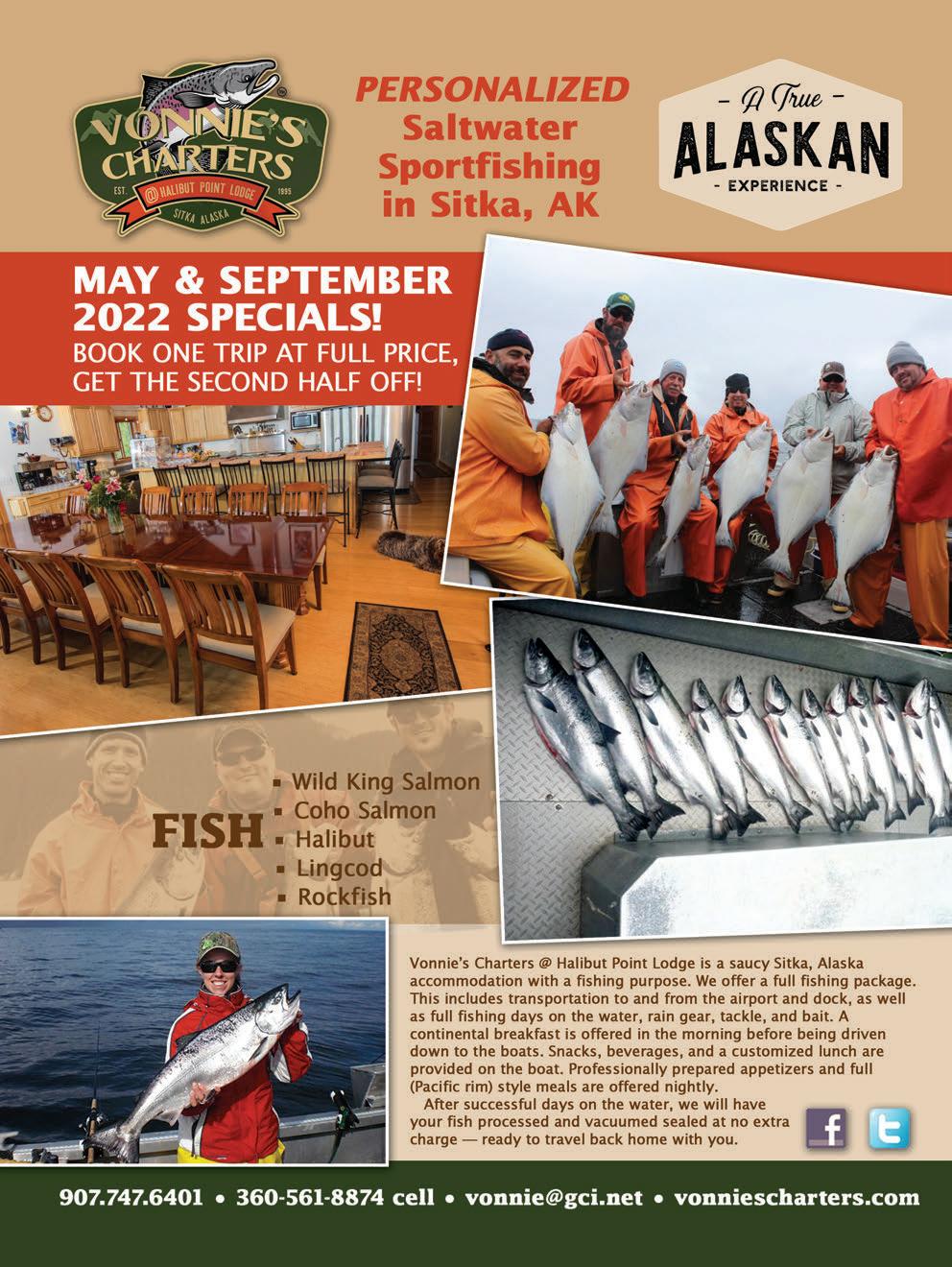






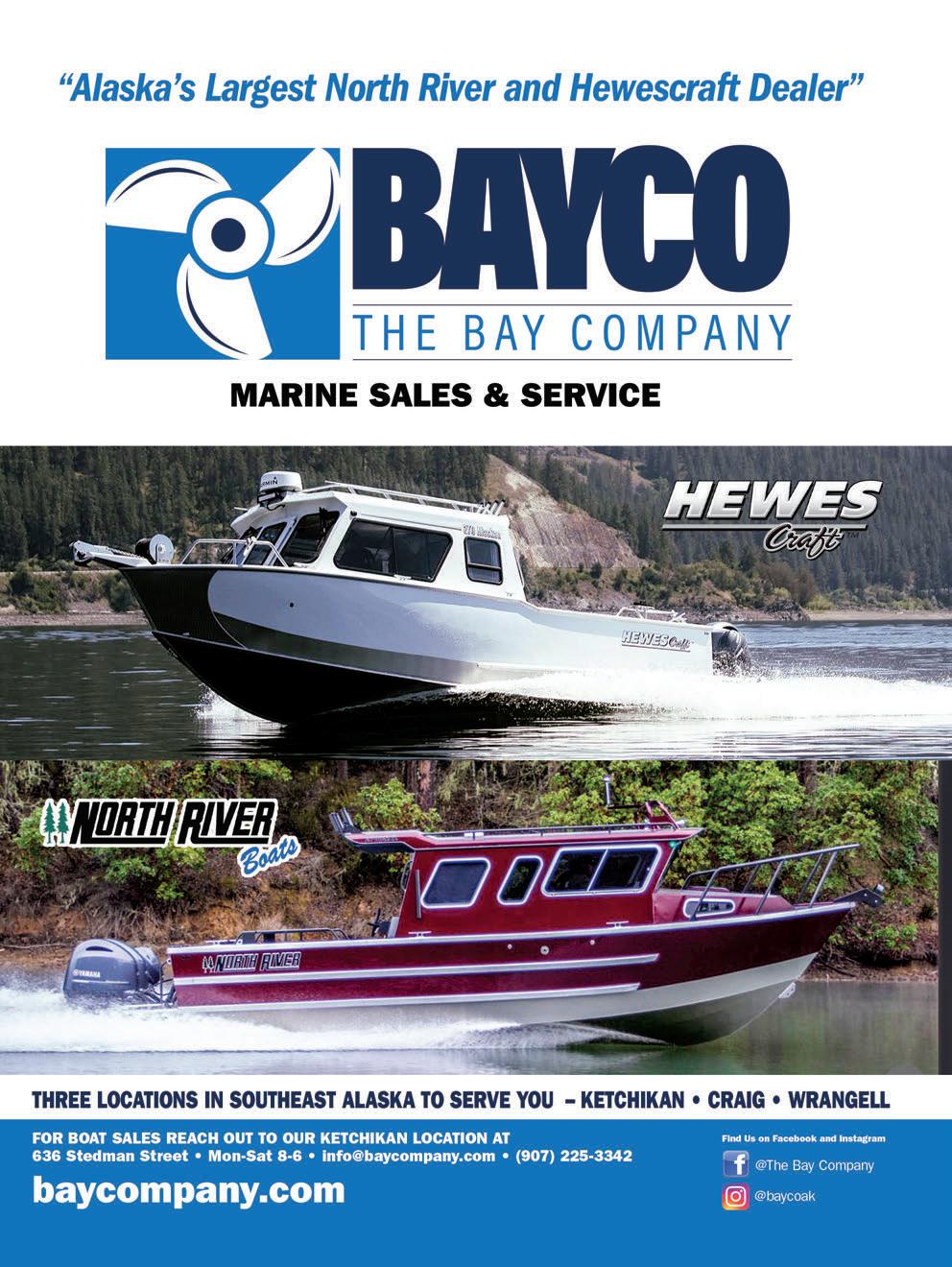

It’s not easy hunting these fastflying birds as they spring off cliffs and fly across large expanses of open canyon country. Chukar, that is. Bird dogs make the rugged terrain
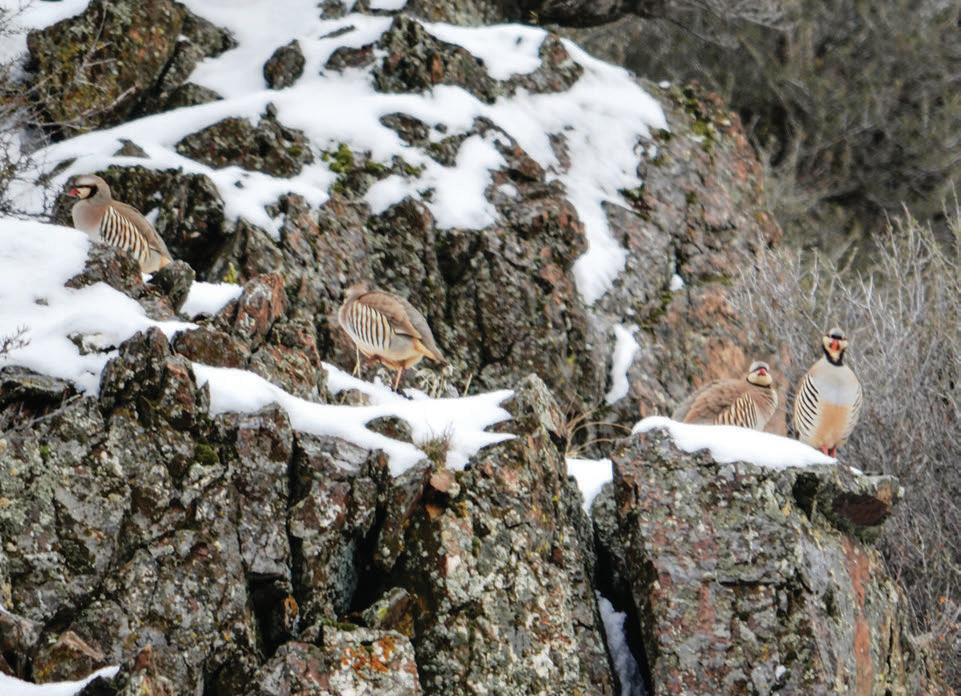
look easy to cover, but it’s a real workout for us aged folks in blaze orange. But that’s one of the many reasons these birds are such a prized quarry and make for some of the toughest bird hunting in the West. My German shorthair Porter likes to
make sure and wear me out on our trips east of Oregon’s Cascades to chase these amazing birds. Finding wild flocks isn’t as easy as it used to be, but we always manage to run into a few coveys. The hills seem steeper than they were 20 years ago, when recovering from long
hunts came much faster than it does today. But Porter’s first wild birds as a youngster were these Asian partridges and we still manage to make a few trips to chukar country each season.
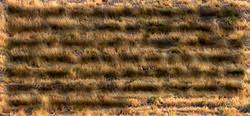
The frosty morning led us from a watering trough up a grassy hill towards some small rock outcroppings. The dogs’ noses were catching wind currents and the scent of birds, and their tails told the tale that we were getting close. The breeze was in their faces, which was perfect. Porter lifted his head and paused for a moment as his trot slowed to a walk.
“There they are – point; he’s on point,” I hollered. With our guns readied we slowly converged on the thick grass above the rocks. Hunt these birds enough and you come to realize that they will move and oftentimes be several yards in front of the dog. Focusing about 30 yards to the front, I saw the grass move as the first birds flushed, followed by several more.
Shots rang out across the grassy hill as the familiar smell of gunpowder filled the air. We managed to knock down a handful from the covey of about 15 birds. It was nice to have a few birds in hand for dinner. Plus, it just feels better when there is a little weight in your bird vest. By this time sweat was dripping down my face and soaking my undershirt; by the end of the day a few layers would be shed. It was cold, 28 degrees, but the uphill climbs quickly warmed us all.
We found two more small coveys, which produced a pair of birds and even a Hungarian partridge. The dogs were finally tiring and their feet were becoming sore. I like to pay close attention to their feet during these hunts because some of the rocks can occasionally tear pads. Depending on the location we will be hunting that day, I may have my dog wear booties.
With snow and cold weather the birds will tend to hold a bit more. This is nice, though how much ground you have to cover to find them can entail
Where quail and pheasant hunting are typically focused closer to farms and gentle valleys, the pursuit of chukars leads to Oregon’s outback and basalt breaks, making them one of the toughest birds to hunt. Focus on where the flocks can find water and habitat that provides fresh seeds and insects. (TROY RODAKOWSKI)
twice as much work. Keeping up with an energetic bird dog isn’t quite as easy either. Marking on a GPS or onX map where you previously found coveys will help once the weather takes a turn for the worse. Keep in mind that the birds will be found in good cover out of the wind and snow on southern slopes or sheltered draws.
Chukars were introduced from Pakistan to America as early as 1893, with more releases between 1931 and 1970. Oregon’s birds were stocked in 1951 and they came from India. Chukar are now thriving across the
West, with huntable populations in most states. Oregon provides some great habitat. The rolling hills and sage rock outcroppings provide excellent nesting, good cover and forage.
Of course, our recent drought conditions have hampered brood success and population growth. During the past few seasons, I have focused on locations that have water during the early fall. Topography with wells, windmill irrigation and springs are where we like to focus our hunting efforts. Chukar, as do all upland game, need good water sources for survival. Finding where birds will come for water will help put you in places with
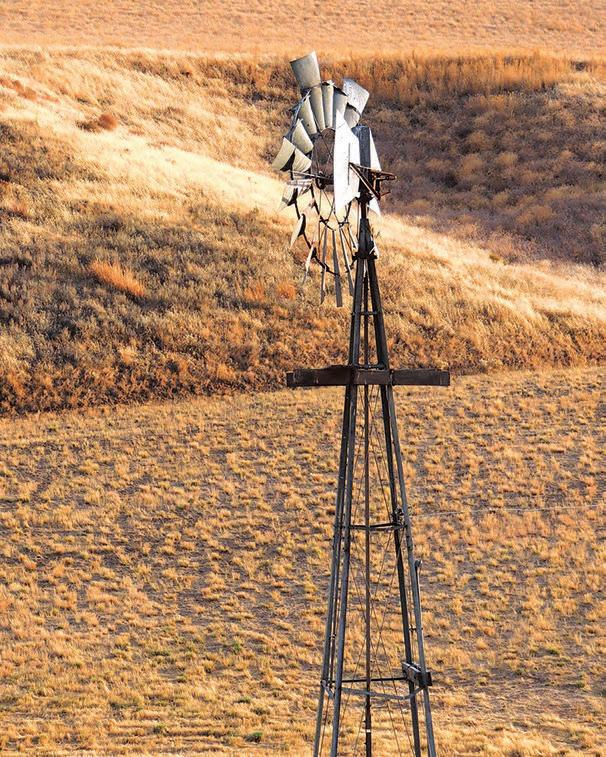

healthy bird populations.
These birds run up steep grades like they’re mountain goats and they’ve been known to be called “the devil bird” by many hunters. I remember the first time I hunted them thinking to myself that I’d never do it again. Of course, I was young and over time I learned to love the challenge and exercise, at least to a certain degree.
Chukar feed on an abundance of seeds and insects, one of their favorites being Canada thistle. The eastern quarter of Oregon and portions of eastern Columbia Gorge tributaries like the Deschutes and John Day provide the main home range for these birds. They have been slowly expanding, though loss of habitat has slowed the pace in most cases. Recent fires that will ultimately be beneficial in the long run have caused a temporary slowdown. Audubon forecasts that in the decades ahead chukar will gain ground at
higher elevations in the Wallowas and western Blue Mountains.
For me, the drive to chukar country takes nearly six hours. We have hunted around Burns for several seasons and had some great success. Other places between Vale and Juntura also have some good quality birds and there are a few public access points along the way.
Up toward Ontario you can also find some good access on private lands, as well as public access onto some Conservation Reserve Program ground. In the gorge between Heppner and Hermiston there are many acres of CRP that can be accessed and we have done very well in the past here. The Jordan Valley has several access points along the Owyhee River, including Bureau of Land Management parcels and additional CRP. There are also well over 250,000 CRP acres signed up in the Mid-
Columbia region that comprise both public and private access.
Per the Oregon Department of Fish and Wildlife’s upland bird forecast, an “above average year” was expected overall during the 202223 chukar season. ODFW reported “strong populations” in the Baker County stretch of the Snake, “greatly improved” numbers compared to the past two falls in the Malheur District, and “strong chukar production” in the John Day and Deschutes canyonlands. The only question was whether down numbers reported in the Harney District were legit, as agency biologists felt populations were actually better than that. For more specifics, see myodfw .com/game-bird-hunting. Season runs through January 31, 2023.
In 2020 there were 33,241 chukar harvested in Eastern Oregon, the most since 2015. From 2001-2006, Oregon saw harvests of over 100,000 each season.


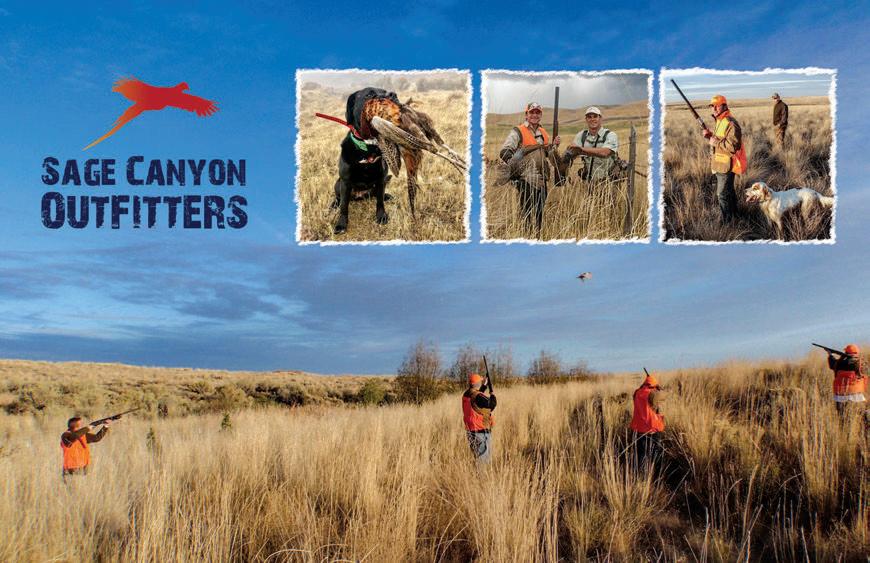



The reward for bagging a few redlegs? They’re “one of the tastiest upland birds around,” says author Troy Rodakowski, who prefers to grill them dove popper style – wrapped in bacon, jalapeño peppers and cream cheese. (TROY RODAKOWSKI)
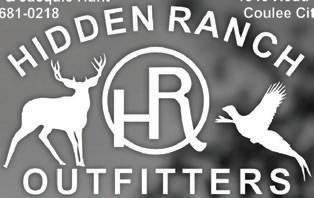





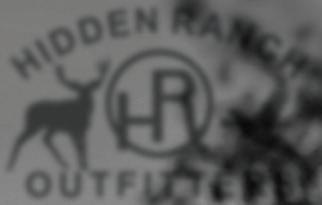

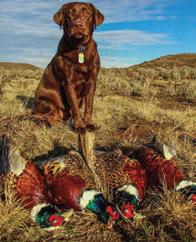

GET OUT THERE!
Regardless of all the sweat and achy muscles these birds can create, they present a great challenge to any new or seasoned bird hunter. Devil birds are well worth the chase, with the ultimate reward being a full vest and a tired dog at day’s end, not to mention they are one of the tastiest upland birds around. There are many different options for cooking them –on the grill, over an open flame or in the oven. One of my favorites, of course, involves jalapeño peppers, bacon and cream cheese, all washed down by an ice-cold beverage.
Just know that this time of year you’ll want to go prepared for drastic weather changes and extreme temperatures. Prepare your vehicle with that in mind and make sure to pack plenty of clothing and fresh changes of socks. Take high energy food and fresh water for both yourself and your hounds, and you should be good to go. NS



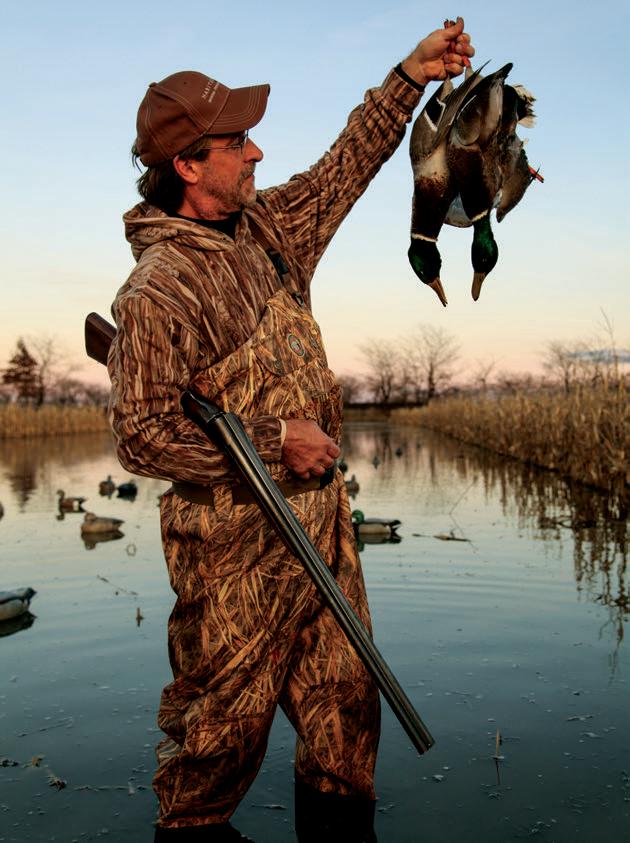
and January ducks and geese are progressively harder to fool, but these sharpies’ tactics will yield late-season success.
By MD JohnsonThis month, I’m not going to dilly-dally around with long-winded introductions, anecdotes from duck and goose hunting days of yore, or any other blah, blah, blah. No, sir, we’re diving right into fooling late-season ’fowl. What I’ve done is ask some of the best in the business for their advice on what to do as the season winds down –sad face emoji! – this month and next, and the birds, those that aren’t living in someone’s freezer at the moment, seem to get tougher by the day. Here’s what these fellows had to say:
BILL SAUNDERS, owner, Bill Saunders Calls and Gear; Big Guns Waterfowl Outfitters Saunders is the real deal – outfitter; legendary call designer/maker; former competitive caller with over 30 state, regional and national goose calling titles. He knows what he’s doing, and he does it right here in the Northwest. Day after day after day.
“During the late season, make sure your decoys are in tip-top shape. Quick wash, touch-up paint –or just get new ones. Late-season birds are in their prime coloration, and old dingy decoys don’t represent late-season birds’ vibrant colors. And do something different. Change your spread. Step off the beaten path. Target smaller isolated pockets of water. Something different.”
WORTH MATHEWSON, book author; Wildfowl field editor for 17 years; Delta field editor
Mathewson is the author of Big December Canvasbacks, among other
The dim days of winter can be tough on duck and goose hunters’ success, as the birds have wised up, requiring waterfowlers to adjust their tactics. (JULIA JOHNSON)
If you remember, I wrote a piece last issue spotlighting what waterfowl hunters might expect to see during the 2022-23 season. One of my sources, as he is each year, was Brandon Reishus, the migratory bird coordinator for the Oregon Department of Fish and Wildlife.
As our conversation back in October wound down, Reishus asked if I’d entertain the thought of serving as one of the judges for his state’s annual conservation stamp artwork competition; that is, their waterfowl, upland game bird and habitat conservation stamps. Both honored and flattered that he would ask, I said I’d be happy to help. I mean, how tough could this be?
Oh, I knew exactly how challenging the task Reishus asked of me could be, having served in a similar capacity some 15 years ago for the Iowa Department of Natural Resources. Determining – or rather, helping determine – the very best from among entries I’d describe as “excellent,” “excellent,” and “excellent” is difficult. Extremely difficult.
However, I welcomed the opportunity, and on November 4 I found myself at ODFW field headquarters in Salem. I was greeted by Mikal Cline, ODFW game bird coordinator and a talented biologist who
formerly served with the National Wild Turkey Federation. I’d worked via telephone with Kline several times over the past half a dozen years but we’d never met. Thirty seconds in, I thought the day was a win for me already. Also there to make me welcome was Kelly Walton, ODFW assistant game bird biologist; Emily VanWyk, conservation strategy species coordinator; and Roxann Borish, a wonderfully pleasant lady and wearer of multitudinous hats, including that of the agency’s rules coordinator and overseer of all things falconry.
In front of me and arranged about the room were 71 incredible works of art. Entries for 2022 had been submitted by folks from around the nation and in three categories – waterfowl, upland game bird, and habitat conservation. The subject upon which


all artists would focus for the waterfowl category was the greater scaup. For upland birds, the mountain quail. And for the habitat conservation work, the subject could be any one of the 294 species – plants, birds, animals, invertebrates, fish, reptiles, amphibians – listed as part of ODFW’s Conservation Strategy (oregonconservationstrategy.org/ ocs-strategy-species), Chinook to Columbia Gorge caddisflies, Rocky Mountain bighorns to Willamette daisies.
My fellow judges were an impressive and talented lot consisting of Buck Spencer, a wildlife artist from Junction City; Rich Anglin, retired ODFW Wildlife Division administrator; Dr. Leslie King, Fish and Wildlife Commission member; and Jen Davis, regional director for the Oregonbased American Bird Conservancy.
Selecting top stamps was simple.
1) We were given five poker chips, and instructed to choose our “top five” from each category based on, obviously, those we deemed most outstanding. I, as I believe were my fellow judges, was looking at overall composition. Essentially, did the work catch my eye, appear true to life, and make me stop and say “Wow!” under my breath? Most did, and therein lies the challenge.


2) With round 1 compete, the administrators for the competition pulled those five works receiving the most poker chips, i.e. “votes,” and brought those to the forefront. These five, then, were judged on a scale of 1 (low) to 10 (high) using specific criteria, including artistic composition; anatomical accuracy; general rendering; habitat accuracy; and general appeal.
3) Once those numbers were compiled,












the three entries in each category with the highest total were then ranked first, second and third place.
Easy? Oh, the process is elemental; however, at least for me, choosing between the aforementioned “excellent No. 1, 2 and 3” was the tough part. Eventually, though, the winning entries were determined.
Waterfowl: Frank Dolphens of Omaha, Nebraska – greater scaup
Upland Game Bird: Marissa Gibson of Springfield, Oregon – mountain quail Habitat Conservation: Chris Goins of titles. His name is in the who’s who of legendary waterfowl hunters; fact is, he may be the who’s who. Old sideby-sides, black brant, one-at-a-time ducks over decoys – they’re his go-to.
“I reduce the number of decoys I’m setting, and I don’t use the hail call. Or at times don’t call at all. If I do call, I’ll only use a single short quack. And don’t overdo that.”
SEAN MANN, world and Champion of Champions goose caller; 51 years of
Sheridan, Arkansas – western gray squirrel Artists receive a $2,000 monetary award for their winning work. Winning artwork in each category is reproduced on stamps, an offshoot of ODFW’s validation requirement for those hunting migratory waterfowl or upland birds, with the exception of the Habitat Conservation Stamp, which is not required for any outdoor activity, but is a means by which the state agency raises money, with the help of the general public, for native fish and wildlife conservation programs. Monies raised by the sale of all
Mann created The Eastern Shoreman goose call – it’s not a flute! – in 1985, and the goose calling world hasn’t been the same since.
“Late December/early January, and birds that haven’t pair-bonded begin to do so. Much like human teenagers, they can be very shy and not very vocal. If you’ve ever seen a pair of geese flying toward your spread in silence, blown your call at them and watched them slide off, chances are they’re playing
three stamps helps provide funding for ODFW-conducted research, surveys and habitat improvement.
As an aside, I must have chosen well –yes, a pat on my own back! – and exhibited a reasonably skilled eye at judging artistic talent, as the first-place winners in each category were among my personal top two when everything was said and done. Will I be painting a stamp for the competition any time soon? That’s a negative, but I wouldn’t mind being asked back to judge entries. Hint, hint, ODFW? –MDJ
the ‘dating game.’ I call very little after Christmas, but the flag is always in my hand. That square black flag is your best friend at this time of year.”
TONY VANDEMORE, coowner, Habitat Flats (Sumner, Missouri; eastern Saskatchewan)
If you’re a duck hunter and you don’t know this name and the ’fowlers’ paradise known as Habitat Flats in central Missouri, well, you need to get out more. Vandemore is undeniably one of the best in the business.



“When it’s cold, knowing when to hunt puts more birds in your bag. When it gets down below 20 degrees at night, (our) birds typically wait until midday or early afternoon to move. Snow, and they move early. I see a lot of hunters go out before daylight and get cold while waiting for the birds to fly. They assume nothing’s happening, pack up, and head in before the flight even starts. If you’re hunting nonmoving water that the birds themselves are keeping open, it’s important to wait until it warms even a bit. Go in before daylight and kick them out, and there’s a good chance that water will freeze before the birds start flying again midday.”
RYAN CHELIUS, editor, Field & Stream MagazineEven as you’re reading this, Chelius and I are spending mornings near the Washington Coast chasing ducks, the young man’s first sojourn to the Northwest. He has a dozen years of ’fowling under his wader belt, with much more to come, he assures me.
“Your concealment will make or break (your hunt) at any time of the year, but especially during the late season. You might be able to get away with a poor hide during the early
season, but not now. The birds are extremely wary now, and (if you’re not hidden), they’re going to pick you out. And forget the spinners. Some will argue, but in recent years I’ve seen lateseason spinners do more harm than good. Instead, add motion on the water with a jerk cord or a rippler (decoy).”


I’ve worked with Tolliver, whose ’fowling career began in the early 1990s in Arkansas alongside his father, for a couple seasons now in his role with the wildly popular crew at Dive Bomb Industries. He echoes Chelius in addressing the importance of concealment.

“If you’ve done your part and found the birds, (now’s the time) to focus on your hide. Natural, A-frame, layout or ghillie, the hide is more critical now than ever. We (at Dive Bomb) have a rule that it’s all hands on deck for the hide, and we only start setting decoys once the hide is done properly. My favorite saying is, ‘Once you think you have enough brush, double it.’ If you’re well hidden, you can get away with mistakes in other areas, like calling or decoy placement. If you’re not well hidden, you can do
everything else right and still leave frustrated as birds hang up outside effective shooting range all morning.”
A relative newcomer to the waterfowling scene, the folks at Chene Gear have been coming out with some pretty innovative waterfowl equipment, including a knockout set of chest waders and their Over-and-Under Jacket, both of which, best I can tell, were not only designed for duck hunters, but by duck hunters. Huge difference.


“One thing I like to do (for geese) late in the year is to run a small but very realistic spread. At this point, the birds have seen it all up and down the flyway(s), and that typically means big spreads and aggressive calling. So late, I go smaller. A couple dozen Dave Smith full-body decoys spread out in family groups just looking comfortable can change it up, and give (the geese) something they haven’t seen a lot of.”

I’ve known Reich for many a moon now, and I can vouch for the fact the
“During the late season, make sure your decoys are in tip-top shape,” tips expert waterfowler Bill Saunders. “Quick wash, touch-up paint –or just get new ones. Lateseason birds are in their prime coloration, and old dingy decoys don’t represent lateseason birds’ vibrant colors.” (JULIA JOHNSON)



man knows his way around a shotgun when it comes to putting ducks on the strap – early season, midseason and particularly when the weather in his part of Minnesota turns white and solid.


“During the late season, shoot the most powerful loads you can. If you shoot steel (good choice), bump up to a steel-bismuth load such as Hevi-Metal Long Range or Hevi-Hammer (better choice). There’s also straight bismuth (an even better choice) or tungsten (the best choice). Late-season birds are often wary and spooky, and you often need to take longer passing shots.”
MD JOHNSON, me, Lower Columbia waterfowler, holder of various jobs And finally, it’s my turn. I can’t pick just one or two tips, so let’s go with ...:
Seclusion: I’m putting an emphasis on scouting and purposefully making it tough on myself to access the “X.” Why? Because no one else will be there, and there’s a good chance no one has been there. This doesn’t mean the birds will be dumb – remember, these are late-season vets – but I might enjoy a little margin for error. Maybe.
Small: I don’t need 500 ducks or a 1,000-goose feed. A small puddle and a trickle of birds amounting to 20 mixed puddlers over a couple hours is plenty, if I’m shooting as I should.
This is where diligent scouting comes into play. I’m looking for little holes with pockets of birds. These are the ones I want to target.
Concealment: It’s been mentioned previously, but there is no such thing as being too hidden. Too much brush as to make you obvious? Yes, but too hidden? The only state better than “completely concealed” for the ’fowler is invisibility, and if I could attain that, I would. Look at your hide. Look at it again. Touch it up. Pick up your empties. Soften the hard lines. Use any shadows. Or use the sun glare off the water to your advantage.
Wind: Late in the season, and I’ll quarter the wind when possible; that is, I’ll try to put the wind on my left or right rather than at my back. This way, birds working into the wind – as they theoretically should – are looking at the decoys, not at me.
Decoys: I agree with the above that downsizing your spread – eight duck decoys or 18 full-body Canadas – can work wonders, if it makes sense. Again, I focus on small pockets with fewer numbers, so my 18 Pro-Grade Honkers don’t look out of place in a pasture overflown by groups of two to 12 darks. Realism, too, is key. Clean decoys. Flocked decoys. Lifelike body postures. Family groups. Duplicate
what you see in real life, and it will hopefully look real.
Motion: When I hunt water, I will always, without fail, have a simple two-duck jerk rig with me. I lay it out first, and then build my spread, albeit typically small, around it, according to the wind. Field geese? I’m using a black flag, judiciously if that’s what the birds want. Flick it on the corners. Hit it when I first spot a group. Maybe I’m flagging all the way down. Either way, I’m either making waves or flying the flag. Always.
Ammunition: JJ Reich touched on it earlier, and I wholeheartedly agree with his take on ammunition selection during the late season. Shoot the best you can afford; make it count. Not that you’re going to be taking 75-yard shots – you’re not, right? –but when the opportunity presents itself, you want to make the most of it. For ducks, I fill my Mossberg M930 with HeviBismuth 23/4-inch No. 5s, while geese over decoys get Hevi-X No. 4s (now Hevi-XII). There are plenty of great allsteel choices out there, too, from the major players – Federal, Remington, Browning, Winchester and Kent. Shoot the best your wallet will allow. After all, and as my Iowa brother Dave Fountain was fond of saying, “We’re not here to play Parcheesi.” NS
“During the late season, shoot the most powerful loads you can,” advises JJ Reichof Vista Outdoors. “Lateseason birds are often wary and spooky, and you often need to take longer passing shots.” Just don’t be a skybuster. (JULIA JOHNSON)



I had retired Miley from hunting three seasons ago. She had earned her spot on the dog bed in the sun on cold mornings. But today she was going out with me for a duck – sunny and warm or not.
CHEF IN THE WILD By Randy King
By Randy King
It was a sunny day and a warm day, if a little windy. A crappy day to hunt ducks, in other words. But I loaded the dog bed into the back of my truck and lifted Miley in. She looked at me with her old gray face; I hugged her.
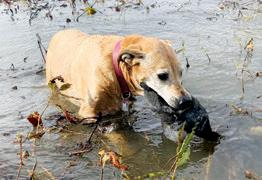
Miley tried to stand as we drove to the lake, she really did, but her back legs kept getting wobbly. So instead she laid down on her bed and enjoyed the ride, her nose sniffing and her face full of joy.
When we arrived at the lake and I loaded my shotgun, her attitude shifted. She knew, she just knew, what was going on. She had been on enough hunts with me to know that when I racked shells in, it was time to put on her game face.
This was both cute and unnerving. In her younger days Miley would have been working the grass off the trail, hoping to flush a pheasant or a quail. But now, and
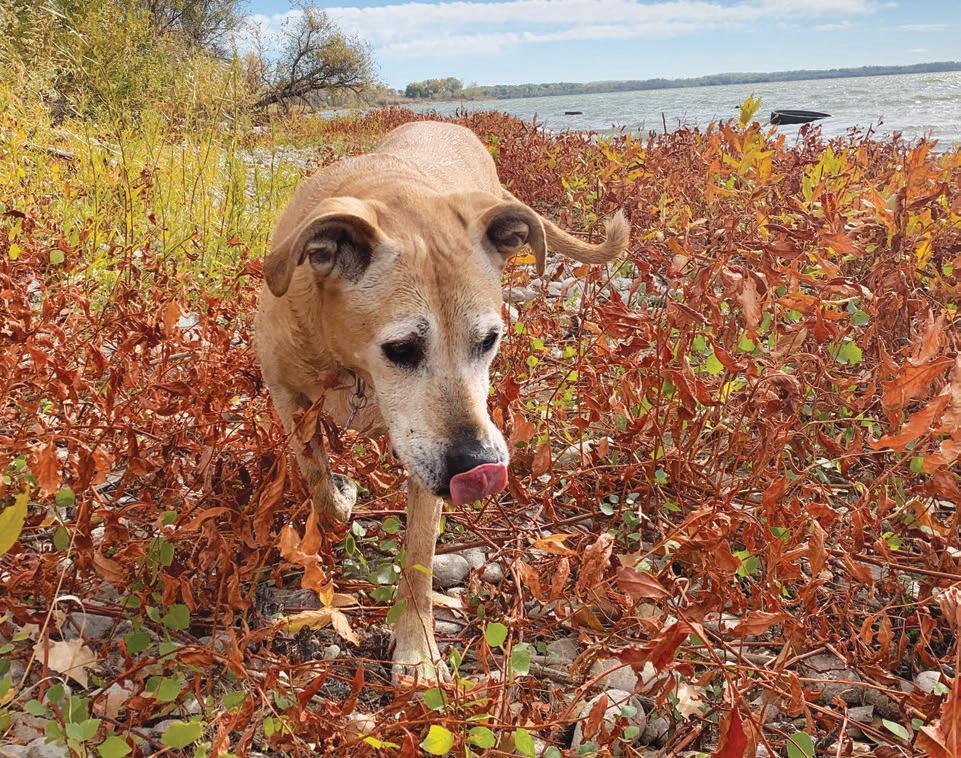
Being a complete and total gringo, I love Americanized Mexican food dishes. They are a subclass of cuisine that is underrated and unloved by many a snob. Just as Panda Express is not Chinese food, I get that some restaurants are just appealing to my lack of understanding, and I accept that.
For example, I give you pollo molcajete. Or in our case here, pato molcajete – duck instead of chicken. When I think of molcajete, I think of a rich tomato-based stew with onion, peppers, chicken, bacon and some melted jack cheese on top. But it turns out that molcajete is actually the name for the mortar and pestle tools that the food is served in, not the actual dish, so translated it means “chicken in a rock bowl,” and I love it.
What the heck is a molcajete then? It is a lava rock bowl that is used to make salsa, guacamole or grind spices in with the pestle. The bowl can also be heated up and used as a way to keep a dish hot longer, since the stone takes a long time to cool.
And molcajete can also just be a soup with some sort of meat in it, plus tomatoes.
When I go on long road trips, I often order this dish in small towns. It is filling, delicious and I can correctly pronounce molcajete when ordering. So I feel like that gets me a little bit of credibility with the person who is taking my order; maybe that translates into more chips and salsa, or maybe not.
Below is my best approximation of the pollo molcajete (subbing in the duck, of course) I got from Tres Hermanos in American Falls, Idaho. Authentic, no. Delish, yes.
2 slices of bacon, sliced
1 tablespoon butter
½ pound skinless duck breast, sliced into strips thinly
½ yellow onion, sliced into thick strips
6 garlic cloves, minced
½ red pepper, sliced into thick strips
1 tomato, diced
1 cup sliced mushrooms
8-ounce can tomato sauce
2 cups beef stock
2 tablespoons cumin
1½ tablespoons ancho chili powder
½ tablespoon dried oregano
1 teaspoon cocoa powder
½ lime, juice and zest Salt and pepper to taste
Cilantro, for garnish ½ cup jack cheese
Flour tortillas, grilled and caramelized
Brown the bacon in a 2-quart soup pot on medium heat. When brown, add the butter and duck breast to the bacon and brown on medium-high heat. Lower the heat and add the onion and garlic to the pan. Cook until garlic is fragrant and appears golden in color.
Next add the red pepper, tomato and mushrooms. Cook until the tomatoes are tender. Add the tomato sauce, beef stock, cumin, chili powder, oregano and cocoa powder. Bring to a simmer. Season with salt and pepper. Add lime juice if needed.
Simmer for 10 minutes until the peppers are tender. Serve in a bowl garnished with cilantro and jack cheese.
For more wild game recipes, see chefrandyking.com. –RK



for the first time ever really, she let me lead the way while hunting. It was like she wanted to do the work, but was saving her energy.
We crept down to the lake’s edge, the wind whipping up whitecaps. This thankfully kept the ducks close to shore. I spotted a coot a few feet into the reeds and let steel fly.
With a bird down, Miley went “charging” into the water – well, more of a stiff-legged saunter, but still as fast as she could go. After some coaching, a little wading and a touch of swimming, she found the bird and gleefully grabbed it. She brought it back to the bank and spit it out on dry land. Just like she always had, just like she was trained not to do.

I was hopeful that today was going to be the day Miley brought a duck to my hand, but she is nothing if not consistent.
One coot down, it was time to find another. We were on a dinner mission. We stalked the reeds on the side of the lake, picking our way a few hundred yards
down the river-rock lakebed.
When I looked back, I could see Miley had tripped and had fallen over. It took her a while to right herself and stand. She wanted to hunt; I wanted to hunt.
We turned around and headed back to the truck.
I cried three times on the way back.
I cried when Miley could not get over a small log in the path, her legs cold and stiff. I helped her over and then wept on her wet fur.
I cried when we were on the walk out, as she slowly came down the trail, clearly hurting but clearly happy.
I cried when I loaded her into the truck, placing the duck we had gotten next to her on the old dog bed.
WE PUT MILEY down that afternoon. She was senile – she had been barking at the walls for a while. She was nearly blind –it was an effort for her to find her food bowl if you moved it. She could hardly walk – the arthritis made it hard to stand, walk and squat to pee. Not to mention
navigate the stairs and dog door. She was starting to wet her bed and poop in the house.
It was, without a doubt, time to send her to the happy hunting grounds before she got truly hurt.
But oh my god did it hurt to realize it. I probably put it off longer than I should have, my own desire to not lose a companion causing her pain.
The passage of time is a funny thing. It can whittle down a mountain so slowly that no one alive notices its change. Or time can pass so quickly that you wake up one day and your kids are grown and your dog is old.
Time didn’t change, I realized. But time taught me lessons.
Miley taught me many lessons.
I must enjoy the simple things. I must be patient to those I love and protect them with everything I have.
I must soak up the sun while I have it. I must chase ducks while I can.
Because, in the end, I too am becoming an old dog. NS



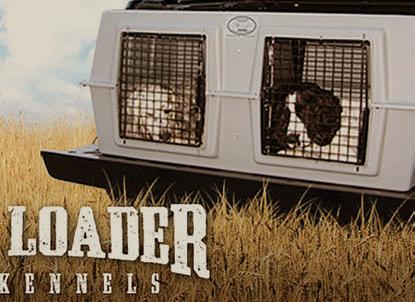

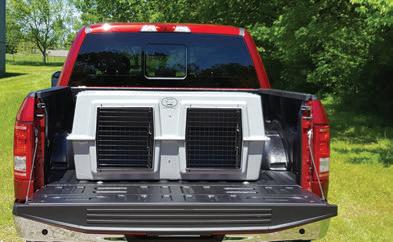

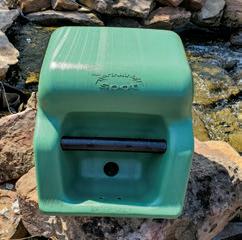



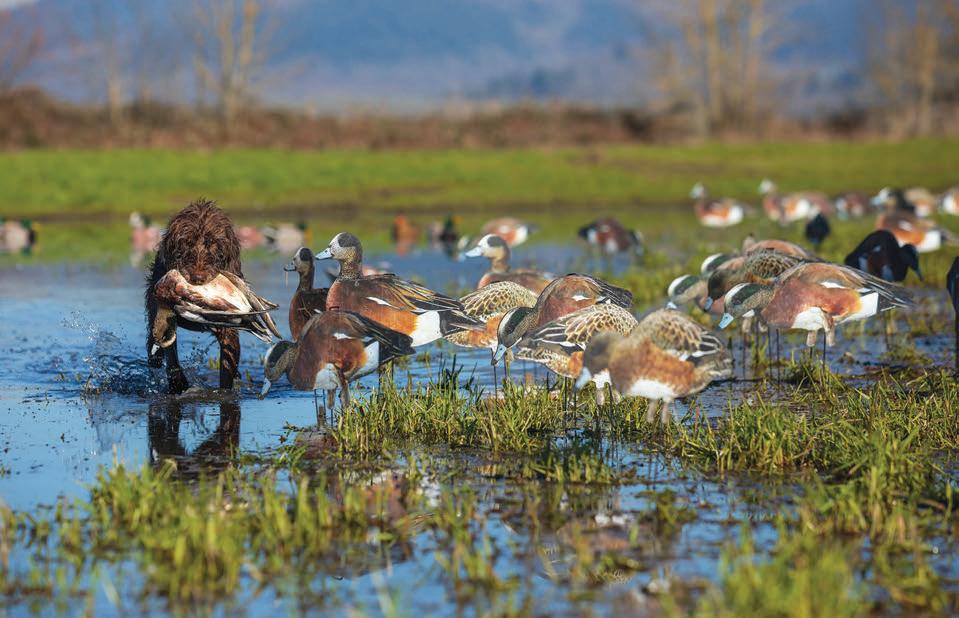

Another year has come and gone. If you haven’t already shopped for your fourlegged hunting partner, I have a few ideas.

 YETI RAMBLER 1/2 GALLON JUG
YETI RAMBLER 1/2 GALLON JUG
I know what you’re thinking! “Spend $100 on a water jug for a dog? Are you crazy?!” Maybe, but I’ve been called worse. Let me put it into perspective.

delivering all the Yeti dog bed offered. I returned it. The two dog beds I have are still like new, and my dogs sleep in them every day. I even take the Trailhead beds on road trips.
By Scott HaugenAnd, what the heck, even if you’ve done your doggy Christmas shopping, why not add to it? After all, when it comes to our hunting dogs, there’s no such thing as spoiling them, as their time with us is so brief.
Here are some items I used this year with great results. And what’s more, I’ll continue using them because I love how they perform.
My Yeti dog gear obsession actually started with the company’s Trailhead Dog Bed. I got one two years ago and loved it so much, I got another for my second dog. Someone lashed out at me, saying, “Why would I spend that much on a dog bed when you can get one just as good at ‘such and such store’ for a fraction of the price?”
So, I got one of the cheap beds at the such and such store. It offered no head support and couldn’t be taken apart and washed like the Yeti bed. It wasn’t even close to
Then there’s Yeti’s Boomer Dog Bowl. I’ve had two of these since they first came out, and my dogs have eaten from them twice a day, every day. I take them on road trips, too. I’ve gone through lots of dog bowls over the years, and nothing I’ve found comes close to the quality and longevity of the Boomers. So, I got another for days when we’re out hunting. I keep this one in the back of the truck. It’s been through extreme conditions and held up great; even the rubber bottom is in perfect
Yeti builds tough dog gear, and the 1/2 gallon Rambler is no exception. (SCOTT HAUGEN) condition despite being covered in dust many times. And the inside is as slick and clean as when I first bought it.

So, this year I got the Yeti 1/2 Gallon Rambler. I simply got tired of plastic water jugs spilling in the back of my truck when driving through rough terrain. When a 5-gallon jug punctured and leaked all over my extra clothes, boots and backpack, I’d had enough. I got the Rambler and haven’t looked back. It holds more than enough water for me and my dogs for a day of hunting, and it’s rugged and stands up to my less-than-stellar driving in the woods
when chasing grouse, quail, pigeons and gray squirrels with my dogs. In no time the Rambler paid for itself, and after 10 months, it’s still like new!
Info: $100; yeti.com.
This summer one of my dogs started getting lazy in the water, retrieving bumpers by barely gripping the end. Enter the Avery Sporting Dog PerfectHold HexBumper. The dumbbell design with enlarged ends forced my dog to gain the proper grip and hold, which carried over to
our bird training and future hunts.
Info: Comes in three colors, $10.99; banded.com.
I was also happy with their EZ-Bird Pheasant with tooth-lock features for a solid hold, a puncture-proof skin, a soft floating head that won’t break teeth, and a sight/scent tail streamer for focused marks. The realistic paint and anatomically accurate design made training more fun and exciting for my dogs. I’ll be getting more of these in the waterfowl line.
Info: Comes in eight options, $19.99; website above.
I have pudelpointers, and their deep chests and narrow waists aren’t easy to find waterfowl vests for. However, the Topflight Vest by Alps is great! The 5mm neoprene used throughout the vest not only protects the dogs in heavy brush, but keeps these lean gun dogs warm on long, cold days on the stand and in the duck blind. The multiple bar-tacked areas make for easy trimming, and the contoured neck offers an even better fit. The lift handles, leash clip and duo flotation pads are excellent, very functional features.
Info: Comes in four sizes, $49.99; alpsoutdoorz.com.
OK, this gift benefits you and your dog. It’ll help you shoot more ducks and boost your dog’s retrieve numbers.
One of the most effective and affordable duck decoys I’ve used – and I’ve used a lot – is Big Al’s Wigeon Pack Duck Silhouettes. Arranged in fields, at water’s edge in flooded fields and along sloughs, even on levees, these decoys were responsible for bringing in large numbers of wigeon, mallards, pintail and teal all season long. I like using five dozen silhouettes with a dozen floaters, which allows for very effective sets and at a fraction of the cost of full-body spreads. These silhouettes feature incredible lifelike realism, are quick to clean and are so easy to carry, set up and take down.
Info: $72 per dozen; bigalsdecoys.com.
Here’s another double whammy, a gift
Comes with rear mounted motors that run on two D-cell batteries, for up to 25 hours or more. Optional timer available. Orange weedless paddling feet and foot attach ments, easy access for battery holder, waterproof switch and floatation insert.

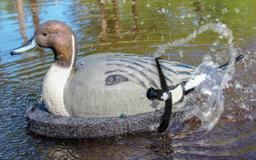
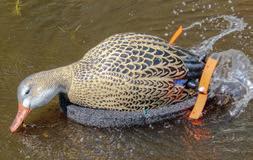
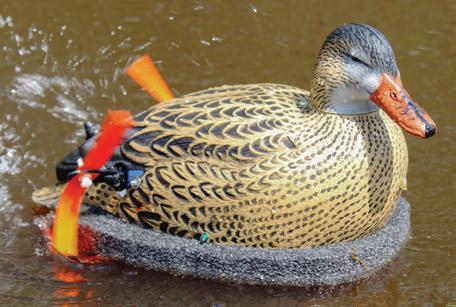

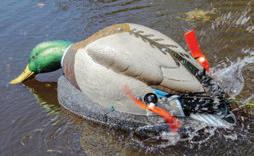

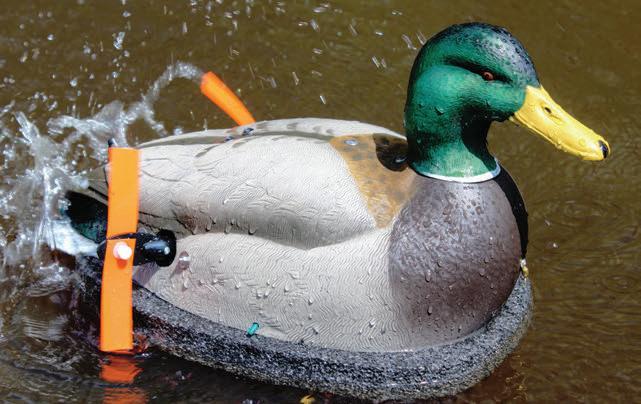

The Yakima Valley’s Rob Phillips is out with another great book, this time a nonfiction work about all the hunting dogs that have come through his life as an avid and far-traveling bird hunter.
I received an advance copy of A Dog Life Well Lived earlier this fall and really liked it. Between amazing points and long-distance retrieves, motel room disasters and a neardrowning, it’s flush with the thrills and chills of the hunt, the dedication of hard-working gun dogs and the bonds between man and his age-old four-legged hunting partner.
Phillips traces his love of dogs back to a bored teenage summer and his mom’s edict to hit the bookmobile – he hated reading as a kid because, as he would later realize, he was dyslexic – where he checked out a copy of Jim Kjelgard’s Big Red. That quickly led to reading the sequels Irish Red and Outlaw Red and a burning desire to own an Irish setter. That didn’t quite work out as he’d hoped, but his parents did bring home an 11-weekold Labrador retriever named Tara and the pair became boon companions in the fields, woods and marshes of Central and Eastern Washington, where they chased grouse,
doves, ducks and pheasants.
After graduating from Washington State University with a degree in advertising communications, marriage to wife Terri and the birth of their first son, Kyle, came Phillips’ second hunting dog, Zebediah, and the pattern was set, as over the coming decades he seemed to always have a dog or two, or even three, around the house and backyard, nearly all of which were Labs.
Phillips – who retired in 2021 after a 41-year career at a local ad agency and is busily adding to his successful fictional Luke McCain/Washington game wardening series – is on point with A Dog Life Well Lived as he memorializes all of the hard-working members of his pack with heart-warming and humorous essays. They may not all have been AKC-registered dogs, but they’re all endearing in their own ways and Phillips’ fleshes out the unique personalities of each, and along the way his own as well.
As a longtime newspaper hook-andbullet columnist – one of the last in the state, in fact – at the Yakima Herald-Republic, Phillips’ prose is naturally shot through with hunting advice, dog health and care issues
making this more than a memoir. All in all, whether you’re a dedicated wingshooter, or just someone who loves hunting in general or dogs, or both, this is a good read.

A Dog Life Well Lived comes out December 2 and is available online at latahbooks.com. –Andy Walgamott

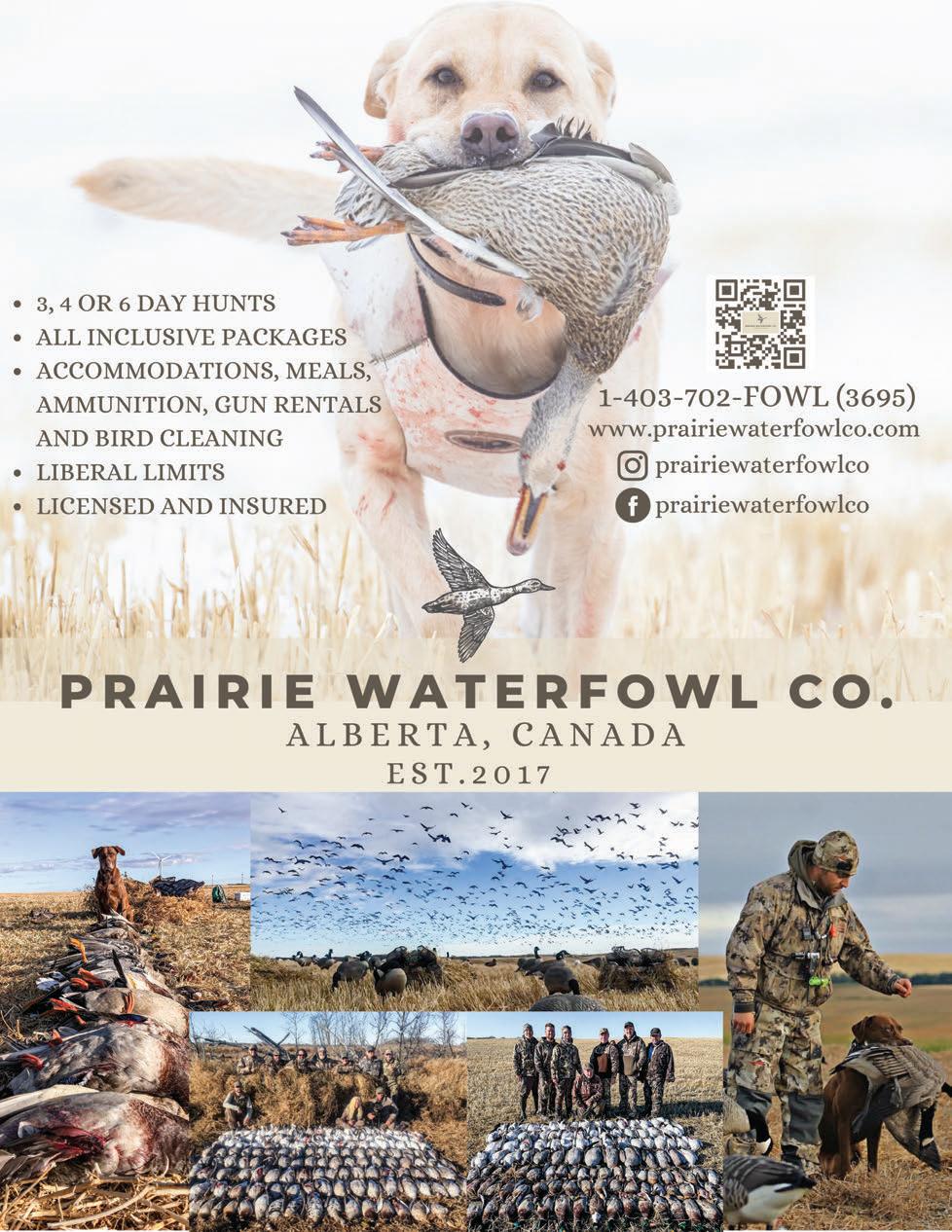
for you and your dogs. Slayer Calls has a single- and double-reed duck call I’ve used throughout the West, including Alaska, for the past two seasons with great results. I’ve also used their honker call on many hunts with awesome outcomes, and their Tar Belly white-fronted goose call was money this fall in Canada. These are some of the easiest duck calls I’ve ever run and their sound quality is outstanding. Your dogs will thank you for this one!



Info: Starting at $49.96; slayercalls.com.
THERE YOU HAVE it, enough options to cover your dog’s needs, and maybe some of yours. By the way, I’m not endorsed by any of these companies. I choose and use what gear I like, and I like all of these.
May you have a blessed Christmas and holiday season. Good hunting. NS
Editor’s note: Scott Haugen is a full-time writer. See his puppy training videos and learn more about his many books at scotthaugen.com and follow him on Instagram and Facebook.










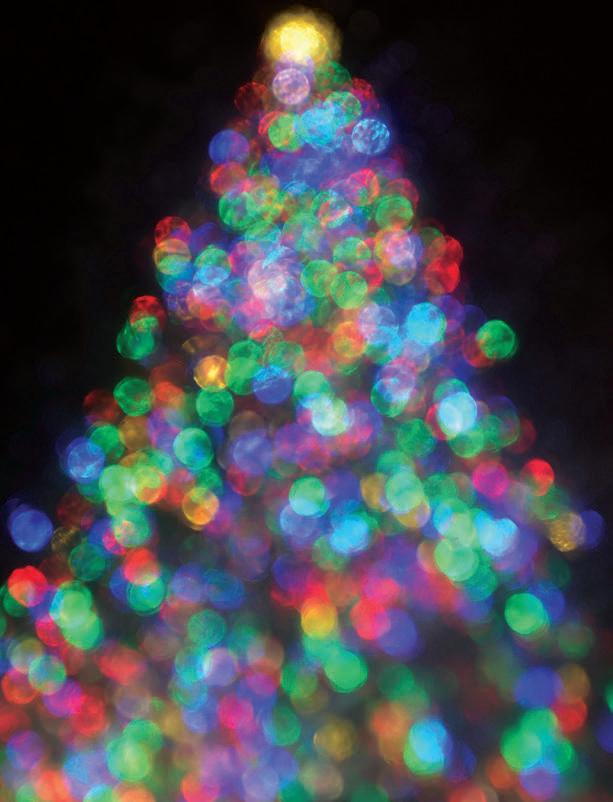
Christmas wraps up the month, and for those of you who still haven’t finished your holiday shopping, take a lesson from my late aunt: Buy gifts the recipient can actually use.
But before you do some last-minute shopping, mark some dates on your calendar because there is still hunting opportunity to be enjoyed.
Rabbit season should actually be in its prime, with cold temperatures and even snow in some areas making bunnies more visible. Leaves are down and you can often spot the little buggers around root wads, blackberry tangles and in brushy areas. If there’s snow on the ground, just look for telltale tracks and trails. The Evergreen State’s season runs through March 15, 2023.
You can still go after pheasants, quail and chukar in Eastern Washington. Ringnecks and topknots may be hunted to January 16, while chukar gunners can hunt through January 31. On the Westside there’s an “extended” pheasant hunt through December 15 at specific locations, but no birds will be released.
Blackpowder blacktail hunting is open through December 15 in several 400-, 500- and 600-series game management units. Over on the Eastside, muzzleloader season wraps up December 8 in some units.
And remember, Washington grouse hunting now remains open through January 15, and I doubt you’re going to encounter much competition.

AS FOR CHRISTMAS presents, this shouldn’t be difficult for the hunters on your list. October found me in desperate need of replacement mantles for my gas lanterns, and they’re inexpensive stocking stuffers. If you give someone a new lantern, add some of these to the package because anyone who uses a lantern is going to need mantles!
Also, if you’re gifting a lantern, make sure you buy a spare globe (glass). About four years ago, my brother managed to break two globes on two of my three lanterns within about 10 minutes while we were setting up camp.
A supply of batteries is also a good gift. Just make sure they’re the size your recipient can use. Better still, get that person a camp flashlight and provide spare batteries.
Don’t overlook ammunition as a gift. A new box of rifle cartridges or shotgun shells – the latter could come in handy almost immediately for holiday season or January hunting –can bring a smile. It might also result in a gift of game meat in return. (For example, I would never say no to a box of No.
6 shells for my 20-gauge smoothbore.)
A new sleeping bag might be a good gift for someone who spends plenty of time afield, and don’t overlook foam sleeping pads.
Some weeks ago, Bushnell introduced a new solar cellular trail camera called the Cellucore 20 Solar. It has something called “Dual Sim” technology which, according to company literature, “takes the guesswork out of determining which carrier has the best signal in your area.”
“The Dual-Sim setup allows the camera to automatically connect to AT&T or Verizon,” Bushnell says, “whichever carrier has the strongest signal in your location.
High output IR LEDs on the camera offer best-in-class night range and its sub-1second trigger speed means no animals will make it by unseen.The Cellucore 20 Solar provides crystal clear 20 MP images and comes standard with a removable battery tray for ease of use.”
I’ve used trail cameras and know others who do likewise.
Browning waited until late October to announce its new Silver Series rifle
ammunition line, but you might find a box in someone’s favorite caliber to stick under the Yule tree. There are offerings in several popular calibers including .243 Winchester, .270 Winchester, 6.5 Creedmoor, 6.8 Western, .30-30 Winchester, .308 Winchester, .30-06 Springfield, .300 Win. Magnum, 7mm Rem. Magnum and .350 Legend.
AS I PREPARED this month’s column, some new firearms came onto the market and might make good gifts to treat yourself or a loved one to. J.P. Sauer & Sohn announced the introduction of new SL5 waterfowl shotguns, available in three models: Fred Bear Old School Camo, Fred Bear Old School Camo (stock and forearm with brown Cerakote barrel and action) and traditional black synthetic.

All three models are available with 3.5inch chambers and the Black Synthetic is also offered with a 3-inch chamber.
According to J.P. Sauer & Sohn, all 3.5inch models feature an oversized extended bolt handle and release button, and the guns are offered with three different barrel

lengths: 26-, 28- or 30-inch.

The receiver features a steel upper and aluminum lower. These guns are all made in Italy and come standard with five Benelli Crio Plus-style extended choke tubes.

The good folks at Savage Arms announced the Impulse Mountain Hunter, another entry in the company’s series of straight-pull bolt-action rifles.
They feature the user-adjustable AccuTrigger, a removable/adjustable multi-position bolt handle, aluminum receiver with an integral 20 MOA rail, a synthetic gray stock with AccuStock technology, adjustable length of pull, a Proof Research carbon fiber-wrapped stainless steel barrel with muzzle brake, and two-position tang safety.

Available calibers include .270 Winchester, 28 Nosler, 6.5 Creedmoor, 6.5 PRC, .30-06 Springfield, .308 Winchester, .300 WSM., .300 Win. Magnum and 7mm Rem. Magnum.
Mossberg has added the 7mm PRC chambering to its Patriot Predator boltaction rifle family. According to the company, this cartridge is “designed to

outperform existing 7mm cartridges in a standard long-action rifle.” Interestingly, I found one ballistic chart comparing the 7mm PRC to the 7mm Rem. Magnum, both pushing 180-grain bullets. According to the chart, the 7mm PRC leaves the muzzle at 2,950 feet per second, while the 7mm Rem. Magnum checks out at 2,825 fps.
In terms of muzzle energy, the 7mm PRC also shades the 7mm Rem. Magnum by about 300 foot-pounds.

Not to disparage any round, but when you get into that energy realm, the question must be asked: Just how dead does anyone need to kill something? That said, I’m impressed with the ballistics, and my guess is that this round will make its mark.
Mossberg’s Patriot Predator model is based on the company’s twin-lug pushfeed action. The rifle features a freefloating carbon steel barrel threaded at the muzzle (5/8-24 threads per inch). It
features a receiver-mounted Picatinny rail, patented LBA (Lightning Bolt Action), useradjustable trigger, oversized bolt handle and a spiral fluted bolt.

Stock options include flat dark earth (matte blue metal finish) or TrueTimber Strata camo (Patriot Brown Cerakote finish).
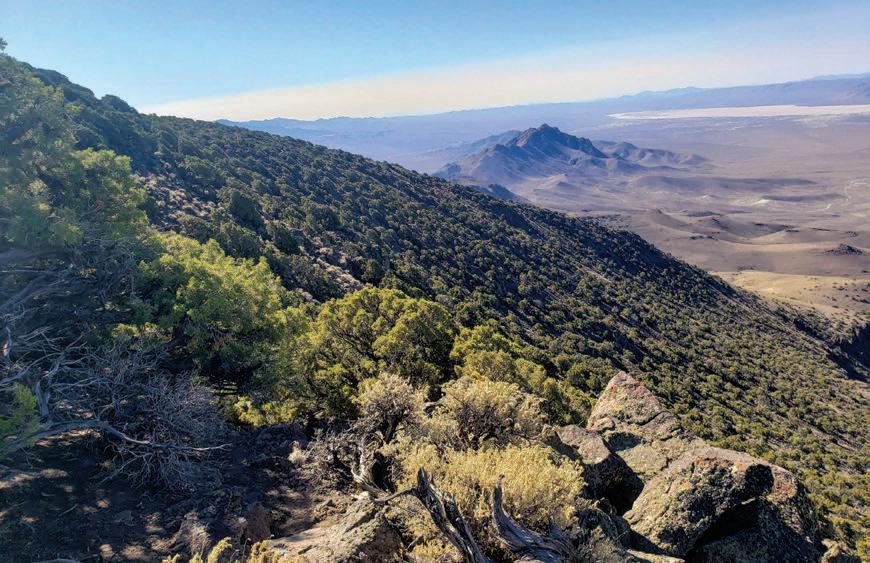




THIS YEAR, AS in the past, would not be complete without wishing all of our readers a joyous holiday season. Thanks for your continued reading and support.
Be sure to contact your hunting partners, maybe send them a card or get together for a holiday dinner. If you hunt on private land, don’t forget to offer good wishes to your host. Send them a gift card.
We all made it through another year. Keep driving careful and always shoot straight. Buy your hunting partner a subscription to Northwest Sportsman, or make a donation in their name to the Second Amendment Foundation or some other gun rights organization.
As always, I’ll think good thoughts about you at the campfire. NS




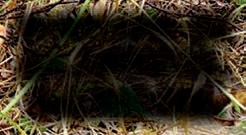


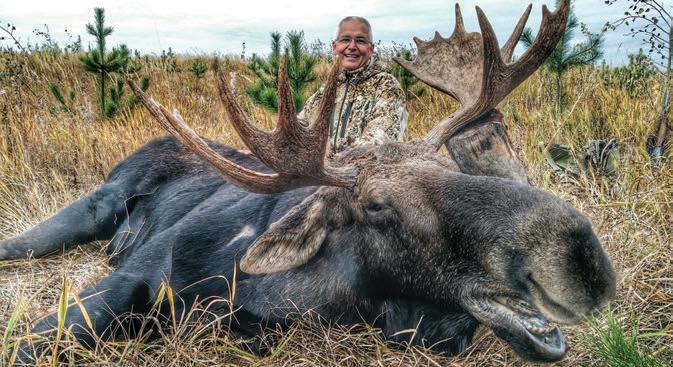

The 2022 season has come to an end for most hunters unless you have a late season tag or special permit to end the year. With that being said, who was lucky enough to notch a tag this fall? If not, were you one of the many hunters who didn’t see any game or have close encounters due to warm weather or hunting pressure? The list of reasons for being unsuccessful could go on and on.



One of the most common complaints or “reasons” people will say they are unsuccessful is that there were just too many people afield. My answer to that is to go where there are no people. In other words, hike further, hunt longer and hunt harder. Start well before daylight and don’t get back until well after dark. If your reason is because the weather was too hot, go where there is shade and cool draws. Hunt slow, pay attention to your wind and watch where you step. Keep your eyes looking through your glass every step along the way.
I WAS ON an elk hunting trip last month with my father-in-law in Eastern Washington during the modern firearm season, and I came away with a few talking points for this article. It’s very interesting observing hunting patterns and behaviors of fellow hunters when you pull into camps or nearby resorts. When I pulled into the resort that first day, I arrived around 3 p.m. I was blown away by the number of people in camp sitting around campfires, or hanging out around their RVs or outside their hotel room. Once 4 p.m. hit, they all jumped in their trucks and sped off into the hills. Some even returned before the end of shooting light, complaining that they didn’t see anything moving around.

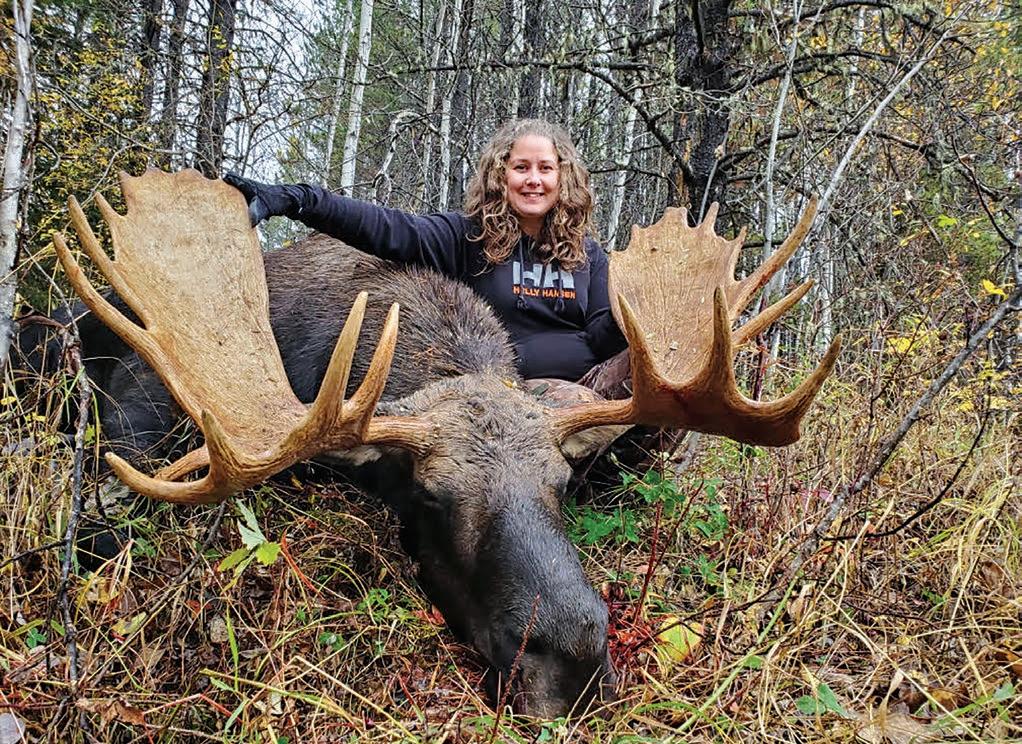
The next day my father-in-law and I
If you tagged out in your first hunting season, congratulations! But if not, no worries, next fall and another chance will be here soon enough. Either way, use the off-season to evaluate your tactics and gear to be better prepared for 2023’s hunt. (DAVE ANDERSON)

were lucky enough to get his cow elk right around 8 a.m., and we had it packed off the mountain by 1 p.m. When we pulled into the resort, it was the same thing again. People around their RVs or in front of their cabins sitting by a campfire drinking beer, telling stories and having a good time. Like clockwork, at about 4 p.m. we observed all the hunters jump into their trucks and speed off onto the highway to their evening destinations.
For some hunters, the social hour and camp camaraderie is what they look forward to the most, and if that is the case, by all means enjoy it. However, if you are like my family and me, we prepare each day as if we won’t be back at all during the day. I will beat this dead horse to death: You will not be successful sitting around camp 99.9 percent of the time.
As we were getting everything situated with my father-in-law’s elk, we had a lot of
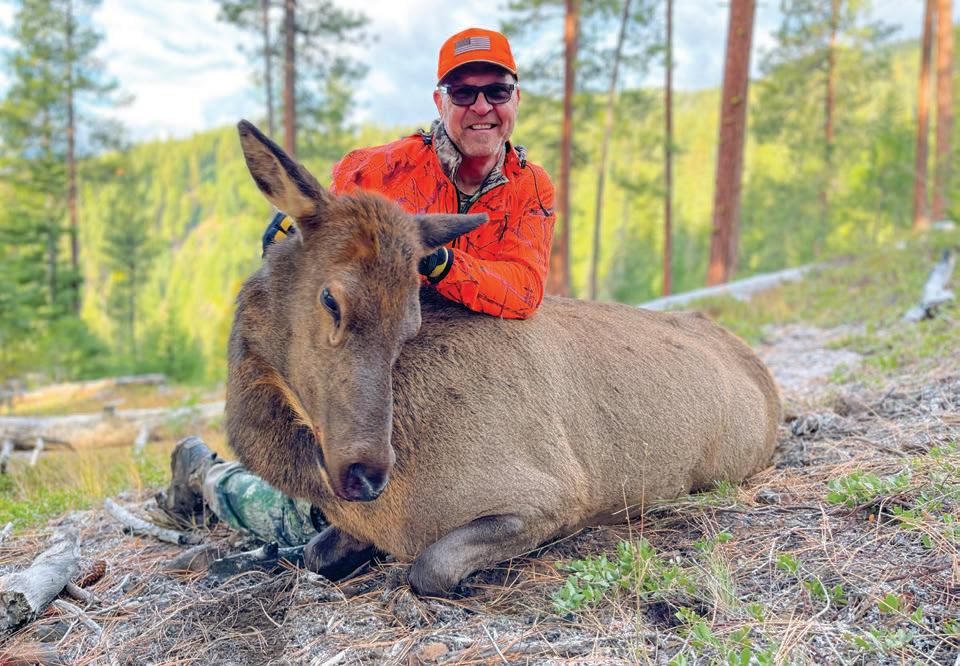
people come up to congratulate him on his success. Interestingly enough, most of them reported that they had not seen any elk. That was not surprising based on my observations of most hunters back at camp during the day. Still, there was one gentleman who had the same philosophy as me – up early, out all day and not back until after dark. He stated that he had been all over and saw several spike elk in the unit he was hunting. He was successful and had just finished packing his elk off the mountain after shooting it the day before. Moral of the story: Get up early, stay out all day and don’t come back until after dark if you want to be successful. Don’t make excuses. Make the most of every minute you have. Good things come to those who work their butts off.
ANOTHER THING I like to recap and assess after a season is my gear. How happy were
you with your equipment throughout the season? The off-season is a good time to evaluate your gear and come up with a list of things you would like to swap or change out for next fall.
Glass is one of the most important items that can make you successful or not. Spend as much money as you can budget on glass. There is a huge difference in a $200 pair of binoculars versus a pair that costs over $1,000. Perhaps you don’t have a spotting scope. Maybe it’s time to add one to your arsenal, especially if you are hunting areas and units where spot and stalk is the most effective hunting method. If you want to be successful at glassing, it pays to have the best set of binoculars and spotting scope you can afford to buy.
This also goes for rifle scopes. I ran VX3HD 4.5-14X40 CDS-ZL Duplex scopes for years before I upgraded to the new Leupold VX-5HD 3-15x44mm CDS-ZL2.

The difference in these two scopes is night and day. The amount of daylight the latter gathers in the first and last half hours of light is incredible.
How was your rifle during the season? Did you feel comfortable with your gun or was it too heavy? Is there something that you need to change with your rifle, or do you need a new one altogether? These are all important questions to ask yourself after a season. If it kicks like a mule, could you add a muzzle brake? Evaluate the cost of the upgrades and if they exceed the cost of buying a new rifle with all the features and benefits you want, then consider purchasing a new rifle. Factory rifles nowadays are incredible. They are much different than the rifles that were on the market even 20 years ago.
If you ultimately decide on purchasing a new rifle, here are some features to consider and evaluate. When looking at the rifle stock, you will want something that has a synthetic or carbon fiber stock to reduce weight. I prefer an adjustable
trigger and fluted barrel. I get all of these features in my Weatherby Backcountry 2.0 chambered in .300 Weatherby Mag., and which weighs in at 5.6 pounds. This is a factory rifle and retails for about $3,599, but it will last me a lifetime.
There are other rifles that you can buy that are a bit heavier and offer some incredible value, like Tikka T3X, Browning X Bolt in a variety of calibers and Bergara. I am sure I left out some other manufacturers, but those are brands I would take a good long hard look at.
My other piece of advice to consider would be to pick a caliber that is easy to find ammo for. One of my all-time favorite calibers is the .300 Win. Mag. It can do everything you want for big game animals in the Lower 48 and then some. It is also a caliber you can find ammo for almost anywhere.

THE LAST PIECE to reflect on and think long and hard about is practice. How much practice did you get in before the start of this past season? Did you get out and shoot
prior to the season and practice at different distances? Maybe you missed a shot this year and are questioning why. Whether you hunt with a bow, muzzleloader or rifle, the more time at the range, the better you are going to be. Make a point to get out as much as you can. If you don’t shoot your large magnum rifle or live in the city and can’t get out to the woods easily, even getting to an indoor pistol range can change your performance in the field. It takes some trigger control and good shooting fundamentals to shoot a handgun well. This also takes away the excuse of living in the city and not having time to shoot.
When I visit the Seattle area for work, I always try to go to an indoor range in Kent with my coworkers. I know for a fact there are similar ranges in or near Seattle, Portland and Spokane. It’s all about time management and making a point to do it.
In the end, when we recap our season, it’s important to evaluate what worked and what didn’t work and take steps to fix those areas that didn’t work. Stop making excuses and start making changes. NS
Cumberland’s Northwest Trappers Supply is your one-stop trapping supply headquarters, featuring one of the largest inventories in the U.S. We are factory direct distributors on all brands of traps and equipment which allows us to offer competitive prices. Give us a try. Our fast, friendly service will keep you coming back.



50 Years
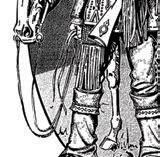
P.O. Box 408, Owatonna, Minnesota 55060 • (507) 451-7607 trapper@nwtrappers.com • www.nwtrappers.com



Hide Tan Formula has been used successfully by thousands of hunters and trappers across the U.S. and Canada. No more waiting several months for tanning. Now, you can tan your own hides and furs at home in less than a week, at a fraction of the normal cost. Our Hide Formula tans deer hides either hair-on for a rug or mount, or hair-o for buckskin leather. Tans all fur skins – muskrat, mink, beaver, fox, coyote, raccoon, squirrel, rabbit, etc. It also applies to bear, elk, moose, cowhide, sheep and even snakeskin. Hide Tan Formula is premixed and ready to use and produces a soft, supple Indian-style tan in five to seven days.
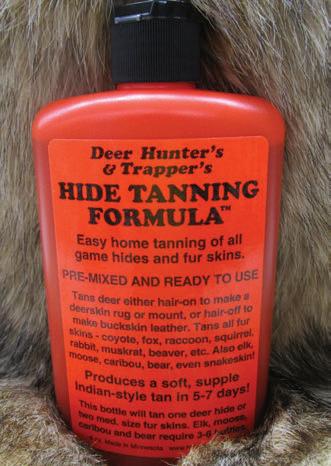
One 8-ounce bottle will tan one deer hide in two medium-sized fur skins. Bear, elk, moose and caribou require three to six bottles. Complete instructions are included. You’ll be amazed how easy it is!
Tanned hides and furs are great to decorate your home or camp and also to sell for extra income. Tanned hides and furs are in demand by black powder enthusiasts, American Indian traders, fly tyers, country trading posts and many crafters. Our products are proudly produced and bottled in the U.S. for over 20 years.
Available at Cumberland’s Northwest Trappers Supply in Owatonna, Minnesota.
Call (507) 451-7607 or email trapper@nwtrappers.com. nwtrappers.com
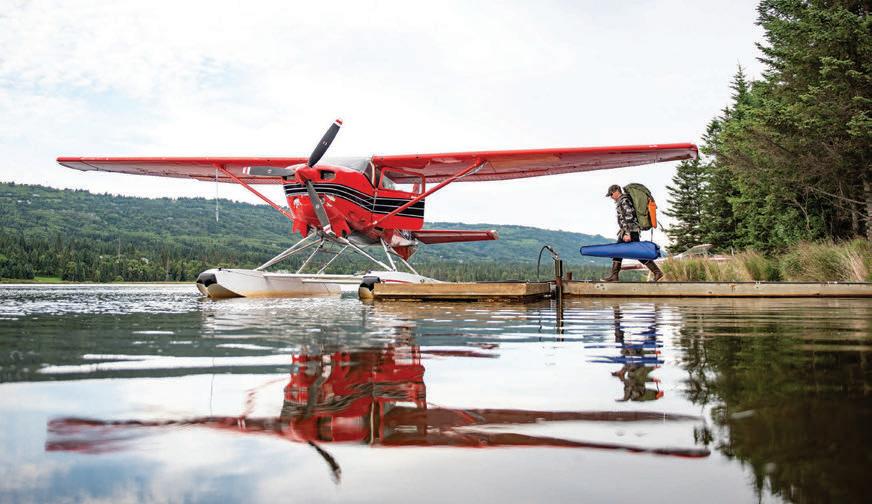





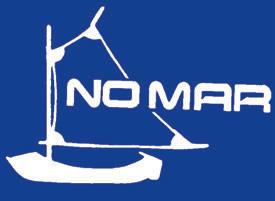
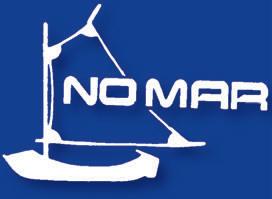




FAMILY ACCESS PERMIT property.rayonierhunting.com/Permits/ PermitsHome.aspx
Take your family on an unforgettable outdoor adventure through the Pacific Northwest with a Rayonier Hunting & Rec Family Access Permit. Gain access to breathtaking scenery, hiking trails, fishing holes and more. Start your adventure now on our website and start making memories your family will cherish forever.
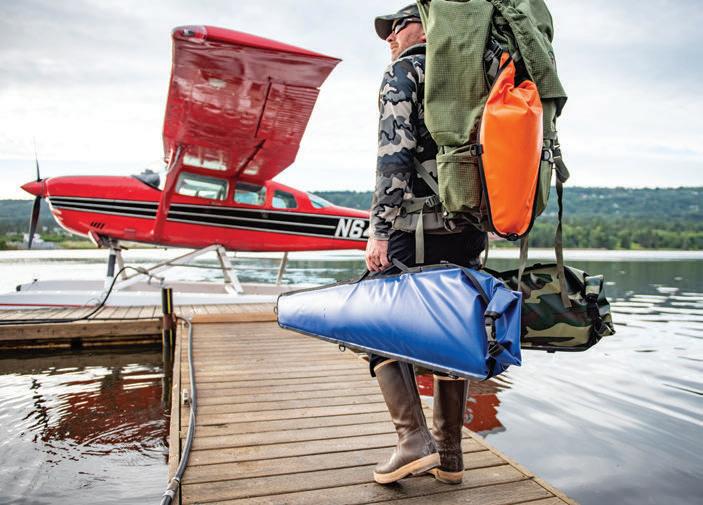

wrcamps.com

Are you looking for a high-quality, rugged and durable RV? At Western Range Camps we specialize in the design, manufacture and sale of a different type of RV called a Range Camp. Check us out and give us a call and let us design something just for you. Hand crafted, customizable and built to last!
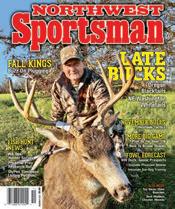

nwsportsmanmag.com
The premiere source for actionable fishing and hunting opportunities in the states of Washington, Oregon and Idaho. With input from top guides and expert sportsmen, each issue aims to give readers intelligent advice on how to harvest more fish and game that month, as well as provide insight into major issues affecting fish and wildlife, and profile interesting sportsmen.

A one-year subscription is $39.95 for 12 issues. Call 800-332-1736 or go online to subscribe.
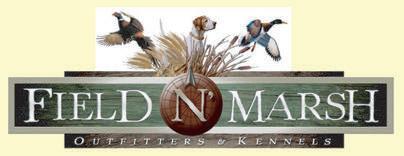
Is it even winter without flannel? The Timber Rush Flannel holds back the chill better than a campfire. Shop for the shirt at our website.
northwesthunting.com
Jeff Miller combines his love and knowledge of the outdoors with a passion for excellence and 20-plus years of hospitality management and over 30 years as a full-service outfitter to provide an exceptional experience for both his numerous day hunters, destination-oriented individuals and corporate groups.

olivertraveltrailers.com
Oliver Travel Trailers is a family-owned RV company located in Hohenwald, Tennessee. Oliver has developed a reputation for being the highest-class fiberglass travel trailers in the industry. Oliver customers appreciate the experience of purchasing factory direct, having the ability to personalize the trailer to their camping preferences, and rave about the first-class customer service they receive both during and after the purchasing process.
leelock.com
The Crab Cracker allows you to measure your Dungeness crabs to determine which ones are legal to keep, and then crack them in half over the top of a 5-gal lon bucket, thereby separating the two clusters from the shell and guts. Crabs cleaned this way take up half as much space as whole crabs, so you can cook twice as many in your kettle.
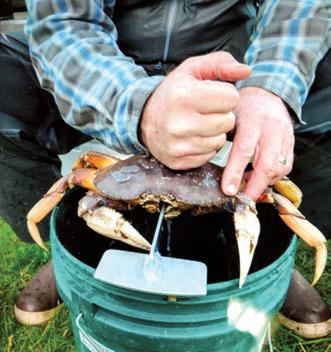
The Crab Cracker has four different measurements to cover minimum sizes for Oregon, Washington, California, Alaska and Canada. It’s made from solid anodized aluminum, and greatly aids in cleaning Dungeness crabs.



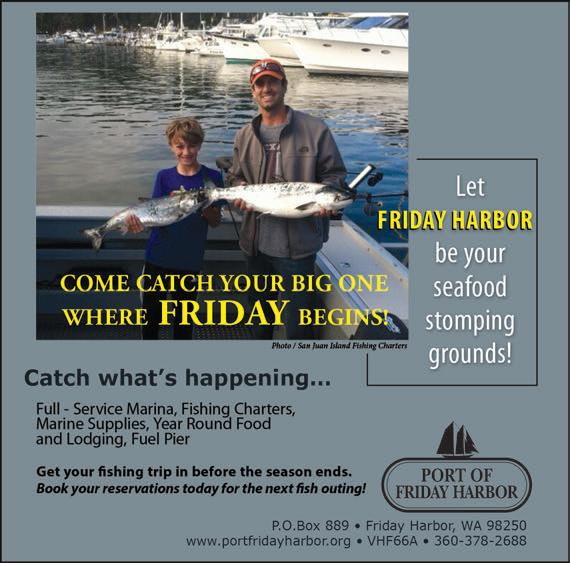
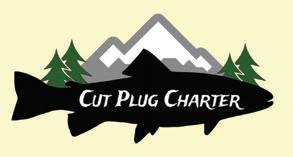
seattlesalmonfishing.com
Seattle fishing charter offering light tackle fishing for salmon and lingcod in the Puget Sound. One-of-a-kind fishing expe rience minutes from downtown Seattle. Great for all ages and skill levels. Book a fun adventure as a gift for a loved one.
CULVER
Culver Marine (541) 546-3354 www.culvermarine.com

EUGENE
Clemens Marina (541) 688-5483 www.clemensmarina.com
EUGENE
Maxxum Marine (541) 686-3572 www.maxxummarine.com

FLORENCE Y Marina (541) 590-3313 www.ymarinaboats.com
GLADSTONE
Clemens Marina (503) 655-0160 www.clemensmarina.com
PORTLAND
Sportcraft Marina, Inc. (503) 656-6484 www.sportcraftmarina.com
TROUTDALE
Clemens Marina (503) 492-7400 www.clemensmarina.com
CHINOOK



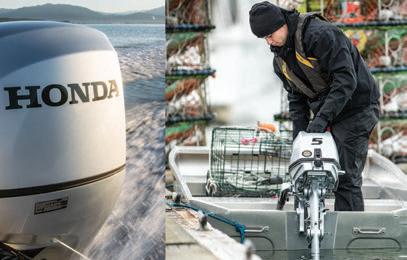
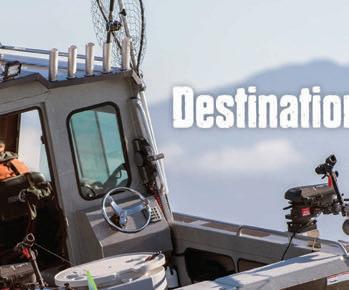
Chinook Marine Repair, Inc. (800) 457-9459 • (360) 777-8361 www.chinookmarinerepair.com

EVERETT
Boat Country (425) 259-6126 www.boatcountry.com
MOUNT VERNON
Tom-n-Jerry’s Boat Center, Inc. (360) 466-9955 www.tomnjerrys.net
PASCO
Northwest Marine and Sport (509) 545-5586 www.nwmarineandsport.com
SEATTLE

Legacy Master Marine (206) 762-0741 www.lmmseattle.com
SPOKANE VALLEY
Spokane Valley Marine (509) 926-9513 www.spokanevalleymarine.com
TACOMA
King Salmon Marine, Inc. (253) 830-2962 www.kingsalmonsales.com
TACOMA
Tacoma Boat Sales & Service (253) 301-4013 www.tacomaboatsales.com
fortknoxnw.com
Fort Knox Northwest has been selling home, business and gun vaults for nearly 40 years. Personalized security and ser vice you can trust. Need to move? Don’t leave your safe behind! Save your back and keep your friends by giving us a call. We provide professional and courteous relocation of all safes.

Verle’s has the Big Chief front- or top-load package for you. Smoking is made simple with the Big Chief, as all you have to do is plug it into a standard household outlet. Just place your food (after brining or prepa ration) on one of the five racks that sit over the top of the drip pan. The smoker’s capacity is a whopping 50 pounds of meat or fish!
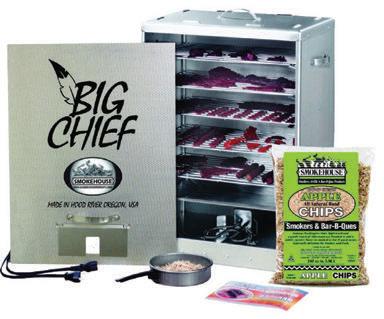
Includes: smoker, five easy-slide chrome-plated grills, electric cord, drip pan, wood flavor pan, free bag of Smokehouse Alder Wood Chips, and recipe booklet.
MSRP: $134.99, including holiday special of four extra bags of smoking chips – a $20 value!
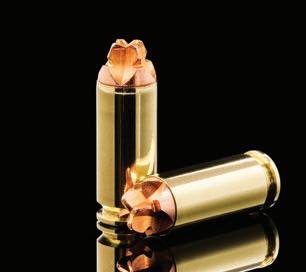
black-hills.com
Black Hills Ammunition’s 10mm HoneyBad ger has deep flutes designed for optimum terminal performance without reliance on hollow points. The bullet penetrates deeply, cutting through bone and muscle to get to vitals. This is important when relying on your handgun for protection, including the possibility of bear attack. This is a solid choice for defense!
HCA offers steelhead, sturgeon, bass and trout fishing charters, jet boat tours, and whitewater rafting in the wild section of Hells Canyon on the Snake River, the deepest river gorge in North America. Trips include navigating the largest whitewater rapids, remote location, incredible scenery, wildlife, historical siteseeing stops and lunch.


seasportboats.com
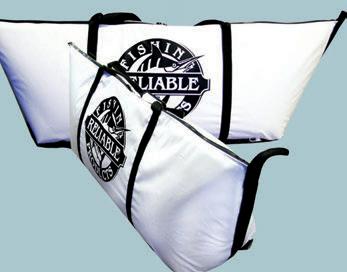
Whether you’re cruising or trophy hunting, in summer or winter, the Sea Sport Explorer 2400 provides the best performance of any boat in its class due to the signature of the Sea Sport “deep-V” hull design. The wide walk-around, built-in cockpit steps and a huge hardtop are just a few of the features you will find on a long list of standards. Features include a full dinette and galley, an enclosed stand-up head and increased bunk space.
reliablefishing.com
Reliable Fishing Products was established in 2003 and makes the best cooler bags in the industry. They offer 10 bag sizes ranging from 18”x36” to 42”x90”, three kayak bags and three billfish/tournament blankets. They hold ice for days, are collapsible, soft-sided and have a drain plug at the bottom corner.

northriveroutfitting.com
We offer hunts of unmatched quality. Alberta whitetail, moose, caribou and goat. When you join us on a hunt in this spectacular and remote part of British Columbia you will feel at home and welcomed into our hunting family. That same care, hard work and at tention to detail goes into everything we do.
CALIFORNIA WILD SHEEP FOUNDATION cawsf.org
California Wild Sheep Foundation is dedicated to putting and keep ing wild sheep on the mountains by enhancing their environment with water installations and researching diseases, so that future generations may enjoy the majesty of the iconic California bighorn. Join us today and be a part of the future of wild sheep!






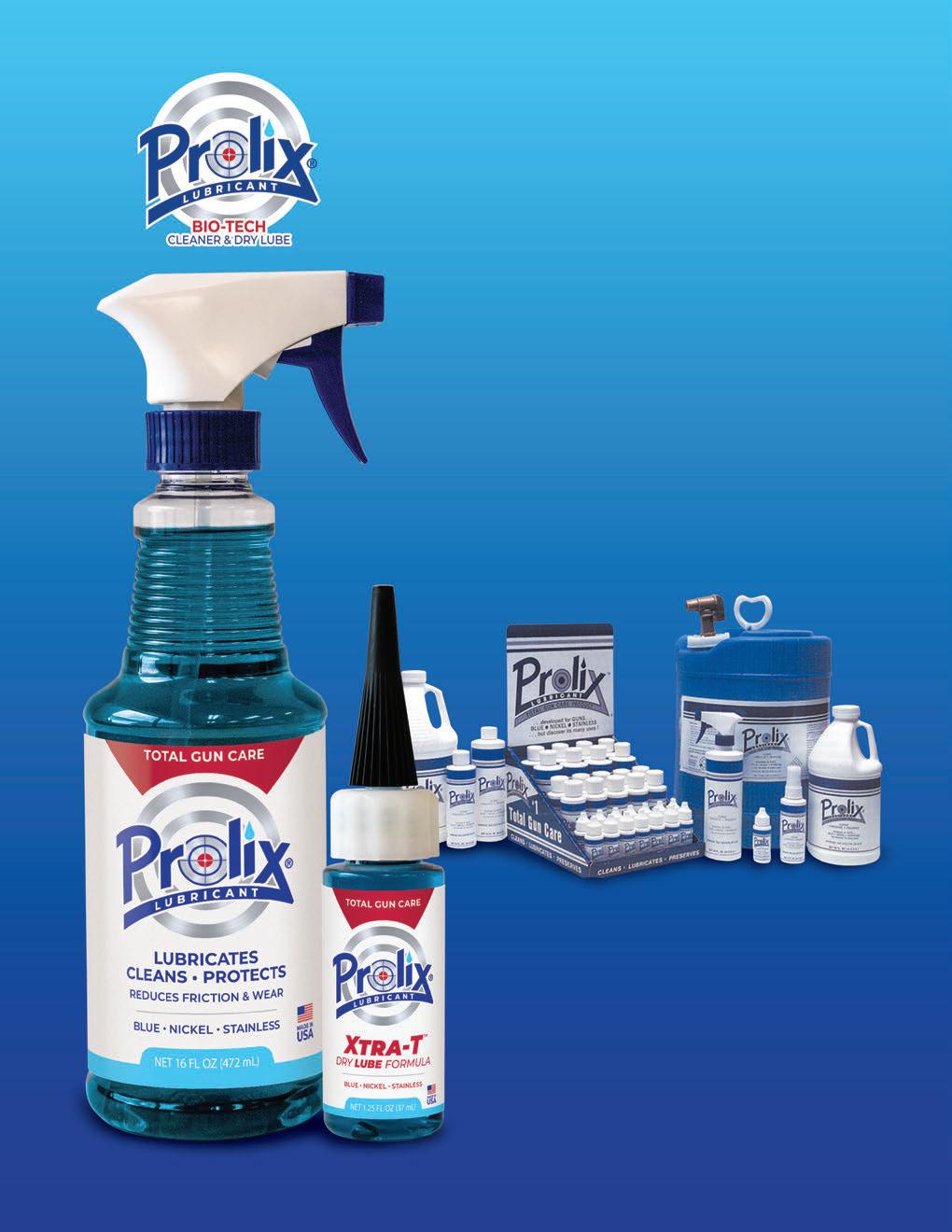

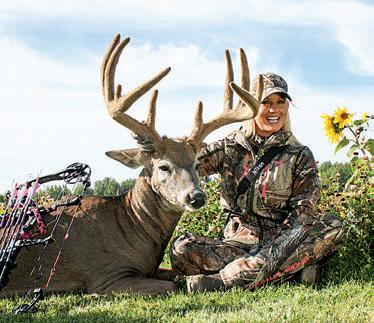
sagecanyonoutfitters.com
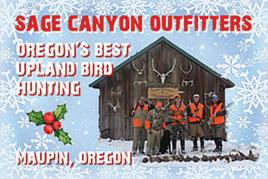
Great Christmas gift for the hunter or hunters in your life. Twenty mixed nonguided bird hunts with up to four guns – $700. Includes ranch access fees, a $800 value. Add a guide for $200.

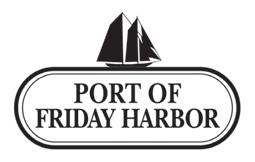
portfridayharbor.org
Is hooking a big fleshy fish your thing? Do you love pulling up bright red crabs? Do little pink shrimp float your boat?
Get a gift certificate for moorage for the fisher in your family and come catch something tasty today. Where Friday Begins

https://tinyurl.com/4wevpusk
This holiday season give Oregon Big Game Raffle entries. Each could be a hunt of a lifetime! There are 12 hunts to choose from for deer, elk, Rocky Mountain goat, prong horn, and bighorn sheep. All raffle hunt proceeds fund hunter access, habitat improvement, wildlife management, and research projects throughout Oregon!

exquisiteknives.com

Featuring the Steve Hoel Pearl Folder engraved by Steve Lindsay. This amazing piece of art is just one example of the variety of high-end custom knives offered by Dave Ellis, retired master bladesmith.
Exquisiteknives.com has been offering a very discriminating clientelle knives made by some of the most collectible makers, such as Bob Love less, Bill Moran, Ron Lake and Michael Walker.
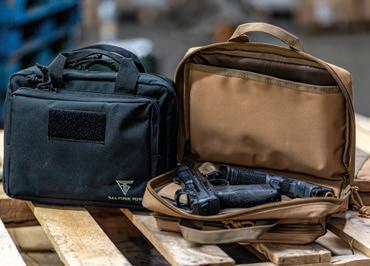
fullforgegear.com
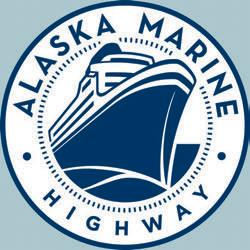
The CAT-2 Double Pistol case features a padded divider to separate the pistols and accessories. Its wrap-around zipper and lay-flat design allow for easy access. Also features a large external compartment with webbing for securing magazines and tools in the case. Available in tan and black.
ferryalaska.com
Ferry transportation provider to over 30 Alaska coastal communities. Walk or drive aboard to explore our 3,500mile route.



allwashingtonfishing.com Let our team guide you to your next Washington fishing charter!
Whether you’re fishing in Seattle, Westport or anywhere in between, you can expect the highest quality service, boats and equipment.
Bullard Leather uses premium Hermann Oak Leather to handcraft all their leather holsters, carry belts, wallets and knife sheaths. All products are handmade, and holsters are molded and boned to the gun for a snug, firm fit. Bullard Leather has an array of products, colors and exotic skins. Pictured is the Defender Holster for a Taurus Judge Magnum with .44, .45 and .410 bullet loops. Stop by Bullard Leather’s location in Cooper, Texas, or visit their online store.
The Advantage Plus dries and deodorizes all types of footwear in one to four hours. The Advantage Plus is fan assisted, dries two pairs of shoes at once and is compati ble with all Peet DryPorts. Assembled in the USA and comes with a five-year warranty.
OREGON
PORTLAND
Sportcraft Marina (503) 656-6484 sportcraftmarina.com
WASHINGTON
EVERETT
Performance Marine (425) 258-9292 perform-marine.com
MOUNT VERNON
Master Marine Boat Center, Inc. (360) 336-2176 mastermarine.com

SHELTON
Verle’s Sports Center (877) 426-0933 verles.com


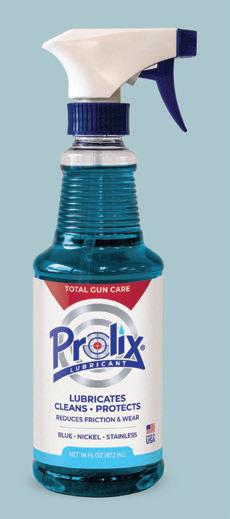
davistent.com/product/


Our sleeping bag cover is a great way to protect your sleeping bag and add a little warmth. You can even sleep under the stars on a starry night! Roll your sleeping bag, pillow and sleeping pad up and it’s a perfect bedroll to keep all your sleeping gear organized.
their website! Let
Even Santa would love to see a bottle of PrOlix in his stocking this holiday season! There is no product on the market to date that works like PrOlix; just see their ad in this publication and learn more over at their website! Let PrOlix make it a joyful holiday!

https://www.unitedcountrynw.com/search/ wa/land-for-sale-in-goldendale-washington -near-columbia-river/987711/ Acreage with views of Mt. Adams in Goldendale, Washington.
Wind up the scenic drive to your 15 acres that feature a seasonal creek and multiple build sites. The property has views of Mt. Adams, as well as territorial views. Town is 20 minutes away. From here you can easily get to amazing hunting, fishing, the Columbia River and more.



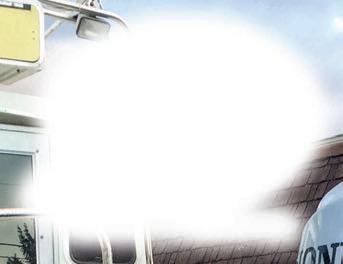











For those who love to fish and hunt, why not get them the gift that insures their equipment is covered just in case something happens to it? We have a personal articles policy that covers up to $10,000 for fishing and/or hunting gear, or $12,500 for firearms for only $6.25/month. A small price to ensure the happiness of any outdoorsman or outdoorswoman.
Give me a call at 253-770-6444 to discuss your options and also coverage for your home, life, auto and more.
proliterods.com
Featuring our Northwest Style Downrigger rod. A Canadian-style mooching rod designed for downrigger fishing in the Northwest.

shellshocktech.com

If you loved Shell Shock’s lightweight 9mm cases, try our .380 ACP cases. More calibers coming soon. Lighter than brass, more powder capacity, greater consistency between rounds, and can be picked up with a magnet. Reduces ammunition weight and increases performance. Made in the USA. Shell Shock…Shoot it, Love it!

idahofirearmsclasses.com
Give the gift of safety and peace of mind with an IFC gift card. If your loved ones travel, get them an Idaho Enhanced & Oregon Carry Class. Or include one of our training bundles. Individual classes are also available. We provide qualification classes and training for any level of experience, from beginner to experienced shooters, in our handgun/ rifle/shotgun classes.

EUGENE
Maxxum Marine (541) 686-3572 1700 State Highway 99 N www.maxxummarine.com




















KEVIN LARSON GUIDE SERVICE
fishingwithkevin.com

Give the gift of the outdoors for the hol idays! Offering salmon, sturgeon, steel head, halibut, bottomfish and Dungeness crab guided trips.
nomaralaska.com
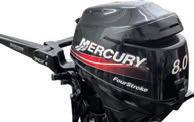

Looking for the right bag for your favorite gun? Nomar has a waterproof gun scabbard with padded protection for when you are flying out or boating to your great adventure off the beaten path.

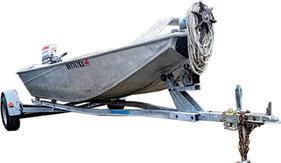
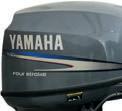

Their gun scabbard will hold a scoped rifle that is up to 47 inches long. Overall dimen sions are 15 by 57 inches. The top rolls down and cinches closed to protect your gun.



At only $135, it makes for a great gift for you or a friend. Made in Alaska.

A distinct region unto itself, this part of the Great Plains harbors unique landforms. Grand scenes composed of geologic wonder unfold here. Space, much of it undisturbed, is its greatest commodity and an unending sky delivers a feeling of no borders or confinement, where one can stretch and breathe. This is Montana’s Missouri River Country.

MARDON RESORT mardonresort.com
Gift certificate of your choice. Buy your family RV camping, cottage stays, a visit to our new lake houses, mini golf and Beach House Restaurant meals. You can choose the date based on availability.
















